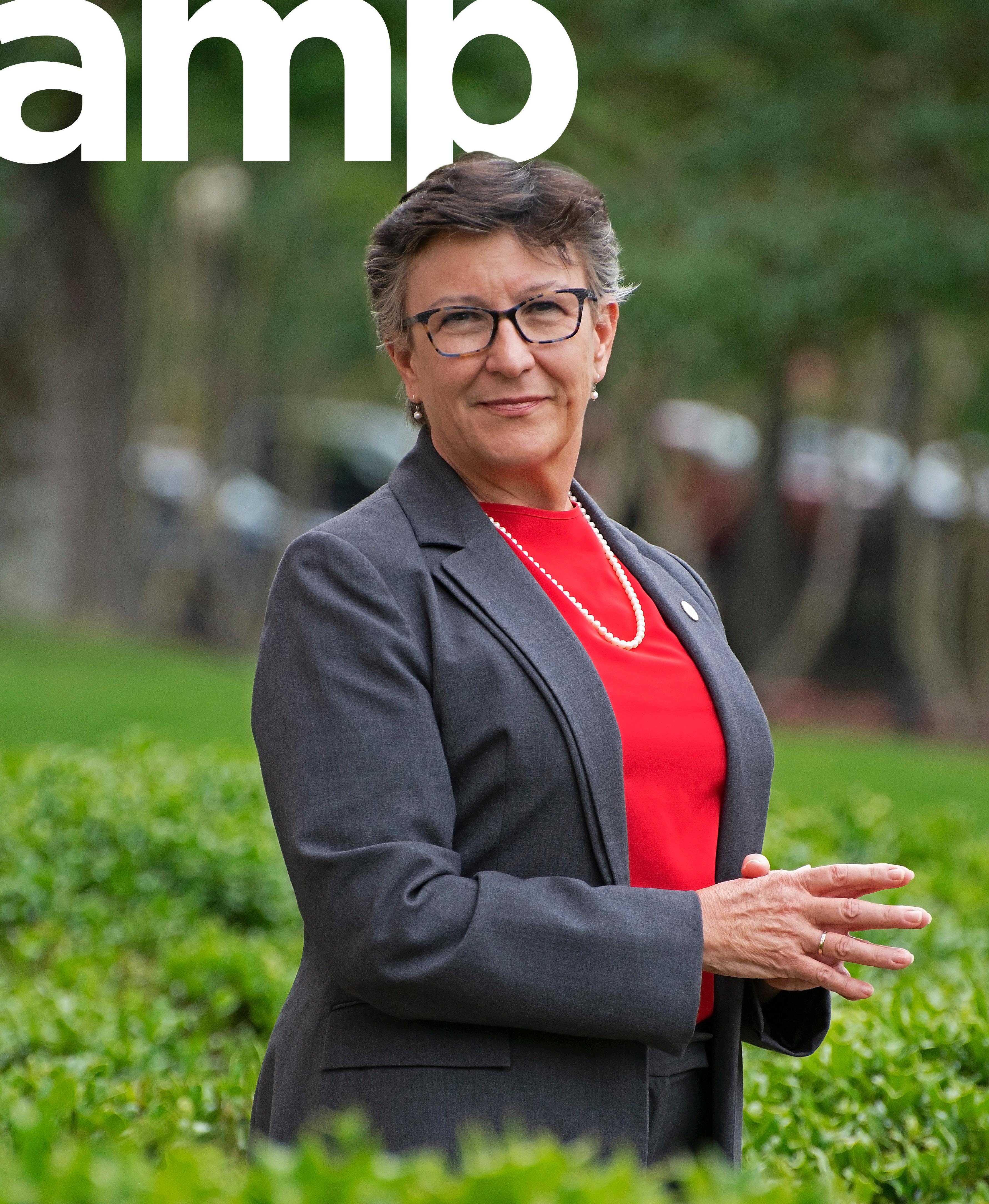




























As a rm built on relationships, our handshake matters. It means a warm greeting, the privilege of doing business together and knowing you can count on us. A handshake between two brothers, Witt and Jack Stephens, provided the foundation for a family-owned legacy that Jack’s son Warren upholds today. Under Warren’s leadership, Stephens continues to grow as one of America’s largest privately held independent nancial services rms, with of ces throughout the United States and in Europe. Our performance builds relationships with our clients, many of whom have become old friends. It’s why shaking hands with us means just a little bit more.

111 Center Street




Little Rock, AR 72201

(800) 643-9691










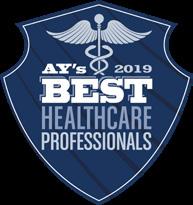






FEATURES JULY 2023
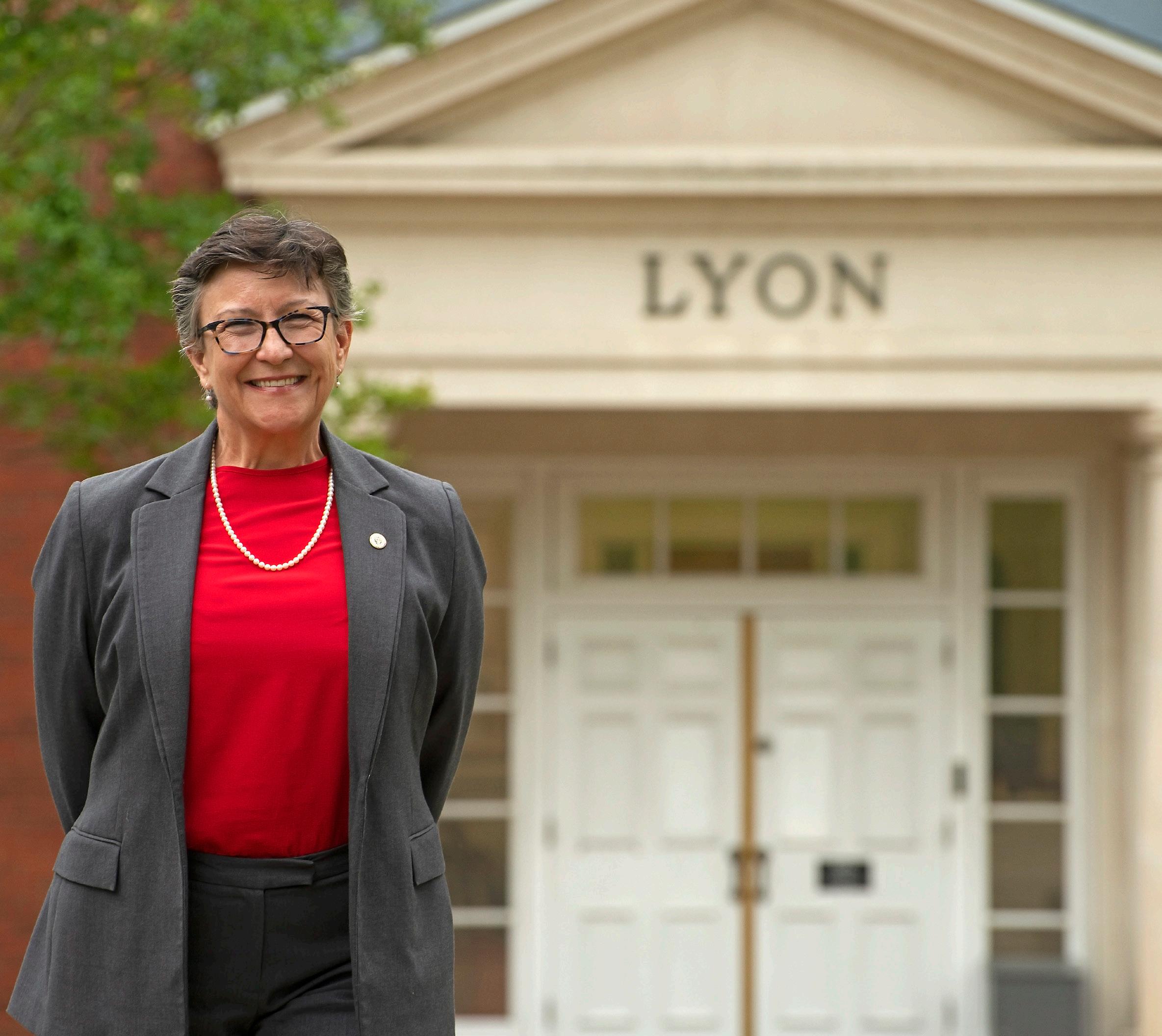


The future is in good hands, going by readers’ picks for the 2023 cohort of AMP’s Future 50. From banking to baseball, these up-andcomers are poised to be future leaders.
Jacob Oliva is the new secretary of education in Gov. Sarah Sanders’ cabinet, and the former teacher and administrator has a vision for helping students realize their potential.
When it comes to university growth, Fayetteville may get most of the headlines. But SAU has quietly been setting enrollment records down in the state’s southwest corner.
Don’t let the name fool you.
The Arkansas Research Alliance is as much about economic development as it is research, and its scientists are churning out commercial innovation.
Kyle Tabor found himself on a backpacking trip to Italy. And it looked a lot like Conway’s Blue Sail Coffee. Now, Tabor is building a budding adventure/conservation empire.

PRESIDENT & PUBLISHER
Heather Baker | hbaker@armoneyandpolitics.com
EDITOR-IN-CHIEF
Dwain Hebda | dwain@armoneyandpolitics.com
SENIOR EDITOR
Mark Carter | mcarter@armoneyandpolitics.com
ASSOCIATE EDITORS
Sarah Coleman | scoleman@armoneyandpolitics.com
Mak Millard | mmillard@armoneyandpolitics.com
EDITORIAL COORDINATOR
Darlene Hebda | darlene@armoneyandpolitics.com
STAFF WRITERS
John Callahan | jcallahan@armoneyandpolitics.com
Katie Zakrzewski | katie@armoneyandpolitics.com
MANAGING DIGITAL EDITOR
Kellie McAnulty | kmcanulty@armoneyandpolitics.com
ONLINE WRITER
Kilee Hall | khall@armoneyandpolitics.com
PRODUCTION MANAGER
Mike Bedgood | mbedgood@armoneyandpolitics.com
GRAPHIC DESIGNER
Lora Puls | lpuls@armoneyandpolitics.com
SENIOR ACCOUNT EXECUTIVE
Greg Churan | gchuran@armoneyandpolitics.com
ACCOUNT EXECUTIVES
Tonya Higginbotham | thigginbotham@armoneyandpolitics.com
Mary Funderburg | mary@armoneyandpolitics.com
Colleen Gillespie | colleen@armoneyandpolitics.com
Dana Rodriquez | dana@armoneyandpolitics.com
Jona Parker | jona@armoneyandpolitics.com
EXECUTIVE ASSISTANT
Jessica Everson | jeverson@armoneyandpolitics.com
ADVERTISING COORDINATOR
Bethany Yeager | ads@armoneyandpolitics.com
CIRCULATION
Ginger Roell | groell@armoneyandpolitics.com
ADMINISTRATION
billing@armoneyandpolitics.com

CEO | Vicki Vowell
TO ADVERTISE call 501-244-9700
email hbaker@ armoneyandpolitics.com
TO SUBSCRIBE | 501-244-9700
ADVISORY COMMITTEE
Susan Alturi, Scott Hamilton, Tommy Keet, Bobby Martin, Shannon Newton
CONTRIBUTORS
Angela Forsyth, Diane Gayeski, Becky Gillette, Jamie Lee, Nichole Singleton, Terrance Armstard, Bryan Barnhouse, Nathan Cunneen, Christopher Davis, DeWaine Duncan, Jeremy Harper, Kenneth Heard, Andrew Hutchinson, Ben Kutylo, Derek Oxford, Juan Rodriguez
Any accounting of Arkansas Visionaries wouldn’t be legit without Sissy Jones, who literally built a sparkling jewelry empire from an old, rundown log cabin in Pine Bluff.

The Razorbacks were well represented in the recent NBA draft, with Anthony Black and Nick Smith taken in the first round. The Pro Hogs brand appears stronger than ever.
AMP magazine is published monthly, Volume VI, Issue 3 AMP magazine (ISSN 2162-7754) is published monthly by AY Media Group, 910 W. Second St., Suite 200, Little Rock, AR 72201. Periodicals postage paid at Little Rock, AR, and additional mailing offices. Postmaster: Send address changes to AMP, 910 W. Second St., Suite 200, Little Rock, AR 72201. Subscription Inquiries: Subscription rate is $28 for one year (12 issues). Single issues are available upon request for $5. For subscriptions, inquiries or address changes, call 501-244- 9700. The contents of AMP are copyrighted, and material contained herein may not be copied or reproduced in any manner without the written permission of the publisher. Articles in AMP should not be considered specific advice, as individual circumstances vary. Products and services advertised in the magazine are not necessarily endorsed by AMP. Please recycle this magazine.


Page 16
WEST LITTLE ROCK DEVELOPMENT BRINGS HIGH-END MIXED-USE AREA
“I think it is a wonderful idea! WLR needs an upscale hotel in this area. A mix of retail and professional businesses with a boutique grocery will be a plus!”
Mike Casey

DEMOLITION OF SHORT-DENNEY HALL BEGINS AT UCA
“Lived in Short as a freshman.”
Diane Zook
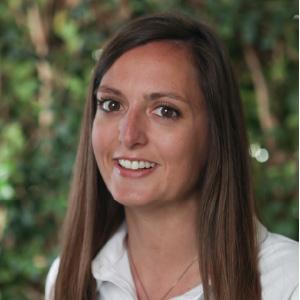
CORLISS WILLIAMSON JOINS MINNESOTA TIMBERWOLVES STAFF
“Good luck and welcome back to the NBA!”
Susan Johnson
June 7 – July 4
1 Transfusion: New Blood, New Life for Park Plaza?
2 Demolition Has Begun on Pier 1 for Chick-fil-A Expansion in Hot Springs
3 Spotlight on Small Business: K Hall & Sons Produce
4 West Little Rock Development Brings High-End Mixed-Use Area
5 Bridging a Divide: Little Rock’s Planned I-30 Deck Park Moving Slowly Forward
6 The 2 Towers: Iconic Building Makeovers A Key to Downtown LR’s Next Chapter
7 At Tyson Foods, the Future Is Now: Homegrown Protein Provider Bullish on Business Model
8 A ‘Premier Destination’: Southland Casino Hotel’s $320 Million Expansion Adds 500 Employees
9 Long-Time Family-Owned Business Announces Rebrand 10 Hostess Plant to Open in Arkadelphia This Year
Arkansas
The North Little Rock Chamber of Commerce was voted by AMP readers as the most admired chamber of commerce in the June issue. The wrong description accompanied the listing. The correct listing for the North Little Rock Chamber follows.

MOST ADMIRED COMPANIES: CHAMBER OF COMMERCE
NORTH LITTLE ROCK CHAMBER OF COMMERCE
The North Little Rock Chamber of Commerce serves its members by implementing programs and services that stimulate economic, community and workforce development in the city of North Little Rock. The chamber was originally formed in 1946 and in 1977 merged with the Little Rock Chamber to become the Little Rock/North Little Rock Chamber of Commerce. In 1984, the North Little Rock Chamber was re-established; today, it boasts more than 1,350 members. As the driving force for economic development and quality-of-life issues in Central Arkansas, the North Little Rock Chamber of Commerce has continued to be successful, remain financially sound and be a positive economic force in the community.
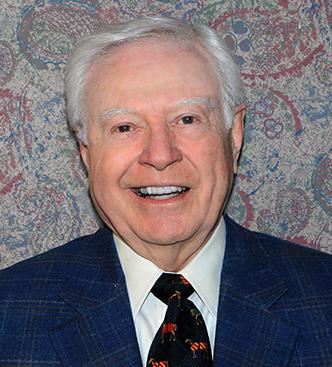
No news is good news, the idiom goes. That phrase certainly wasn’t coined by anyone in the publishing industry.
But I get the gist — if a lack of news suggests nothing good is happening, it stands to reason that nothing bad is going down. One could argue that a lack of bad news, in and of itself, is good news. (And yes, the same principle works the other way around.)
Since the world went fully digital a couple of decades ago, news permeates everything. With so much coming at us, and so fast, we’re struggling to identify which parts of the news are the important ones.
What some pop-culture automaton says on the red carpet technically may qualify as news, but the Chinese government’s latest island-building endeavor in the South China Sea? That’s news. News that may very well one day pull the red carpet out from under all the automatons.
Therefore, it was disconcerting to
It seems crazy that summer is halfway done, and in a matter of weeks, schools will be opening and footballs will be flying through the air.
But we still have a good month before the process of transitioning to fall must begin, and July in Arkansas — if you can stand the heat — is a good place to be. Fourth of July on the lake, backyard barbecues with family and friends, those glorious extended hours of twilight …
For AMP, July also means a look into the state’s future. Precisely, a look at the next generation of business leaders. AMP’s Future 50 represents those young differencemakers who are poised to become big — or bigger — names in Arkansas business circles. Nominated by readers, the members of AMP’s Future 50 represent a broad array of industry — entrepreneurs, restaurateurs, bankers, musicians, you name it.
We’re proud to showcase them inside. This July issue carries an education focus, and readers can learn more about Lyon
learn, courtesy of Bethany Mandel in the July issue of the world edition of The Spectator, that American students are faring worse than ever.
I hesitate to say getting dumber, because my attempted navigation of a TV screen full of streaming services represents high comedy in our house. But our young are becoming much “less informed” about many of the things that matter. That American kids were already behind in math and science is old news, for sure, but now they’re becoming less interested in history and civics. And that, folks, is news that should concern all of us.
(Inside the July issue issue of AMP, we visit with Arkansans who have made it their mission to reverse the state’s own falling test scores.)
Ms. Mandel opines on U.S. eighth graders’ record low scores in history and civics, as originally reported by The New York Times. Last year, roughly 40 percent of them scored “below basic” in U.S. history, up from 34 percent in 2018

and 29 percent in 2014.
Just 13 percent were considered “proficient,” per the National Assessment of Educational Progress (NAEPO), which sets basic standards for student achievement. That’s down 5 percentage points from 2013.
These numbers represent a very bad trend. Or should, anyway. But the numbers themselves, and the fact that few seem alarmed by them …now, that’s news. And not the good kind.
By Heather BakerCollege’s plan to open dental and veterinary schools — the state’s first — in the old Heifer International headquarters just off the River Market in downtown Little Rock. Dwain Hebda visits with Lyon President Melissa Taverner about what these plans mean for the school, the state and downtown Little Rock.
Also inside, we’ll talk to Jacob Oliva, Gov. Sarah Sanders’ new Secretary of Education, as well as Harding University President Michael Williams, and look at the record growth taking place at Southern Arkansas University in Magnolia.
And we think you’ll enjoy Becky Gillette’s look into Arkansas’ quirky laws related to liquor sales. (Quirky is an understatement.)
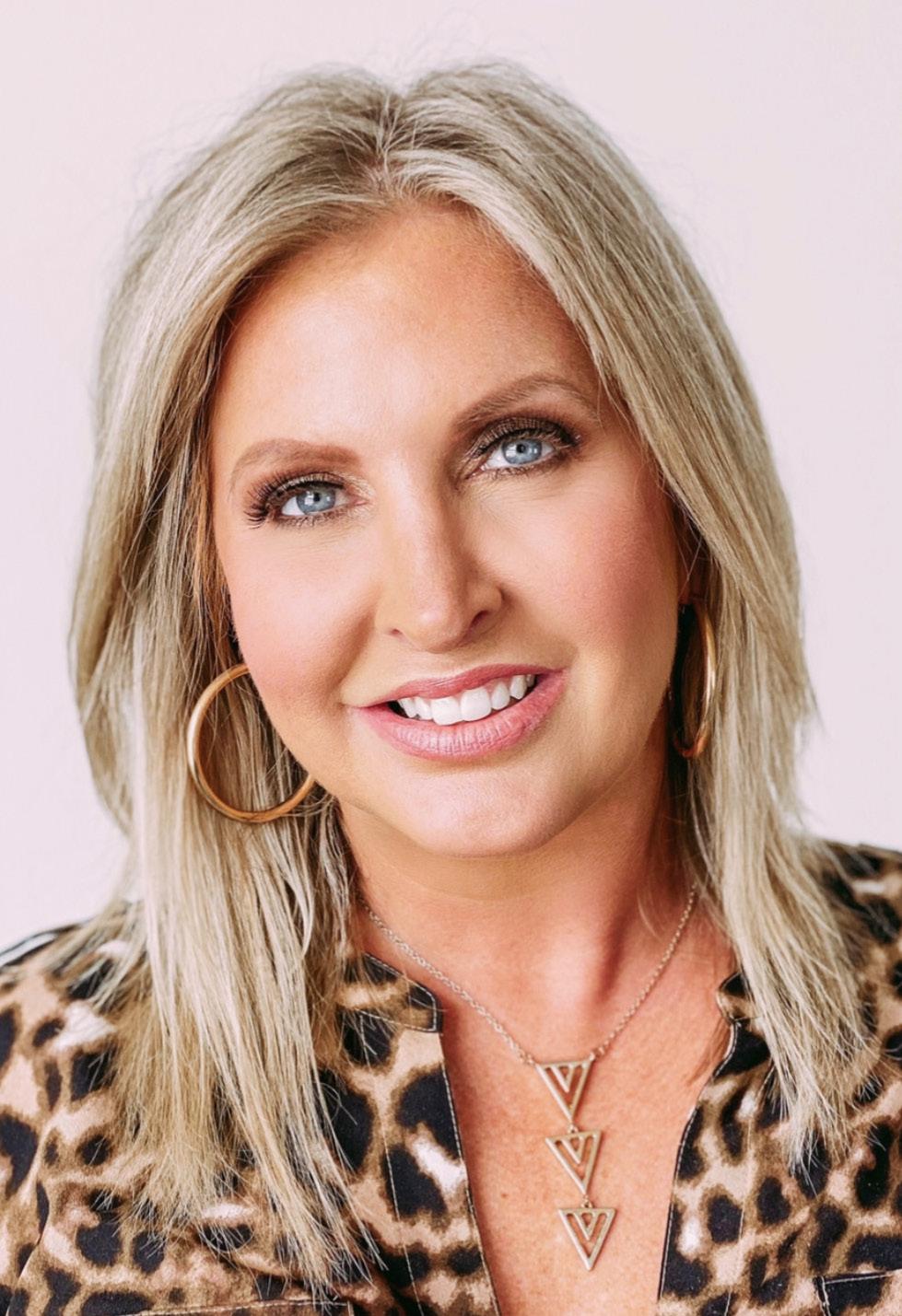
As always, thanks for reading. Enjoy this issue and enjoy your summer. Take advantage of all the outdoor recreation opportunities Arkansas to offer.
Hit me up with any comments or story ideas — HBaker@ARMoneyandPolitics. com.
 By Nathan Cunneen
By Nathan Cunneen
Robust school choice has arrived in Arkansas. The March passage of the LEARNS Act created the Arkansas Children’s Education Freedom Account Program, which will provide education savings accounts (ESA) to families who wish to customize their child’s education. Starting in 2024, parents can use ESAs for tuition at a nonpublic school or for tutoring, curriculum, testing, uniforms, exam fees, technology or transportation.
This is a huge victory for parents and students, but the inclusion of school choice in the LEARNS Act sparked controversy. Legislative fights over school choice create an apparent collision between the status quo and putting students first. Yet school choice, in practice, does not follow the us-versus-them paradigm so often portrayed by the media. Education freedom offers compelling benefits to everyone in Arkansas.
Prior to LEARNS, Arkansas provided private school vouchers to students in foster care, students with disabilities and children of active-duty or reserve members of the U.S. military. In 2021, the legislature created another tax-credit scholarship program specifically serving low-income students. But Gov. Sarah Sanders and legislative leaders made it clear that education freedom should not be limited to a select few. Through the LEARNS Act, options become available to every student in Arkansas. Here’s why that’s a good thing.
The theory behind school choice contains two primary components. First, children are individuals who require education through diverse methods, and parents are best equipped to ascertain their individual child’s needs. If one thing is clear from the history of U.S. education, it’s that a one-size-fits-all education system cannot serve every student.
However, education reformers and advocates recognize that diverse education options remain out of reach for many fami-
lies, especially low-income families. In the United States, a student is assigned to a public school based on where they live. For some students, that school is perfectly acceptable to their needs, but that’s not the case for all families. If they want to attend a different school, families can choose to move to a better school district or pay out of pocket for private or alternative schools. That’s something that affluent families do all the time but largely remains out of reach for low-income families.
Enter school choice. By tying education dollars to students, school choice programs help provide opportunities to the families who need them most. Every family is provided financial tools to seek out alternative education providers — if they want to. Arkansas’ program has a targeted eligibility component, meaning that students in foster care, students with disabilities and the children of active-duty or reserve members of the U.S. military get access first. By 2025, every Arkansas student will be eligible.
Empirical evidence clearly shows the benefits of this. Majorities of academic studies show positive effects of school choice on student test scores and educational attainment. School choice has been shown to increase students’ chances of graduating high school and continuing to college. A student using the Florida Tax-Credit Scholarship, which I myself received, for more than four years is 99 percent more likely to attend college. The LEARNS Act is attempting to bring those benefits to Arkansas students.
Furthermore, school choice also has the ancillary effect of incentivizing competition within the education system. Without accessible alternatives for families, public schools have no incentive to improve. In the last 50 years, inflation-adjusted, per-pupil public education funding has
increased by more than 140 percent, yet achievement remains relatively stagnant. Comparatively, 25 academic studies show that when school choice is introduced, the students who remain in public schools improve as well, resulting from the competitive effect on schools.
Critics of the program have argued that school choice will “take money from” or “destroy” public schools. The evidence shows the opposite — public schools get better when students have a choice. But more fundamentally, the goal should not be to preserve any system of schools; the goal is to educate students and set them up for successful lives. The rhetoric that school choice opponents use betrays their intention to preserve the status quo and support a monopolistic system, regardless of whether those schools actually are serving students.
The educational and competitive benefits shown by school choice programs are essential, but ultimately the draw of school choice is that it puts control back in the hands of families, so that they don’t have to hope and pray they live in the right ZIP code.
Through the LEARNS Act, Gov. Sanders has given that control back to families and created powerful opportunities for students. Don’t listen to the naysayers; school choice in Arkansas will give families more options and help to improve the existing system.
What is the slope of the line represented by the equation 10 x + 2 x = y + 6?
a) 10
b) 12
c) 14
d) 15
e) 16
Does this bring back nightmares of taking the ACT or SAT test? Scores on them have been the ticket to getting into college for more than a century. But recently, more than 80 percent of U.S. colleges have made submitting them optional, and some have even eliminated them entirely.
We’re hearing a lot about the shortcomings of the U.S. public educational system. Too often, students are neither prepared for college courses nor the “real world.” Understanding the history of standardized testing may help us invent a system that’s more powerful to meet today’s challenges and to appropriately select a diverse pool of students who will excel in college and beyond.
Standardized tests were developed by the College Board in 1901. This organization was made up of the presidents of the 12 most elite American universities to encourage a standard curriculum for prep schools and to have a consistent way for admissions officers to decide who gets in. These first “College Boards” all were essay-based and included items like illustrating various uses of the dative case in Latin sentences. If you’re rolling your eyes at that, think back to the rather arcane trigonometry questions you crammed for, and ask yourself how often you use that knowledge.
For decades, the supposition was that these tests measured raw “brain power,” regardless of where you went to school or whether your teachers were particularly tough graders. So, they leveled the playing field. They also represented a simple way for admissions officers to sort through thousands of applications. While many people are skeptical of tests as a measure of one’s fit for higher education, a recent survey by Intelligent.com revealed that about 25 percent of Americans over age 18 would support the way that China does it: one test given over multiple days. It is the only metric used to decide which college — if any — an applicant may attend.
However, both the original purpose and the actual outcomes are quite contrary to the lofty goal of equal access. Carl Brigham, who developed the first College Boards, wrote that America’s standard of education was declining “and will proceed with an accelerating rate as the racial mixture becomes more and more extensive,” signaling that he felt the tests would be a way to screen out nonwhite students.
Standardized tests don’t measure intelligence — they measure whether you remember the content on which you were drilled. Actually, they are best at selecting students who have attended expensive preparatory schools or have had extracurricular tutoring on the specific topics and questioning styles of the exams.
Scores on tests are actually a poor predictor of success in college. Tests that cover math, science and English have no correlation to a student’s ability to excel as a photography or acting major. And we’ve seen that even students who hate math and science in high school can perform quite well in those subjects in college when the concepts are presented in ways that apply to their own interests — like the Physics of Sound, which is a popular class for music and media majors at my college.
Over the past 45 years as a professor and 11 as a dean, I’ve met thousands of applicants. The best predictor of success was whether a student’s eyes lit up when they walked through a TV studio or film set, or if they jumped into the conversation while sitting in on a class discussing media theories and issues. Not surprisingly, what students chose to do in high school was also a great predictor — if they liked getting involved in plays and planning events, they were likely to enjoy courses in media and PR. Because so many subjects and majors in college are not taught in high school, individual high grades alone don’t matter. But attendance, overall GPA and other measures of persistence do signal the kind of motivation that’s needed to succeed.
The Physician Assistant Program at Ithaca College is one example of using of a more contemporary and holistic way to approach
the admission process. Linda Petrosino, Ph.D., the dean of the School of Health Sciences and Human Performance at Ithaca, says: “Rather than relying solely on quantifiable metrics, we use a mission-aligned admissions process that looks at the whole individual, considering life experiences and a diversity of attributes, because we know this provides wider access and increases diversity of our learners. We value diversity in its broadest sense, and no single attribute is used for acceptance.
“Important experiences may include community services, military-Peace Corps, fire/ police service, health care experiences and overall life experiences. Important attributes may be strong interpersonal skills, evidence of cultural sensitivity to others’ points of view, socioeconomic backgrounds, evidence of knowledge of our program mission and their aspirational alignment and having lived and worked in geographically underserved areas. This admissions process has been wildly successful, and to date, we have attracted our initial two cohorts of 70 learners (55 identified as female and 15 identified as male) with roughly 52 percent identifying as white and the rest of the cohort being represented by 17.9 percent Asian; 15.9 percent Black or African American; 10.4 percent Hispanic; 1.5 percent Native Hawaiian; and the remaining 2.5 percent not reporting.”
In our era of Google searches and artificial intelligence-based tools, memorizing arcane facts and formulas is not relevant to pursuing college or to most careers. Our collective challenge now is to reinvent both higher education and the ways in which we decide who gets the ticket to ride.
Diane Gayeski, Ph.D. is internationally recognized as a futurist in communication and learning. She is Professor of Strategic Communication and the former dean at the Roy H. Park School of Communications at Ithaca College in Ithaca, N.Y., and provides consulting and professional development workshops and keynotes through Gayeski Analytics.
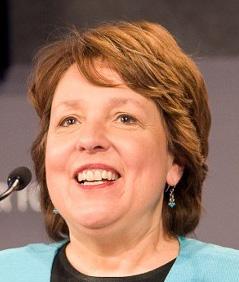
Based on mounting research, it is generally accepted in education that teachers are the single most significant determinant of student achievement in schools. Good teachers are foundational to improving outcomes for every student. However, Arkansas is currently facing severe challenges within our educator workforce.
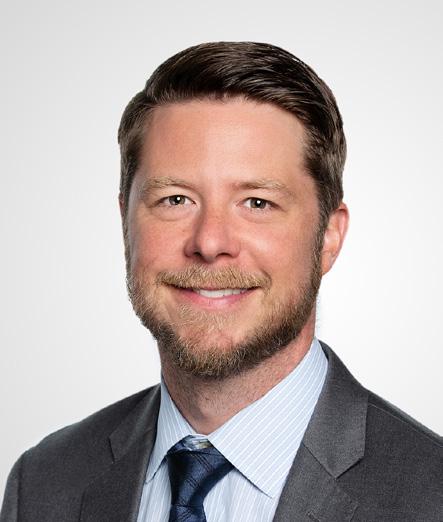
Statewide, almost 9 percent of teachers are unlicensed. The shortage of qualified teachers disproportionately affects southern and eastern Arkansas, where, in some communities, more than 40 percent of teachers are unlicensed. The attrition rate is around 25 percent, with higher rates for African American teachers, teachers in high-poverty schools and novice teachers. And we continue to see teacher shortage areas in STEMrelated fields. Overall, we produce fewer teachers than those leaving the classroom each year.
In recent years, significant groundwork has been laid in the state to address these challenges and improve the educator workforce. Parts of the recently enacted LEARNS Act focus on this issue, including a significant increase in the minimum teacher annual salary to $50,000.
One of Forward Arkansas’ core priorities is dramatically improving our educator talent so that every student has access to highquality teachers and principals. While we are encouraged by current efforts, we still have a long way to go, and we must maintain focus on the urgent need. To accelerate progress, we must reimagine how we approach change in education to achieve different results.
With this in mind, in 2021, we identified an opportunity for system-wide impact in the teacher pipeline. Arkansas’ universitybased educator preparation programs are by far the largest producer of new teachers each year. Eighty-eight percent — 61 percent from the traditional route and 27 percent from alternative routes — of teachers working in Arkansas each year are pre-
pared through university programs. While they are the most significant part of the teacher pipeline, only about 30 percent of initial education majors graduate with a degree and teaching license within six years. By transforming even a subset of these programs to source and recruit more high-quality candidates and provide a more rigorous, job-based experience to them, we believed we could have a major impact on teacher effectiveness statewide.
Next, we designed a new approach to address this persistent challenge. We launched the Educator Preparation Program (EPP) Design Collaborative, a first-of-its-kind initiative to improve how universities recruit and prepare teachers.
With 19 university educator preparation programs in Arkansas, we had to identify those truly ready to take on the hard work of transforming their programs. We engaged the leadership teams at every university to communicate expectations, the opportunity to receive both financial resources and technical support and to invite all to apply. We were surprised and thrilled by the response — 16 of the 19 university programs applied. We had initially planned for six universities to participate, but because of the demand, we accepted a diverse group of eight universities from across the state.
Though these eight university leadership teams were excited about the opportunity, they had limited time and capacity to take on initiatives of this scale. To address this, we created a year-long supported program for participating teams. They were paired with expert partners to add capacity and provide technical assistance. These partners guided them through a structured process, culminating in each program developing a detailed vision and plan to fundamentally reallocate resources and redesign the preparation experience for potential teachers.
Ultimately, we were able to select two
programs for “transformation awards.” The University of Arkansas at Little Rock and Southern Arkansas University rose to the top. Each received direct financial resources aligned with their plans and three years of continued implementation support.
The initiative didn’t end there. Because of the momentum and energy created, largely by the EPP teams, we continued the Design Collaborative for all eight that participated. Their teams continue to meet regularly and receive support to implement parts of the plans they developed and share what they are learning.
There is still much work to be done to achieve an impact for teachers and students, but the early results have far exceeded our expectations. In just two years, we have engaged the entire field of university teacher preparation in a major change initiative.
Through the Design Collaborative, we also developed and demonstrated an innovative model for partnership between philanthropy, external nonprofits and state agencies. To achieve the outcomes we want for all Arkansas students, we believe more efforts to align key system stakeholders around innovative approaches to address complex education challenges will be essential.
Forward Arkansas is an independent education organization uniquely positioned at the intersection of policy and practice. Join us in our efforts as we collaborate to advance progress in Arkansas education. Learn more at ForwardArkansas.org.
Back in the third grade was the first time I can remember thinking about what I wanted to be when I grew up. At the impressionable age of 10, I wanted to be an architect. My mother wanted me to be a priest. Neither worked out, which was best for everybody. My path led to economic development, which is kind of like being a bit of both an architect and a priest.
Economic development is a well-intended and well-established profession. It offers a variety of positive ways to influence the growth of an area and the future of its residents. Arkansas’ elected and business leaders agree that university research is one such path. Since 2009, the Arkansas Research Alliance (ARA) has united the state’s focus on recruiting and retaining top minds in key scientific disciplines and specialized fields of engineering.
That focus has paid dividends. ARA-supported research leaders have generated $206 million in research funding. Their research and startup activities have directly employed 346 Arkansans. The jobs and incomes are high-quality and family-sustaining, with employees earning, on average, just over $80,000 in total annual compensation.
These efforts generated more than $1.31 billion in total economic impact within the state. This economic activity has yielded state tax revenue of $26.1 million, including $4.4 million in fiscal year 2023. This amounts to a better than three-to-one return on investments of the state funding to date — for every $1 of state investment in ARA research leaders, Arkansas has received $3.13 in tax revenues.
Numbers tell one side of the story. ARA’s soon-to-be released performance report will go further behind-the-scenes on the price tag for this strong ROI. It will be posted on our website (aralliance.org) later this summer. For the past two years, this column, “Discovery Economics,” has shared real-world stories of ARA-supported research leaders and their impact on our state’s economic advancement. For the latest of these, check out Jeremy Harper’s piece also in this issue on page 44.
All of these examples can find their origins in a groundbreaking, independent assessment from 2009. It provided insights on opportunities for advancing job-creating research (literally, the last five words of that sentence made up the study title). That playbook has been a workhorse guiding ARA and partner investments that led to such a healthy economic return.
But, that study was 15 years ago. ARA believes university research aligned with industry need can generate an even stronger ROI. We know the scientific and engineering specialties supported by ARA and its partners influence industry verticals and markets. Imagine the possibilities if we took a fresh look at the two sides of this economic coin — university research on one side and industry on the other.
That is exactly the direction Arkansas is headed: strategic
investments in the research where Arkansas is a leader and the private sector has potential to grow. Advanced industries have a “market pull” of innovation needs. Universities and government labs “push technology” based on their competencies and assets (e.g. human and intellectual capital). Marry these to form a line of sight to job creation opportunities and we position the state for growth in targeted sectors. This alignment “expands the strike zone” and hits the sweet spot to open the Arkansas economy even further. Specialties in this area of overlap will be known as the state’s core research focus areas.
This modernization depends on a really clear understanding of trends in Arkansas industry. Economic development nerds like myself use a variety of tools to paint that forecast (e.g. location quotients will not get you invited back to a party). But they are good for quantifying what these industries have in common. They are technology-based, innovation-driven clusters, or niches, that represent existing strengths or emerging areas of opportunity. They are connected by supply chains or shared knowledge. Also, they are skilled, export-oriented areas that drive wealth generation.
It is not just industry. Universities and federal labs must pull their weight, too. Their research talent must be translational in nature. That is, they must be inclined toward, incentivized by, and connected to opportunities for in-state collaboration, industry engagement and commercial applications.
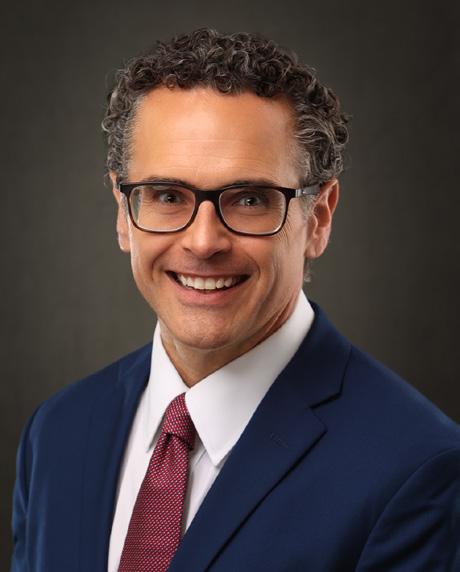
For this to work, investments in the state’s research enterprise are best paired with a healthy ecosystem. The research experts must have access to Arkansas-based industry R&D funding, strong technology transfer and licensing services, a diverse network entrepreneurial support resources, higher levels of venture capital activity and business mentorship. Linking these partners together in a high-functioning system can take the state ROI to stratospheric levels.
Scientific discoveries and engineering advancements aligned with the growth of the state’s advanced industries are spark plugs for innovation-based economic development. Our collective investments into these focus areas will act as a magnet for talent, open new areas of research for the Arkansas economy and materially grow the economic development pie for the whole state”




Plato is credited with the following quote: “The direction in which education starts a man will determine his future life.”
Education is at the forefront of society, and it plays an integral role in business. It comes in many forms and isn’t confined to the classroom or campus, though both represent important destinations on any path to knowledge.
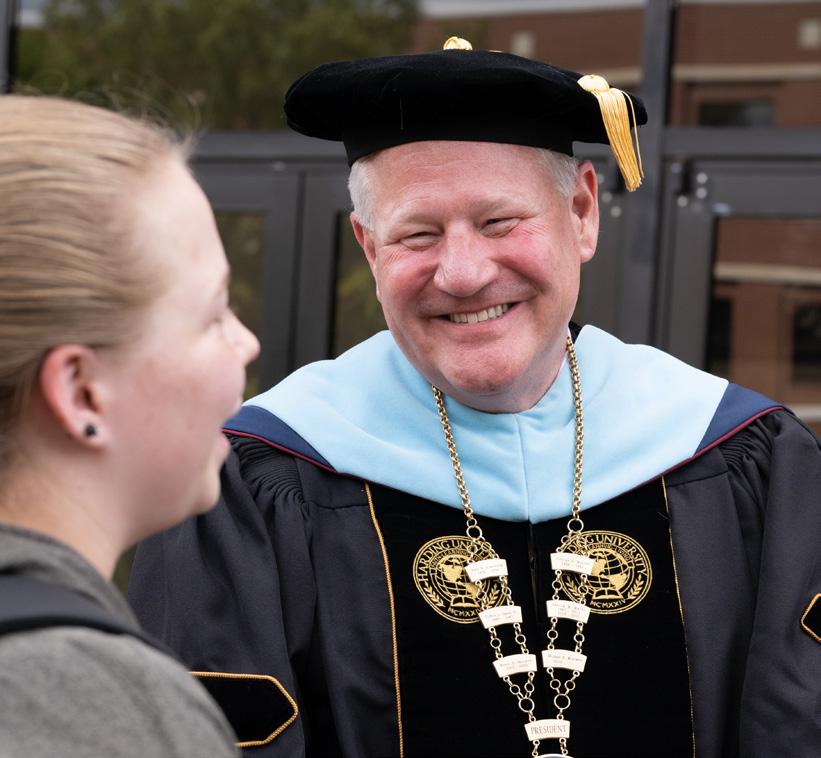
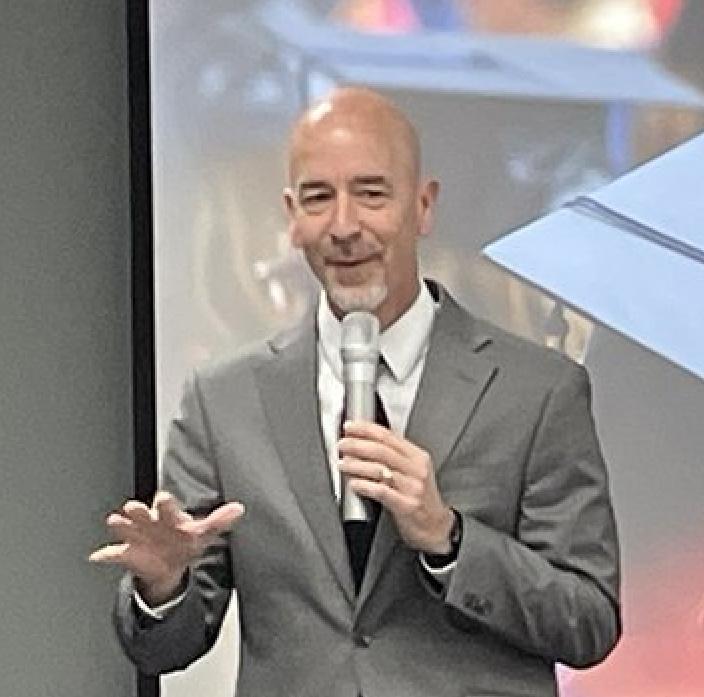
In this July issue, AMP will look at education’s impact on Arkansas. After all, like Benjamin Franklin said, “If a man empties his purse into his head, no man can take it away from him. An investment in knowledge always pays the best interest.”



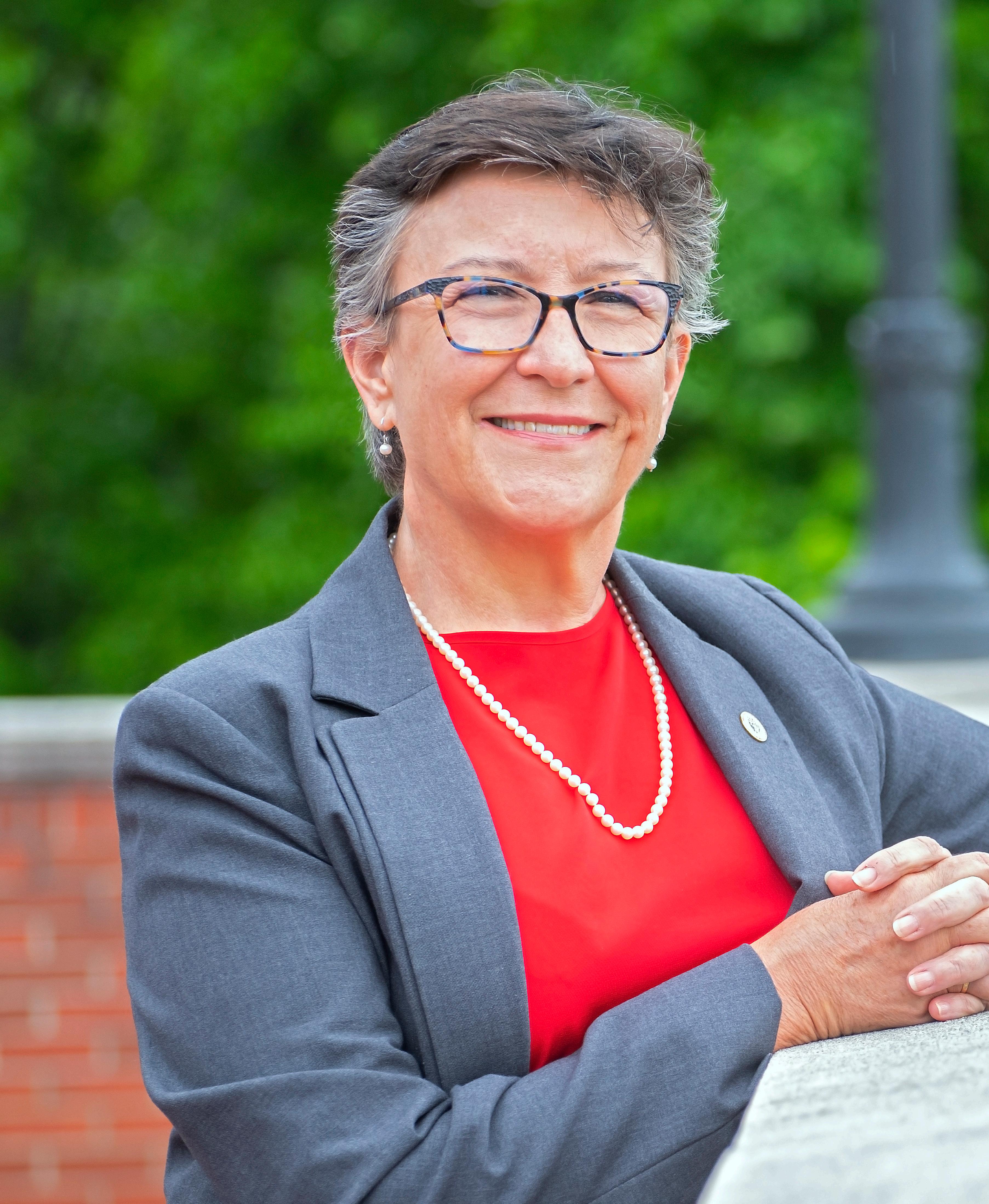
 By Dwain Hebda
By Dwain Hebda
With its bucolic rolling grounds studded with stately buildings amid sprawling mature trees, Lyon College is a picture postcard of a campus. Founded in 1872, the liberal arts school provides the perfect setting for the college experience, be it educational discourse or the quaint Scottish traditions that are its legacy.
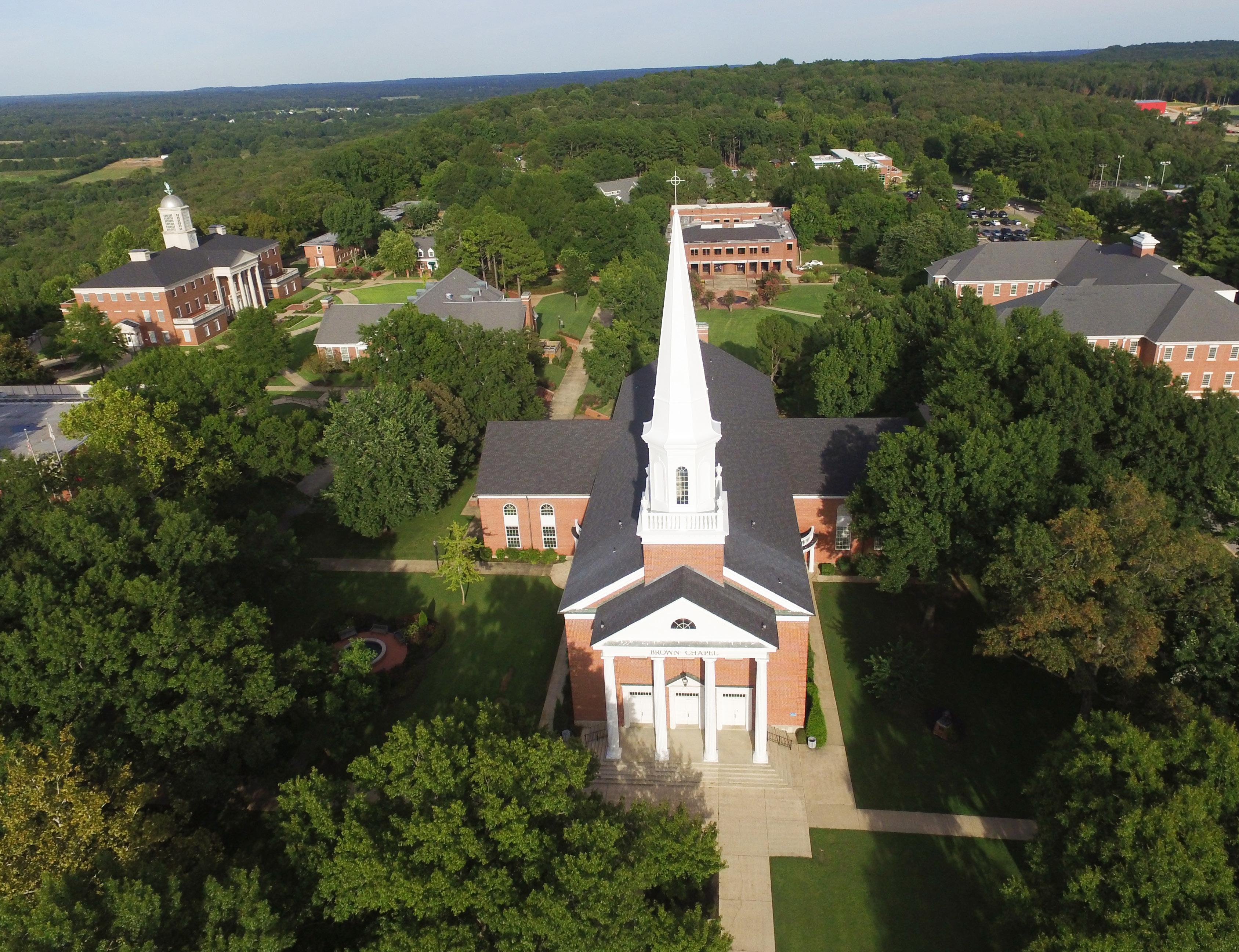
But for all that it offers, there are things Lyon
doesn’t feel like, such as being the kind of place that would, in the space of just a few years, represent a hotbed of controversy or lead a revolution in higher education in Arkansas. Yet not only has that been the case here, but it has also bookended the tenure of Dr. Melissa Taverner. In addition to serving the school as provost and dean of faculty, pushing innovation, creativity and engagement in the classroom, the longtime educator helped shepherd the campus through a generational pandemic and stepped forward to lead in the face of multiple challenges.
The result: a well-honed set of leadership skills tempered through challenging times and a clear vision for the future in her
role as the school’s president.
“I lead to serve,” she said. “I serve the institution, I serve the faculty and staff, but most importantly, I serve the students. I want things to work and to work for them because college is a life-changing moment. I want the focus to be on their experiences and the people who help these students grow during their time here.”
Taverner, who in February 2022 became the 19th president of the college and the first female in that permanent role, took over a campus in tumult as interim president in August 2021. Her predecessor, Dr. W. Joseph King, had hastily resigned amid a firestorm of criticism for disparaging remarks he made about the community in a piece for The Chronicle of Higher Education.
In it, King alleged the college had to deal with active KKK chapters in the area and described the school as a bubble surrounded by an “angry, disenfranchised” city with “a large white-supremacist population.” Reaction to the remarks was swift and outraged, and community tempers still ran high when Taverner took over, just a month after the article appeared.
“It was a thing, man,” she said of the chain of events. “The circumstances began in the summer and frankly, in the summer, I’m getting ready for the fall semester. So, I only heard about what’s going on about a week before things fell apart. But it quickly became clear there would be an immediate leadership change, and I said I would take that on. By about day two, it was like, ‘OK, that happened. Now, what are we going to do? What’s next?’”
Taverner’s leadership in that period was tested on several fronts. Not only were many in the community still up in arms over the remarks, but the campus had only recently started to settle into more familiar routines following COVID restrictions. Plus, Lyon was in the teeth of its reaccreditation cycle, which meant it was hardly business as usual. Taverner worked daily to compartmentalize the challenges as best she knew how.
“It was one of those things that was, I’m not going to say seamless, or we just flipped the switch and it’s fine,” she said. “It took a minute, actually it took a lot more than a minute; it took months for me to get my head around perspective again. I was very, very fortunate to have good people around me to say, ‘We’re not going to stop, we’re not going to change the things that are important to us. We’re going to continue and make things better.’
“I think the thing that really solidified for me was the thing for which I had already begun to be known in the provost role: transparency. I am a terrible poker player. You can look at my face and know exactly what I think, and let me tell you, I was always very honest with people, saying, ‘Here are the challenges, here’s what needs to change.’ The fence-mending continues to this day, and I
take that very seriously because an institution does not live in a vacuum, it lives in a community. In order to be successful you need to have partners in that community in order to do things together for the greater good of everybody.”
Being born into a line of educators, Taverner always knew academics was going to play a major role in her professional life. But the Virginia native didn’t always know that it would lead her to the classroom, especially early on.
“I come from a family of elementary school teachers, and they were some of the most gifted natural educators I’ve ever seen in my life,” she said. “I would watch my mother teach, and I’d say, ‘How did you know how to do that?’ She said, ‘Well, you just know.’
“I always was aware of education as a career option, but I hadn’t really thought about it seriously. I discovered biology when I was 12 years old, and that was it, I just loved biology. I loved to understand complex systems. I loved cells and microorganisms, those sorts of things.”
Taverner majored in biology in college, earning her undergraduate degree from Randolph-Macon Women’s College, now Randolph College, a private liberal arts and sciences institution in Lynchburg, Va. She kicked around the idea of medical school or the health care industry, but neither appealed to her, instead completing her Master of Science degree from the University of Reading in England.
Returning home, she completed her doctorate in environmental science from the University of Vir-
“We started looking for the holes and there are two huge ones in Arkansas as far as graduate education — a school of dentistry and a school of veterinary medicine.”
ginia where, just three years into a tenure-track position, she was made department chair. It was the first of a series of promotions that intensified her love for teaching and brought the many working cogs of an education ecosystem into sharper focus.
“I think about that part of my career trajectory as very much a ladder — not about climbing a career ladder but more about a ladder of perspective,” she said. “The higher you go up on the ladder, the more you see how the puzzle pieces have to fit. And I’m a systems thinker anyway; I like complex systems, and boy howdy, a college is a pretty complex system.
“I worked with great people who helped me think through what we are trying to accomplish — does it fit, how can we do it, then how do we do it better? It was a gradual mindset change; I became a biologist because I loved biology, I became a teacher because I love sharing the things I love. The rest just kind of came along.”
Taverner would make a dramatic change from a large university to the much smaller confines of Emory & Henry College, a liberal arts institution located in Emory, Va. Over 22 years with the school, she served as associate professor of biology, chair of the Division of Natural Sciences, director of assessment and chair of the Department of Biology. From 2016 to 2017, she served as interim vice president for academic affairs and dean of the college, right after which she joined the Lyon College administration.
She said she favors the small-college environment for the contact it affords her with fellow professors and students alike, a relationship that enhances the college experience.
“Large universities have a very different mission,” she said. “Yes, they are there to educate and to discover, but by the simple fact that you may have 500 students in an undergraduate biology class, you’re not going to establish that close type of relationship. [At Lyon,] we can have the hard conversations, we can have the deep conversations that help you move toward another level of understanding. That is what I really value.
“I have always been able to cultivate the kind of
relationship with my students where, yes, I understand there is a power structure and, yes, I understand I have your grade in my hands. But that is not what this is about; this is about you discovering who you are, what’s important to you and what it is that you need to do in your life.”
Taverner’s tenure as provost and dean of faculty can best be described as innovative, as she looked for ways to connect the college’s curriculum and degree offerings with what was going on in the region.
“I have always said you have to examine where you are and what your future is going to potentially look like, and you have to be very creative about that,” she said. “I never want to just say, ‘Well, things are going to change,’ as much as ‘OK, things are going to change, that’s life. So, how can we change in response to that while continuing to serve our students and our community?’”
One response to that question, as posed by local health system White River Medical, was the need for more nurses. Lyon responded with the creation of a nursing program designed to keep aspiring nurses in the local labor market. Another program, the introduction of a MAT degree, sought to solve the same problem in the education space.
“Speaking with our education folks who are so plugged into our regional school systems, the question was how do we get more people who are qualified and highly trained into the classroom to improve our educational outcomes?” she said. “Our MAT program is a master’s degree for people who have already graduated with a degree in history, biology or mathematics. It gives them the qualifications and certifications so they can then step in as professionals into the classroom.”
Some of the innovative new programs fell right in step with the college’s catalogue while others, notably the nursing program, seemed out of place within a traditional liberal arts curriculum which tends to educate students across a broad range of subject matter versus a specific job field. To the contrary, Taverner said, the liberal arts approach invests all students with the broad knowledge base needed to think critically across myriad workplace scenarios.
“There is the very, very narrow interpretation of what liberal arts is that doesn’t include things like pre-professional programs in education or accounting or anything like that,” she said. “Then there is a broader interpretation that says for teachers or accountants or business folks or nurses, it’s absolutely critical to provide a broad-
“It’s a privilege, honestly, to be able to talk to young women in high school and some of the young women here as undergrads who are like, ‘You’re a biologist?’”
based education including writing, communication skills, quantitative literacy, all of those things that are part and parcel of a good general education. Those elements really do enhance every major.
“It was a very active conversation when it came to our core curriculum and one of the first things I worked on when I got here. It took us a year of wrangling, actually, to be clear about what we do and why we do this as part of the core curriculum. Even now, that meshing is not quite seamless in places, but it is getting better.”
If those programs represented a departure from the classical liberal-arts philosophy, then what’s come of late has rewritten the book entirely. Last year, shortly after the interim tag was removed from Taverner’s role as president, the school announced the formation of two schools in Little Rock, one for dentistry and one for veterinary medicine.
The schools, which will be the only ones of their kind in the state, seek to solve two major deficiencies in Arkansas’ health care industry, particularly in its rural areas. They are also staggeringly ambitious undertakings for a college with a fall 2022 enrollment of less than 700 students.
“The germ of the idea actually started before I became interim. We were talking about how we serve, what are we good at, what can we do differently, what value can we bring to the state?” Taverner said. “We started looking for the holes, and there are two huge ones in Arkansas as far as graduate education — a school of dentistry and a school of veterinary medicine.
“There are many capable pre-vet and pre-med students all over the state, but if they are interested in pursuing these careers, they have to leave the state. The data from health care education demonstrates over and over, it doesn’t matter what the program is, the people who travel away from their home state to get their education tend to stay where they train. So, you end up with this drain of really capable Arkansans who leave the state to get their education, and only a fraction of them return.”
Good intentions alone wouldn’t launch the schools, each of which will easily run into tens of millions of dollars to open. Once again, Taverner demonstrated a fearlessness when it came to departing from the status quo, entering into a strategic collaboration with OneHealth Education Group, a private company that helps get professional health-science programs off the ground. It’s an arrangement that’s altogether novel in higher education.
“I will talk to anybody, and I am always open to new ideas and perspectives,” Taverner said of the relationship with OneHealth. “At the time, I didn’t understand how this could work, but between December 2021 and February 2022, we kept doing our research and found out that this partnership could work. Those folks have some experience in the dental and veterinary space, we have academic experience and accreditation and know how to run a school, so it was actually a partnership that made a whole lot of sense.”
For all that’s new at Lyon College these days, Taverner said fu-
ture success relies on some very basic components, including reinforcing the value of higher education itself.
“It’s really important that we realize what the role of higher education really is,” she said. “It’s shifted from everybody must go to college to get a degree to get a good job to when that is not necessarily the case now. There’s always got to be a value proposition where you talk about higher education. The cost of education has increased, and we have to be very cognizant of the fact that families who are sending their kids to Lyon are sacrificing in order to provide these advantages to their students for their adult lives.
“Before I got here, the college had to reckon with the fact that the things students wanted 20 years ago and the experience they wanted 20 years ago were not necessarily the experiences that are going to be relevant for students today. We have to continue to understand not only the student population, but also adult learners and grad school populations. I’m not saying Lyon should ever try to be all things to all people, because you spread yourself too thinly and the quality suffers. But we do need to understand what they need and figure out the intersection between providing what students need and what we perceive as the important parts of a liberal arts education.”
As for her historic role as the first permanent female president in the school’s history, Taverner sees a similar dichotomy. She squirms a little at the phrase while recognizing the significance of it. Mostly, she takes pride in the platform it gives her to inspire the next generation of women to lead, strive and achieve in new and exciting ways.
“It’s a privilege, honestly, to be able to talk to young women in high school and some of the young women here as undergrads who are like, ‘You’re a biologist?’ ” she said. “You can have those conversations with people who are initially kind of scared to talk to the president, but soon realize this is a person who loves her job, who is passionate and committed to educating people for their futures. That role is what I want them to see in me, not the job but the person who is trying to do the job.
“I think when you see people like that, it doesn’t matter whether you are a man or woman or Black or white. You see the person who is trying to do the job, which means that door opens for you. It doesn’t matter what the category of that person is, it just matters that that person is trying to do the best job they can, and they want to bring more people into the party.”
 By Dwain Hebda
By Dwain Hebda
Little Rock isn’t Eleanor Green’s first rodeo. The Florida native, founding dean for the forthcoming Lyon College School of Veterinary Medicine, is quick to point out she’s already helped build one veterinary school from the ground up, a key skill set she brings to the new school coming to downtown Little Rock.
“I cut my teeth on academia as a founding faculty member in a brand-new college at Mississippi State,” she said. “We got an opportunity to build that college from the ground up. It was very ahead of its time and did some very creative initiatives that focused on education and students that other schools hadn’t done before. That allowed a lot of vocational stimulation that actually shaped the rest of my academic career with a focus on innovation, creativity and new ideas and staying current.
“That’s the thing I’ve found absolutely irresistible about this position is that it’s another opportunity to build a college from the ground up, but not just any school of veterinary medicine. Our goal is to create a school that is truly innovative and creative and can serve as a model for education in today’s
every-changing world.”
Green’s resume is long and includes senior adviser/consultant for Animal Policy Group and vice president at Iron Horse Consulting & Iron Horse Farm. She is a diplomate of the American College of Veterinary Internal Medicine, large animal internal medicine, and a diplomate of the American Board of Veterinary Practitioners, certified in equine practice.
She also currently serves on the advisory board of Mars Veterinary Health and on the boards of directors of VetGuardian,
Brief Media, PetDesk, Veterinary Innovation Council and Lead Changes, as well as for the National Cowgirl Hall of Fame and Museum.
“Everybody in my family is from human medicine,” she said. “They’re all surgeons. My dad, my granddad, my uncle; everybody’s a surgeon. I grew up with a passion for horses. I’ve had horses since I was very, very young. I think I got my first horse when I was 9, maybe 8, and never been without one since.”
Her passion for animals, starting with equines, led her to the University of Florida, followed by veterinary school at Auburn University.
“I couldn’t think of a better way to combine my experience in the medical profession and my passion for all animals than in veterinary medicine,” she said. “It’s been a very fulfilling career. I tell people there’s not been a single day in my life that I hadn’t loved going to work. How many people can say that?”
Green comes to her newest opportunity after serving as professor emerita and dean emerita of veterinary medicine at Texas A&M University. Her long career in the field of veterinary medicine has allowed her a wealth of opportunities to innovate. Something she wishes to be the calling card for the new Arkansas venture is combining fresh thinking with tried-and-true curriculum and training pedagogy.
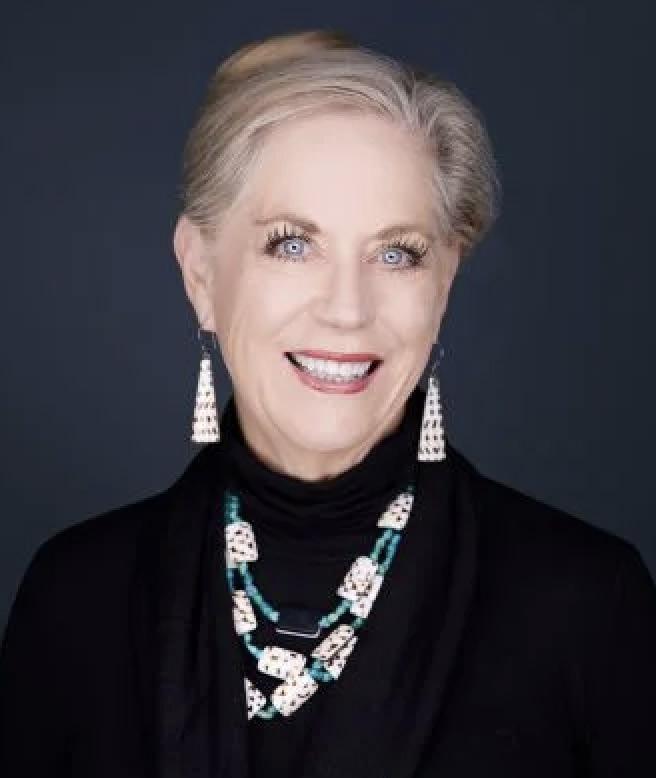
“The clinical training is going to be what we call the distributive model, which means that they will go out into existing private entities and do a lot of [student] training,” she said. “We have some partnerships lined up for that, from Arkansas veterinarians to some unique partnerships where they’ll actually work in practices that are devoting some time to teaching them in that environment.
“There are several colleges out there that have distributive models, and there is always a question about do they get a quality education just like they do in a teaching hospital? What they’ve found is that these students perform very well on the tests that they need to take, and practitioners are praising them. So, I think the model is proven to work, and it’s going to work here, too.”
The school is a boon to the state, which has struggled to attract and retain quality veterinary care statewide. According to Lyon College, Arkansas ranks 49th in the country in veterinarian-to-population ratio with many of the state’s current practitioners at or nearing retirement age. Moreover, eight of Arkan-
sas’ 75 counties offer no registered veterinarian and 10 other counties had only one as of 2020, a statistic no doubt fed by the fact the state has no veterinary school of its own.
Given these facts, last year’s announcement by Batesville-based Lyon College to launch a veterinary school, which looks to welcome its first class of 120 students in 2025, was greeted warmly.
“We’re excited for the students of Arkansas,” Wes Ward, Arkansas secretary of agriculture told Inside Higher Ed. “Hopefully, it’ll give them the opportunity to get their veterinary education in the state and hopefully give them the chance to stay in the state as opposed to opting for another.”
Green pledged to do just that, saying the school’s
Eleanor Green
“The clinical training is going to be what we call the distributive model, which means that they will go out into existing private entities and do a lot of [student] training.”
approach will be tailored to encourage students to consider careers in the state’s rural areas, where the need is greatest.
“If we look at America, it has gone where it used to be 98 percent agrarian and rural to 98 percent urban, pushing 99 percent,” she said. “We don’t have as many young people who come off of farms and ranches as we did in the past. It becomes a challenge and, quite frankly, it’s a lifestyle choice for these students to do the kind of medicine they want as well as to live where they want.
“It’s true across the whole country, if not the world, that small animals predominate, so we want to make sure they get a good solid experience there. But we’ll also offer electives and additional experiences for them that will allow them to increase their knowledge and understanding. That could be equine, it could be food animal, it could be a general rural practice, it could be exotic animal medicine, it could be zoological medicine.”
Part of the school’s focus will be to not only educate students according to the needs of rural Arkansas, but to actively foster an interest in directly serving these areas after graduation.
“There are many enticements out there,” Green said. “There are federal programs that help pay their student loans. There are even some local programs in some communities that try to entice students to come to the rural communities with
veterinarians, just as with doctors. As a school, we’ll be doing what we can to try to encourage and entice students to go to rural communities to fulfill the needs of Arkansas.”
Covering such a wide swath of veterinary expertise doesn’t happen easily or cheaply, which is why Green said the school will be looking to establish working relationships with a variety of partners, everything from practicing veterinarians to animal shelters to the Little Rock Zoo. These relationships, combined with the school’s aggressive scheduling model, looks to cut into Arkansas’ vet deficit quickly.
“One of the things that’s going to be a little bit different is this is going to be a three-year program,” Green said. “We are working in a profession right now that doesn’t have enough veterinarians. So, our program is going to be year-round. They won’t have summer breaks, so we can get them through more quickly. Same nine semesters but accomplished in three years.”
The elephant in the room, as it were, is why Lyon College would take on the task of launching a veterinary school, a project even the state’s land grant university won’t tackle.
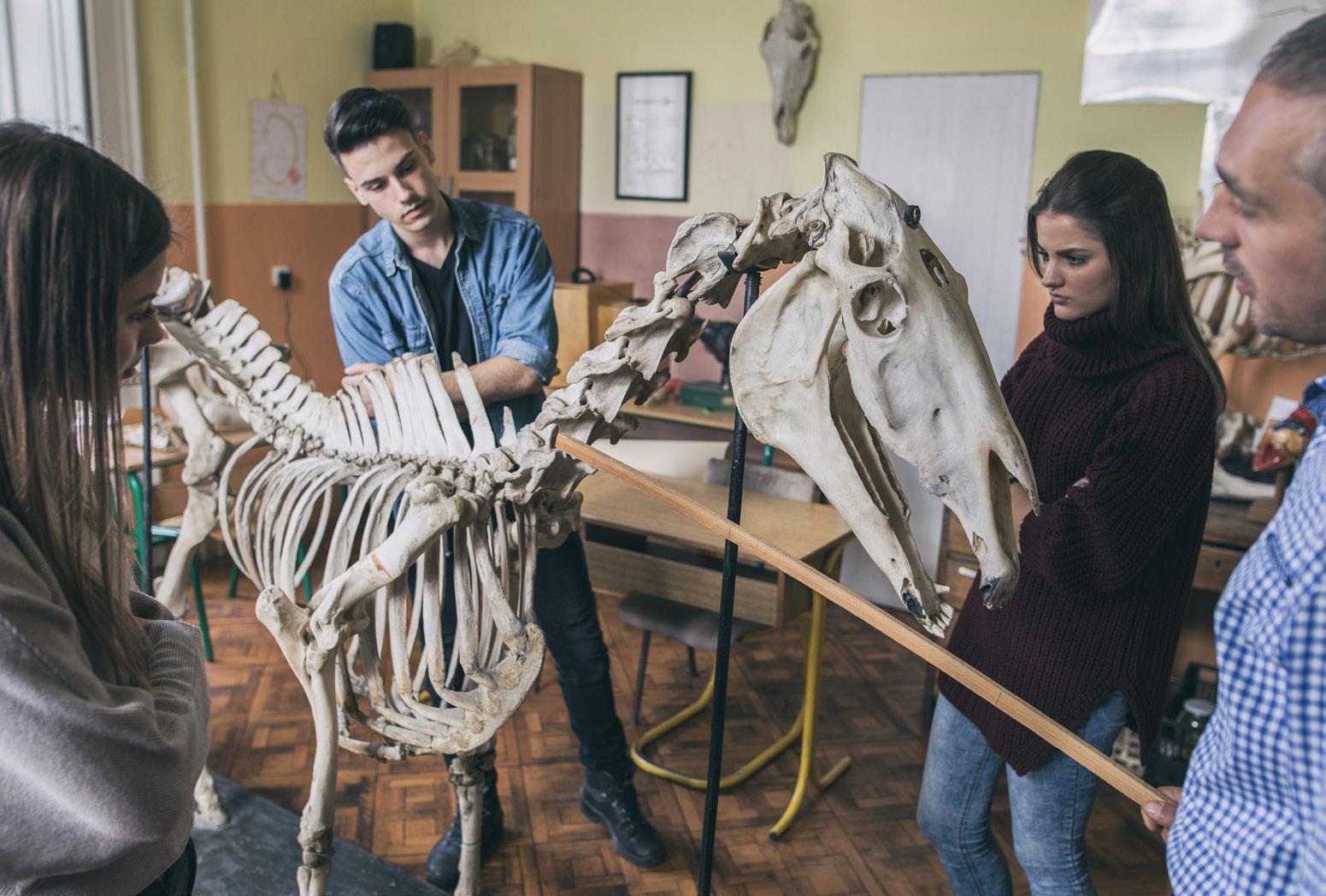
“People have asked, ‘Why Lyon College? It’s a small liberal arts college. Why put a veterinary school there?’ I think there are so many reasons for that,” Green said. “One is, it is private and that makes them very nimble. It makes them have the capability of instituting innovative change in a very efficient and rapid way. Interestingly, President Melissa Taverner has an interest, a very sincere interest in this being an innovative college and supporting an innovative school.
“Arkansas students now go out of state and the state of Arkansas helps them do that. Wouldn’t it be nice to keep them home if they would like to stay home?”
Dr. Burke Soffe has seen the field of dentistry from a number of angles — small-town practitioner, college professor and now as dean of the forthcoming Lyon College School of Oral Health and Dental Medicine.

Talking about the future of the school, to be located in downtown Little Rock on the former campus of Heifer International, puts a smile on the Utah native’s face.
“Frankly, we’re trying to change dental education, which for the most part has been stuck in the 1980s,” he said. “Part of the goal of Lyon College is that we want to make [dental education] affordable, we want to make it accessible, we want to make it efficient. And, more than anything, we want to benefit the people in Arkansas that need it the most.”
Soffe, who graduated from dental school at the University of Nevada-Las Vegas and practiced in rural Virginia, was teaching at Roseman University in Utah when he was approached about the possibility of leading Lyon’s new venture. He was intrigued at the thought of a small school tackling such an ambitious endeavor and doing so with an eye on innovation.
“Starting a dental school is incredibly expensive, and maintaining a dental school is equally as expensive and not a great source of revenue,” he said. “Initial investment is in the millions. To get things fully started, we’re looking at upwards of $5 million to $10 million.”
The idea that a school the size of Lyon College, which clocks in at just under 700 students, would even consider a venture of this magnitude is audacious to the point of laughable in many circles. But the school showed its moxie with a strategic alignment with OneHealth that’s caught the attention of the academic world.
Per Lyon College, OneHealth utilizes private sector capital and consultant solutions to support the launch of professional health-science programs, reduces the debt burden of graduating pro-
fessionals and provide solutions for communities that lack ample access to health care.
A strategic partnership between an institution of higher learning and a private funding group of this type is an untested strategy, say experts.
“What they’re doing is highly innovative,” said Andy Goodman, president of Arkansas’ Independent Colleges and Universities, in an Inside Higher Ed article last spring. “I won’t be careless and call it radical, because it’s very well thought out. But it’s definitely highly innovative.”

College officials acknowledge the funding approach is novel but say the state of the dental industry demands such groundbreaking solutions in order to address a chronic lack of care in states like Arkansas. Per Lyon College, The Natural State ranks 51st in access to dental health care, and the Arkansas Department of Health noted 10 counties had nine or fewer dental professionals overall, and the total number of dental professionals continues to fall.
The reasons, Soffe said, are clear, starting with cost. Dental school is not only expensive to operate but proportionately expensive to attend, made worse by stagnated earning power that makes it difficult to get out from under massive student debt.
“Dental education costs have been on the rise since the ῾80s, dramatically,” Soffe said. “The average student loan debt is close to $400,000 for a four-year education, while dental fees [in private practice] have not risen dramatically. The way tuition is increasing is not sustainable.
“We obviously want to attract any students in Arkansas that want to be dentists and keep them in the state in areas of need. We want to make sure that we do the proper analysis to make sure the price point we’re at accomplishes those goals.”
Access is another barrier to many considering a career in dentistry. Aspiring Arkansas dentists must currently go out of state to study, adding to the cost of their education, to say nothing of the risk that they will decide to set up a practice in the state where they are educated.
Rather than be deterred from such challenges, Lyon College is leaning into them, Soffe said.
“We plan to have a larger class size than other schools because our plan is to put students across the state,” he said. “A traditional dental school has a large clinic that generates some revenue. Our plan is to have a small campus but to place students in Federally Qualified Health Centers [FQHCs] and practices across the state in what we would call dental deserts, where the dentist-per-population ratio is very low.
“We want to put students in these rural areas and provide the care that people need, but also increase the probability that [students] will come back to practice there.”
Soffe said the model will improve outcomes as it exposes den-
tal students to more patients and real-world clinical settings than they would have in the traditional dental school model.
“Since the ῾80s, the average dental student will see one to two patients per day,” he said. “If you take the average of those days, a dental student could be exposed to roughly 46 cases in a fouryear dental education. That’s about the number that you would want to see in an average month in practice. So, the average dental school experience is prepping you for one month of solo practice, which, frankly, isn’t good enough.
“One of the things we want to do by putting them in community clinics is provide authentic learning opportunities. Instead of seeing one to two patients a day, they could be exposed to the average dentist’s number of patients per day. We believe that efficiency will decrease the learning curve and expedite their education, prepping them for the first year to two years to three years of practice.”
Such plans aside, the dental school remains a monumental undertaking, especially for a school Lyon’s size, and done remotely from its home campus in Batesville to boot. Thus, Soffe said, the college is actively courting other strategic community partners to help support the new school.
“We already have been reaching out to companies like Delta Dental of Arkansas and UAMS,” Soffe said. “Our plan is to enter into agreements with them, more formal than the verbal agreements that we already have, to help offset the cost of equipment and buildings and providing scholarships for underrepresented minorities and different initiatives like that.”
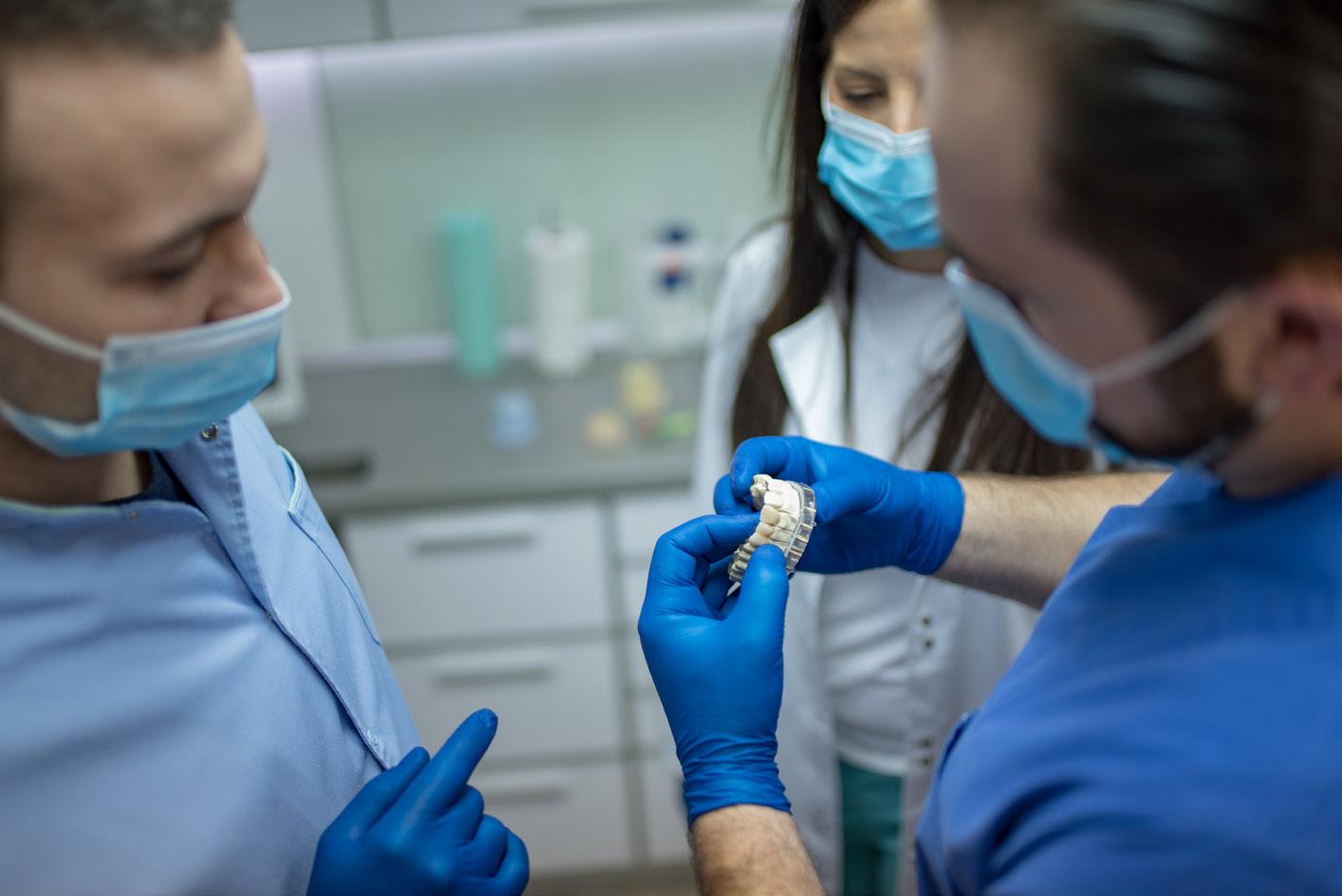
Soffe is blunt about the challenges that still loom between now and the first day of classes, which, in the best of scenarios, would happen in fall 2024.
“I don’t know if this is the biggest, but we have a huge challenge to get through accreditation,” he said. “We’re regionally accredited through the Higher Learning Commission. Dental accreditation is an expensive, difficult battle, but we can’t matriculate a class without dental accreditation.
“Another challenge is attracting the right people as faculty and administrators. I have met so many great dentists in Arkansas who are excited about the possibilities. But the reality is, to have a startup, it’s really all hands on deck, people doing things that are out of their comfort zone and creating the culture of the
school that will nurture this next group of dentists that will provide the impact in the state. That’s a huge challenge, getting the right people in the right places and establishing the culture. We have to have people committed to the vision who are willing to take on some risk.”
It’s unnerving to look such challenges in the face, some of which border on the existential. But as Soffe noted, taking such calculated risks is necessary to turn the tide of dentistry in Arkansas, the potential benefit of which is incalculable.
“For me, this is a huge professional risk, because there’s no 100 percent guarantee that we can get this done,” he said. “But as I mentioned, I really was smitten, so to speak, by the possibility Lyon has to expand and grow its brand, and more than anything, to create a statewide impact.”
“We want to put students in these rural areas and provide the care that people need, but also increase the probability that [students] will come back to practice there.”At Lyon’s new Little Rock campus, dental students will have the opportunity to stay in Arkansas to earn their degree.
Provisions related to school vouchers demand all the attention when the subject turns to the Arkansas LEARNS Act, the signature legislative package from Gov. Sarah Sanders passed this spring by the General Assembly.
And though the legislation spent much of the summer fending off legal challenges to its voucher-related components, those parts of the law with the potential to make the biggest long-term impact address the state’s nagging youth literacy problem.
Less than 40 percent of Arkansas students met or exceeded expectations in the ACT Aspire reading test for the 2021-22 school year, mostly in rural areas where teacher retention is an issue, according to the State of Education in Arkansas 2023 report from Forward Arkansas.
Reading scores in southeast and southwest Arkansas were lower than other regions of the state, the report revealed, and minority and low-income students lagged even further behind the pack. Furthermore, a 2021 study from The New Teacher Project found that in 30 of the state’s 238 traditional public-school districts (not counting charter schools), 10 percent or more of teaching staffs were working without standard teaching licenses. The percentage of unlicensed teachers was more than 30 percent in seven districts and in two districts, the number of unlicensed teachers exceeded the number of licensed instructors.
Unlicensed teachers make up 4 percent of the state’s 34,000 teacher workforce (the national average is 1.7 percent), the study found, while another 3 percent is teaching a subject for which it is not licensed.

These kinds of numbers tend to result in the kinds of numbers found in Forward’s 2023 report.
A nonprofit created in 2015 by the Winthrop Rockefeller and Walton Family foundations for the sole purpose of improving Arkansas student scores, Forward believes sending better trained teachers into the classroom will help raise those scores, maybe even entice more local students to enter the profession, and better yet, stick around once they do.
Better pay will help get more candidates in the door. The LEARNS Act’s most well-known provision raises entry-level annual pay for teachers to $50,000, taking Arkansas from one of the lowest paying states for instructors to one of the highest. But the law also addresses the state’s falling literacy scores by providing literacy screeners for K-3 students and literacy coaches for K-3 teachers in underperforming schools, holding back third graders who don’t meet their gradelevel standard (with exceptions), providing individual reading plans for non-proficient K-4 students, establishing a literacy-tutoring grant program of $500 per K-4 student and auditing the state’s educator preparation programs.
In 2021, Forward launched its Educator Preparation Program (EPP) in partnership with state universities to think about changing the way Arkansas teachers are prepared. Through $100,000 grants to eight Arkansas universities, Forward created the EPP Design Collaborative to brainstorm ideas to help recruit more qualified teachers, better prepare educators and improve teacher retention rates.
The collaborative included eight Arkansas universities, each of which received a $100,000 Phase I grant from Forward. The schools making up the collaborative are the University of Arkansas at Fort Smith, the University of Arkansas at Little Rock, the University of Arkansas at Pine Bluff, Arkansas State University, Arkansas Tech University, the University of Central Arkansas, Harding University and
Forward, which is working with the Arkansas Department of Education (ADE) to ensure that EPP initiatives align with state priorities, retained prominent educational strategy firms US PREP, TPIUS and 2Revolutions to collaborate with educators at each school. The collaborative was charged with developing a plan to better equip Arkansas teachers entering the workforce — to grow and improve teacher preparation in Arkansas including the pool of prospective teaching candidates and to make teaching programs in the state more practice-based.
In that vein, the collaborative recommended the implementation of paid, year-long teacher “residencies” be included as part of the teacher training process in partnership with local school districts. Under the program’s model, districts themselves ultimately will pay the teaching residents themselves.
Phase II narrowed more lucrative grants down to two schools — SAU and UA Little Rock. SAU’s School of Education was awarded $798,000 and UA Little Rock received $453,000. And in addition to the Forward grants, UA Little Rock received a $3.5 million grant this past spring from the Windgate Foundation to advance its education curriculum.
Residencies were launched this past school year at SAU while UA Little Rock will begin its residencies starting in August.
Since it launched the EPP, Forward has awarded more than $4 million to Arkansas universities in direct funding and comprehensive technical assistance from its national partners.
And though UA Little Rock and SAU are moving ahead with their Phase II grants, other members of the collaborative are moving ahead with their own student residencies. These teaching residents are paid up to $100 a day, in some cases, and paired with a teacher-mentor to help teach class. The teaching candidates are in class for at least part of the day five days a week for the entire school year. Plus, a member of the university faculty from the candidate’s school was on-site at each host school to observe and evaluate.
Rather than talking about teaching in a classroom back on campus, students get daily on-the-job training under the direction of their host teacher while receiving real-time critique from a university instructor.
Dr. Sarah Beth Estes, dean of the UA Little Rock College of Humanities, Arts, Social Sciences and Education, believes the residencies will help better prepare prospective teachers for what awaits them in a classroom. She calls the process being advanced by Forward potentially transformational at a time when Arkansas education could use some transformation.

“Many students who major in education don’t end up going into teaching for a variety of reasons — the cost, it’s challenging,” she said. “The profession has gotten a lot harder.”
Estes said UA Little Rock was planning to implement changes in its teacher prep regardless before the Forward grant.
“We would’ve been at a glacial pace, but this has turbo-charged us,” she said.
Ben Kutylo, Forward’s executive director, thinks all the ingredients for change are present in Arkansas. The new legislation addresses a “pretty severe” talent problem by getting more teachers in high-need areas and creating a different pathway for Arkansans in different
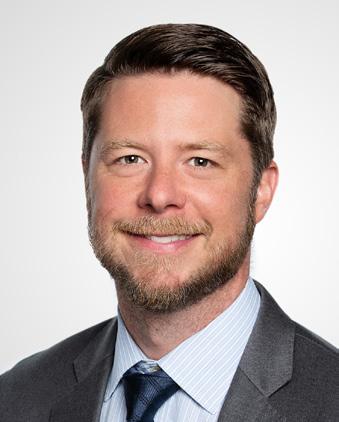
stages of life to become teachers, he said.
““We saw a need to think fundamentally about the experiences that teacher candidates were having. We’ve got to prepare teachers for today’s classroom, and that means more rigorous classroom preparation.
“We want Arkansas to be in the top five or 10, and it can be, and not in the 40s. But Mississippi is coming up fast, too. The Arkansas approach through LEARNS reflects the progress being made in Mississippi. Policy is the starting point, but it all comes down to implementation at the local and state levels. We’ve just started the process.”
Kutylo said the new model for teacher prep will “realign and rethink” current coursework based on the specific needs of individual districts, and believes the high-quality, on-the-job training teaching candidates receive over the course of an academic year will make a big difference in student outcomes.


Malachi Nichols, director of data and strategy for Forward Arkansas, said the legislation’s focus on literacy represents a major opportunity for students in Arkansas, but it all comes down to implementation.
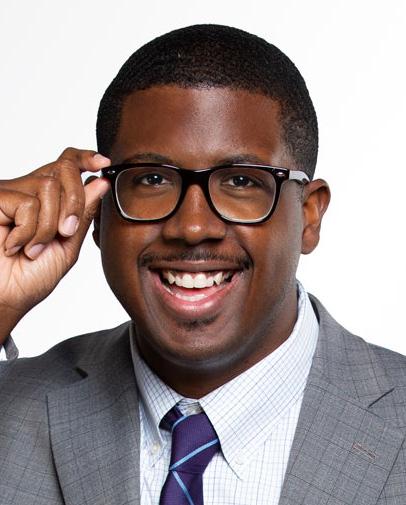
“The literacy-focused policies in LEARNS directly reflect policies that other states have used, like Mississippi, to dramatically increase
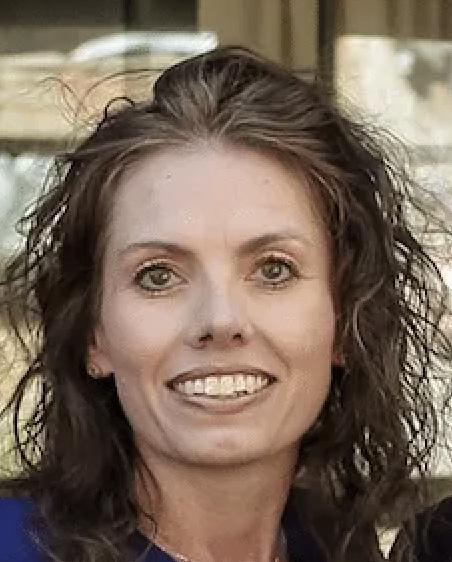
“The most important thing we can do for students is to put a good teacher in front of them, and this model helps us do just that.”
—Jim Tucker
reading levels over the last 10 years,” he said. “However, many strategic questions remain. The impact of LEARNS will be dependent on data and research-informed rulemaking and effective implementation at both the state and local levels.”
Equipping teachers to succeed early in their careers, and students to excel, will attract more teachers where they’re needed, the thinking goes. Change doesn’t happen overnight, but through the legislation’s focus on literacy and Forward’s EPP, more seeds are planted.
SAU sent 32 teaching residents to the El Dorado, Texarkana (Arkansas), Magnolia, Ashdown and Hope districts last fall. The reviews were glowing.
Jim Tucker, superintendent of El Dorado schools, said his students benefitted greatly from the residency model.
“The most important thing we can do for students is to put a good teacher in front of them and this model helps us do just that,” he said. “I can’t think of a better way to develop a new teacher than to have that person with a good, experienced teacher, working side by side for an entire semester or year. The growth we have seen in the teaching candidates has been remarkable.”
Many of the teaching residents who spent the 2022-23 school year in El Dorado will be back next month as full-time, regular teachers.
“We have also been able to retain those candidates,” Tucker said of the SAU group. “They will be teaching for the El Dorado School District this coming school year at the same schools they did their residency at. We are very excited to have each one of them join our team. They are going to do a great job, so in turn, our students will benefit.”
Tucker is confident the model will help recruit more strong candidates to the teaching profession.
“This model will help candidates build confidence in their skills. They will also learn good teaching strategies from their mentor,” he said. “Being involved with all aspects of the school year, environment and professional learning communities will help mode the candidate into a strong teacher. The candidates also get paid while they are doing this, so they can focus on developing their teaching skills and not have to try and work a job while being a resident. I think this is a huge advantage over the traditional way of student teaching.”
The amount a teaching resident is paid varies between districts, but Tucker’s point is an important one. Under the EPP model, teaching residents don’t have to juggle work and school — work and school are one.
Dr. Neelie Dobbins, professor of education and chair of the Department of Teacher education at SAU, said the residencies also have helped her students feel a part of the local culture and potentially want to stay with their host district.
“We’ve had some really high-quality candidates say, ‘I want to stay here,’” she said. “Now, teachers want to take our candidates. We’ve even had evaluators ask, ‘Who is the teacher and who is the candidate?’”
Dobbins said the program is helping change the momentum for teaching, especially in areas like south Arkansas that lost a lot of teachers once the pandemic hit.
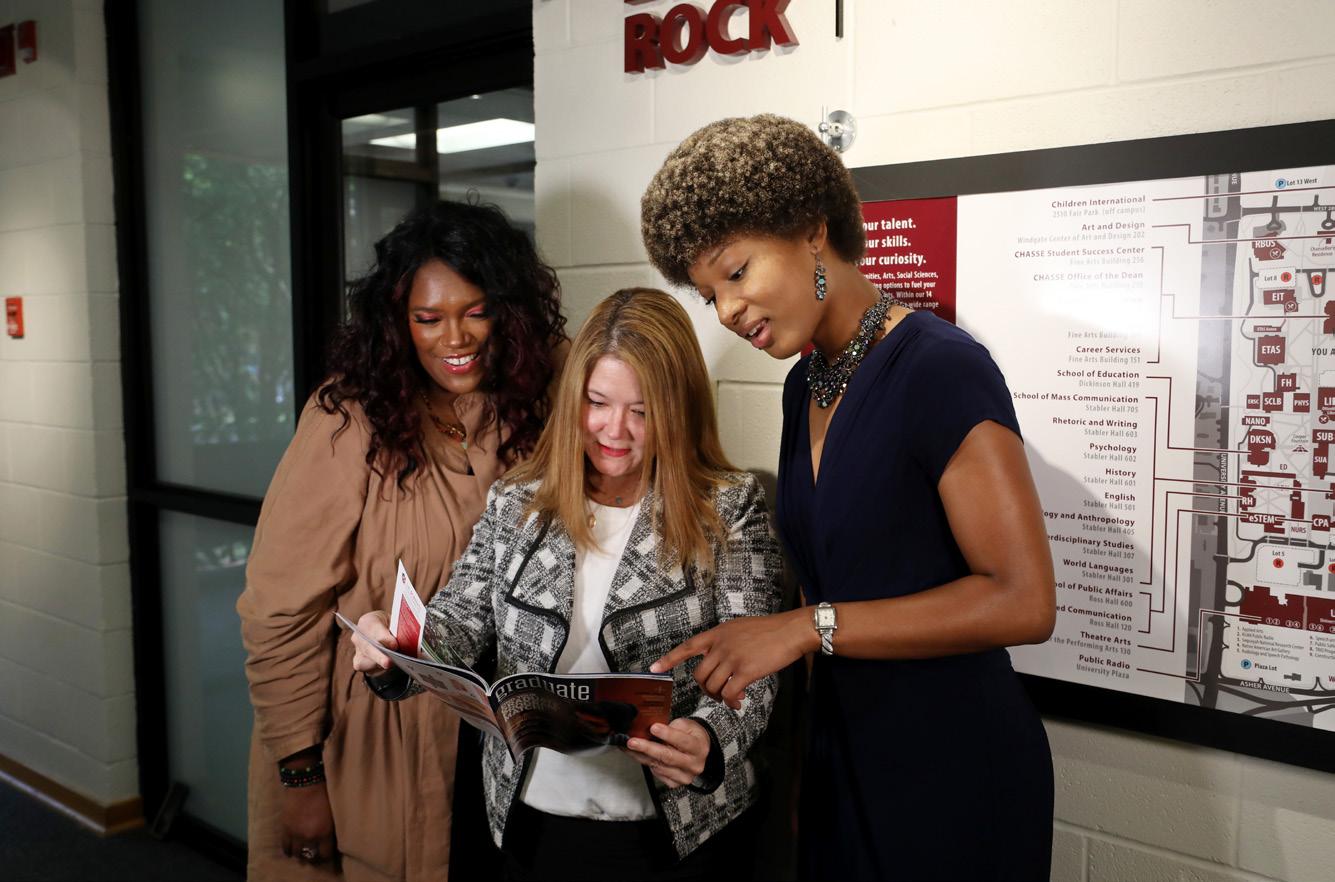
“Yes, it is changing. The ROI is huge,” she said.
The residencies do several things, Dobbins said. They allow for true co-teaching, which has been popular with the students; encourage curricular evaluation and change; allow more time to work with teachers and find out what’s going wrong; and enable teaching candidates to immediately practice what they’re learning.
In other words, “Stop planning and just do,” Dobbins said.
The collaborative model has been popular among educators. Even those schools not receiving grants are moving ahead with plans to change the way they prepare future teachers.
“The collaboration that is happening in the state is uncommon,” Estes noted.
Dr. April Evans, who just took over for the retiring Dr. Monica Riley as director of the School of Education at UA Fort Smith, said Forward’s work has opened much-needed conversations across the state.
“With our apprenticeship program, we have set the stage for other universities in the state.
We’ve always been a collaborative group, but this gives us a platform to bring funding to the table.”
According to ADE, the number of teacher candidates dropped by more than 50 percent from 2013 to 2018. And that doesn’t even take into account COVID. And almost 10 percent of first-year teachers in Arkansas aren’t retained, while more than 30 percent are gone after five years. Just how important is it to have quality teachers who’ll stick around? Further research from The New Teacher Project found that teachers who rank in the top 20 percent generate more than five months’ worth of student learning per year compared to their peers.
For Nichols, Forward’s resident data guru, policy change is just the first step. But policy change in and of itself won’t change the data.
“What happens next — building the buy-in of district leaders, educators and community members and supporting effective implementation in ways that address local needs — will determine the level and pace of progress for students,” he said.
Choosing a college can be A LIFE-CHANGING DECISION.



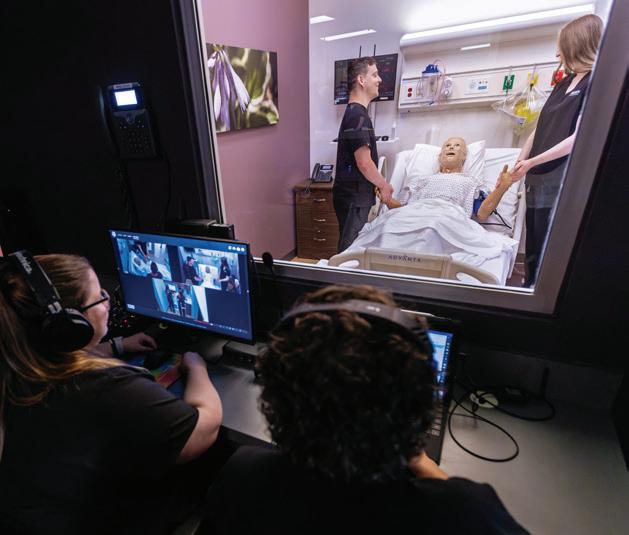
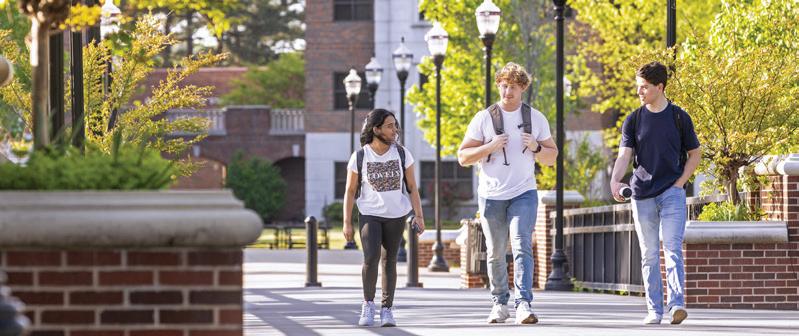



Yes, it can be about who you cheer for on Saturdays. And it’s certainly about the degree you come away with. But it can be so much more. It can be where you discover your calling, where you find lifelong friends, where you grow in your faith and where you gain the confidence to pursue your dreams. At Ouachita—even if you don’t know a single person when you arrive—you’ll be invested in personally, academically and spiritually from day one.


CHOOSE DIFFERENT. COME LET US SHOW YOU WHAT WE MEAN.
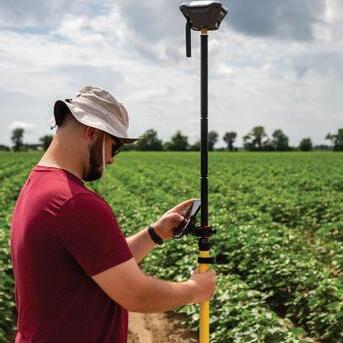

He might be calling his shot, but here’s hoping he hits it out of the park. Secretary of Education Jacob Oliva wants to raise Arkansas out of its low educational ranking by implementing some big ideas. One of them is to change the state’s starting teacher salary to $50,000.
This would take Arkansas from a position of 48th in the country in terms of teacher salary to one of the top five highest-paying states. He also plans to help bring huge improvements to the educational system by leading the rollout of a major educational reform bill.
Earlier this year, U.S. News & World Report published its annual rankings placing Arkansas near the bottom in overall education, but the newly appointed secretary believes that’s not a true representation of the state’s potential.
“I think we have the talent in the state to see better results,” he said, “and it’s about making sure that we get some of the big pictures — the systems — aligned to support school districts at the local level, so that we can see those better outcomes.”
One of those “systems” includes a new policy endorsed by Gov. Sarah Sanders. The LEARNS Act, which she signed into law in March, is intended to revamp education from early childhood through the 12th grade by adopting a universal school voucher program.
Oliva, who supported Sanders during her campaign, said she spent a couple of years “meeting with stakeholders, teachers, leaders and business folks” explaining to them that her “No. 1 priority would be to improve education” with an “innovative reform bill.” Oliva was invited to join and contribute to some of those early conversations during her campaign trail.
“Now that the bill is signed into law, we can work on the implementation component and make sure that we’re able to implement these strategies with fidelity, because they are evidence-based, and if implemented correctly, we know we’ll see better outcomes and performance.”
Oliva’s high expectations come from a place of extensive experience and credentials. He spent decades working in public education after being a public-school student himself in one of the largest school districts in the country — the MiamiDade public school system. While in Florida, Oliva began his career as a public-school elementary teacher for students with special needs. He later served as an elementary school principal, high school principal, assistant superintendent and superintendent of Flagler County Schools. From there, he took on numerous roles for the Florida Department of Education, including executive vice-chancellor of the Public Schools Di-
“Raising the minimum salary to $50,000 a year really sets the bar by saying we know we have to invest in talent, and we want to make sure we can attract the best talent possible for students in the state.”
vision, followed by chancellor, and finally interim commissioner for more than 2.8 million students in approximately 3,600 Florida public schools.
By the time Oliva arrived in Arkansas, he was well-trained in the public school system and armed with a clear vision for education reform — a vision that he says doesn’t come from just seeing education from the viewpoint of a different state, but rather years of studying success stories in education.
“I’ve spent my career supporting schools and improving learning and public education that that scope is expanded to several states,” he explained. “I like to study what’s happening at a national level, identifying best practices that could be implemented and looking at the scale of the work that we’re doing. I think that experience is supportive to the state because I’ve served in so many different roles, and I know what it’s like to be in the classroom. I know what it’s like to lead a school. I know what it’s like to lead a school district. All of those experiences, I’m able to apply and execute here in the state of Arkansas working with the state board.”
His goal is to make sure his department is enacting the policies and practices to support Arkansas schools’ superintendents, leaders, and teachers in improving teaching and learning outcomes.

Now that the legislative session is over, the secretary is happy to be out of the halls of the Capitol and back in the halls of schools. He noted that during his classroom visits in Arkansas, he has seen “teachers who are really passionate about perfecting their craft and building quality robust programs that are focused on students.” He emphasized that supporting students in their academic endeavors leads to seeing better outcomes. Since his appointment to secretary, he has met with all educational collaboratives in the state to talk about implementing the LEARNS Act and how to get the necessary pieces in place.
“We know when we can get high-quality education standards that define what we expect students to know and learn at each grade level to align with curriculum instruction and assessment — when all of those pieces are aligned — it makes implementation a lot more achievable for improving learning,” he said. “We are working with school districts to do what the LEARNS Act has asked us to do, which is to get those pieces, systems and structures aligned.”
Rolling out the new directives will be a combination of shortterm and long-term goals, starting with updating language arts and math standards. Since change often comes with confusion, Oliva’s team wanted to head that off by making sure teachers, parents and students understand expectations. Step one was to review and update standards to make sure the language is clear and concise. Now with that work accomplished, they are identifying high-quality curriculum to provide teachers with the resources and materials for teaching to these standards.
The state is scheduling several training sessions for teachers over the summer. Then, over the next year, it will begin building out an assessment system to measure whether students are learning what is expected.
“So, we’re moving at a rapid pace,” Oliva said. “When we’re talking about acting with urgency, improving student learning is our agency’s No. 1 priority, and we’re going to create those conditions to set these students up for success.”
The secretary is optimistic about the state’s new direction in education, emphasizing that, “What’s exciting about being able to implement the LEARNS Act is that it’s a robust comprehensive package that covers everything from cradle to career. When we say this is the most innovative piece of legislation, definitely in the history of the state, but maybe even across the nation, it is just that, because we’re going to look at reorganizing early learning environment to make sure every parent who wants their
child to participate in high-quality childcare programs or voluntary pre-kindergarten programs can do just that.”
Oliva affirmed that these changes are meant to ensure students come to kindergarten ready to learn, thereby improving literacy outcomes with more students reading at or above grade level by third grade. Changes also include more support for teachers from literacy coaches and more support for parents through tutoring programs.
Oliva also shared that there will be new options for students who want to pursue educational paths other than college or university. The state is working on developing a career technicaleducation high school diploma, which he describes as “extremely innovative.”
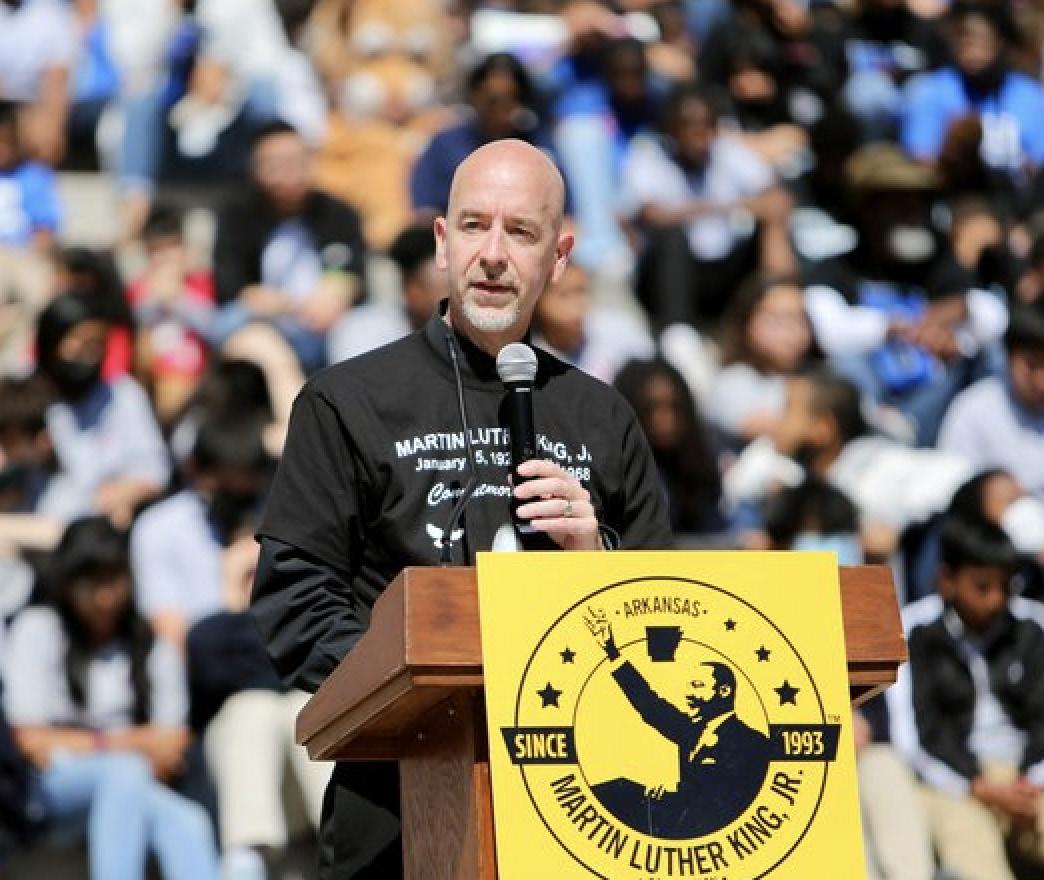
“It is going to support students in career and workforce readiness and get them excited about what they’re learning,” he explained. “When students see relevancy in the classroom and how their learning can apply to their life and to their future, they tend to get more excited about school. Creating different pathways and opportunities for students is something we’re going to continue to work on.
“A one-size-fits-all approach towards education doesn’t meet the needs of all students and families. So, I’m empowering parents to have a seat at the table and look at different educational options that work best for their own children. That is something that we’re excited about. When we look at this kind of leaning implementation and the overall goals, it’s really going to transform teaching and learning and outcomes for students in the state of Arkansas, and we’re excited to continue to build and expand on that.”
Of course, even with the most innovative educational plans, none of these goals can be reached without the true backbone of education — the teachers.
“Sometimes these systems are only as good as the staff you can put in there, and the research in education is very clear that the No. 1 impact in improving student learning is the teacher standing in front of those students each and every single day,” Oliva stressed.
Talent acquisition continues to be one of the greatest challenges among all school districts across the country. Investing in higher pay will show that the state values educators.
“Raising the minimum salary to $50,000 a year really sets the bar by saying we know we have to invest in talent, and we want to make sure we can attract the best talent possible for students in the state,” Oliva said. “This investment by the legislature and the commitment by the governor is going to move Arkansas from about 48th in starting-teacher salary to top five.
“These initiatives are about investing in improving public education. When we get that right, it’s not only going to open more doors for our students and families, but it’s also going to open doors for more businesses and people who relocated and set up their lives right here in this great state, and that’s a no-brainer.”
As the state’s premier building HVAC, controls, and service company, we offer K-12 schools, trade schools, and colleges and universities energy-efficient heating and cooling solutions that both do the job and fit the budget.

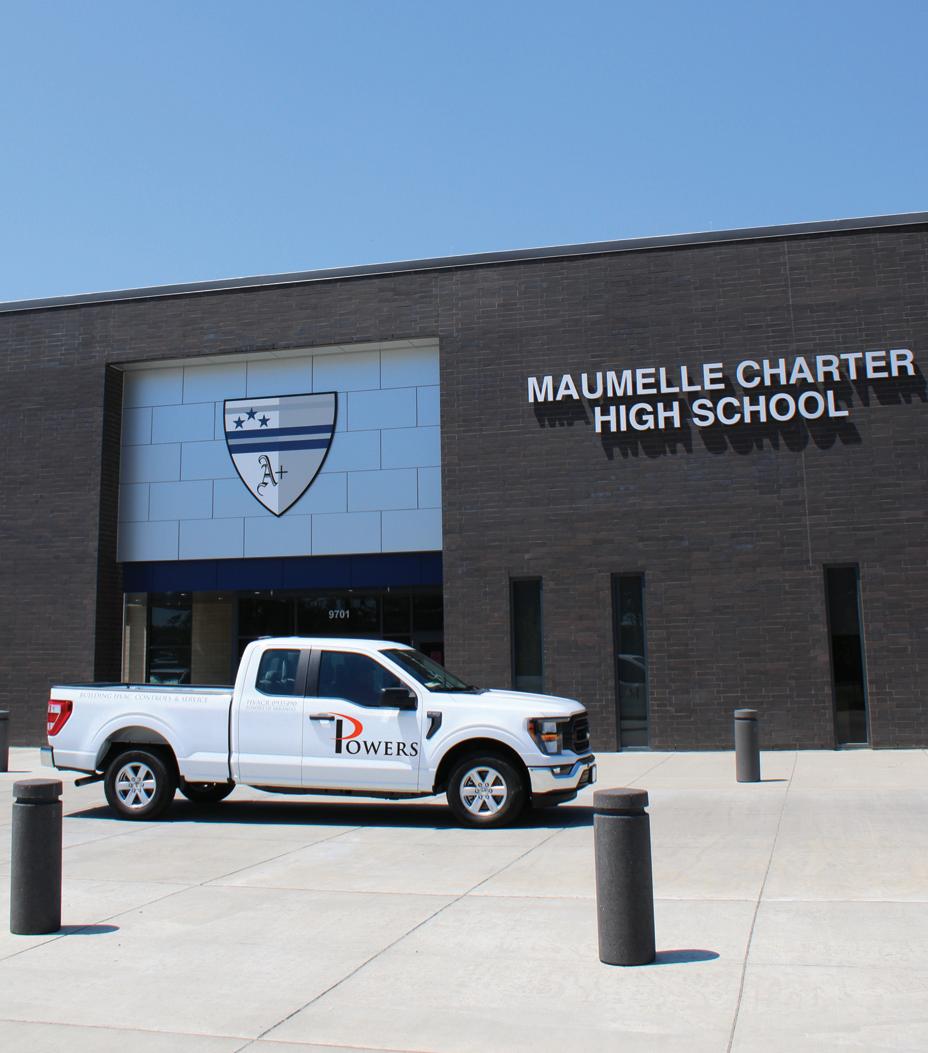
Great people, great service, and great products from companies like Siemens. This is how we create customers for life. One customer at a time.

We know how to keep your classrooms comfortable semester after semester, so call us and put our know-how to work for you. 877.274.7127
Expect more from your UA Little Rock education degree. We’re training the next generation of educators to teach in schools across the state. Our paid internships and access to teaching mentors, provide opportunities for you to gain valuable classroom experience in a supportive environment. With UA Little Rock, you can expect more. For yourself. And for your future.
SAU’s enrollment has increased 14 percent since 2018. (Photos provided)
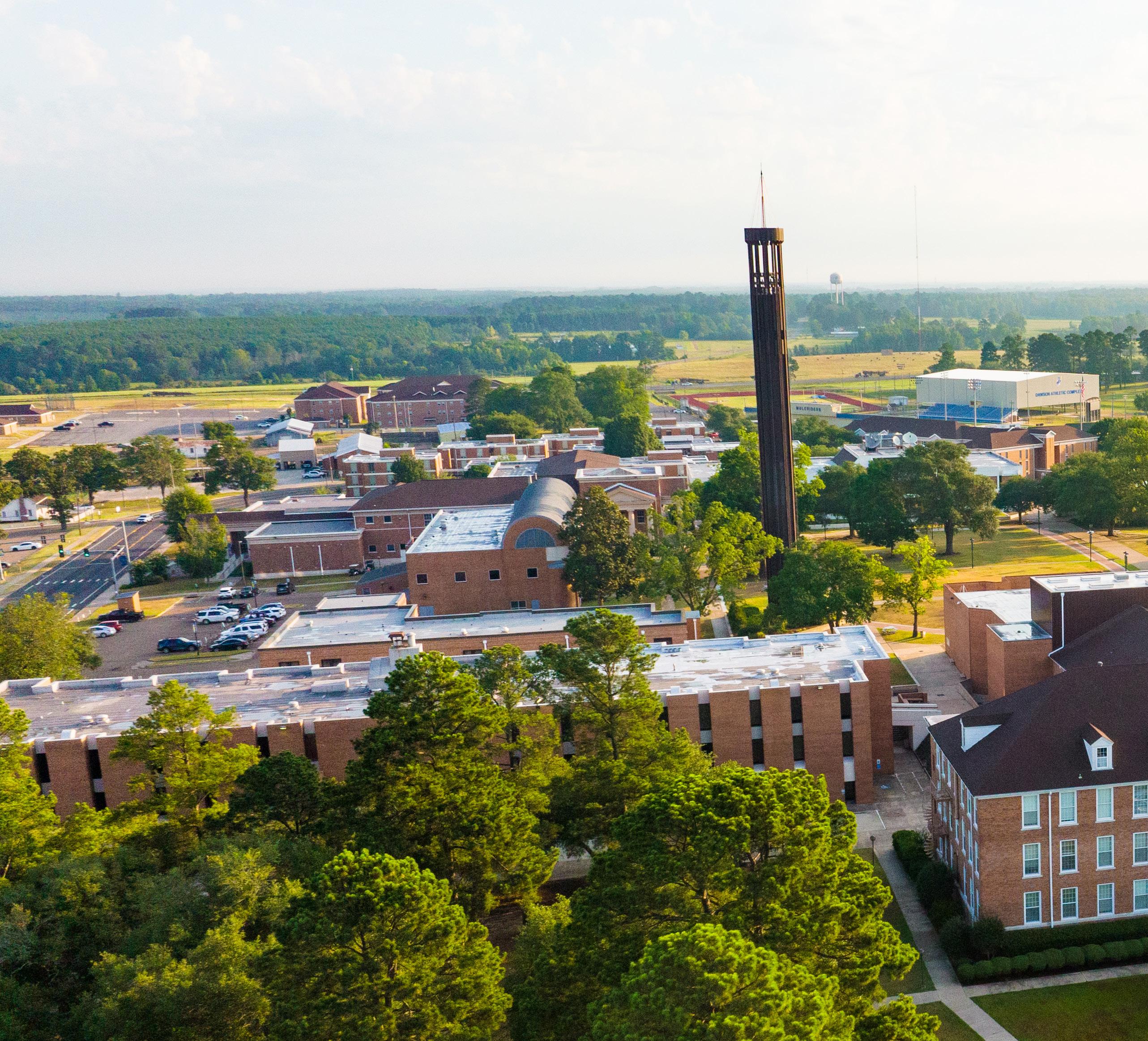
While most universities across the country have recorded declining enrollment figures over the past few years, Southern Arkansas University in Magnolia is seeing continued record numbers for enrollment as students flock to the four-year institution.
SAU’s fall enrollment of 5,094 represents a 14.9 percent increase over last year’s mark and a 14 percent hike over a five-year period beginning in 2018.
Only two other public four-year universities in Arkansas saw increases from 2018 to 2023. The University of Arkansas at Fayetteville reported an 11.4 percent rise in enrollment and the University of Arkansas for Medical Sciences noted a 17.5 percent increase during the same five-year period.
“We’re working harder to attract students from all over the world,” said Dr. Trey Berry, who is in his eighth year as the president of SAU. “We credit all our people pulling together. We’re all working toward the same mission.”
Founded as one of four Arkansas colleges established
by Act 100 of the Arkansas legislature on April 1, 1909, the Third District Agricultural School opened in Magnolia on Jan. 3, 1911. The school taught students agricultural practices, home economics and academic disciplines akin to a high school degree.
Known as Magnolia A&M during its first 30 years, trustees changed the junior college into a four-year degreegranting institution in 1949. Two years later, state legislators changed its name to Southern State College.

Legend has it that the university’s mascot, the Muleriders, came in 1912 when some of the school’s football players used mules as a form of reliable transportation. When four players showed up at the football coach’s house a few days after Thanksgiving for dinner, the coach greeted them with, “There’s my Mule Riders.”
The name stuck and is fitting more than just on the sports fields. The university’s tenacity and stubbornness to offer an attractive college life and future has worked.
On July 9, 1976, the college was awarded university
status, and the name was changed to Southern Arkansas University.
For years, the university in the small Columbia County seat of 11,105 that sits 18 miles from the Louisiana border drew regionally from southwest Arkansas and northern Louisiana.
Now, Berry said, SAU’s students hail from 31 states and 31 countries.
“We were thought of as a regional university,” Berry said. “Now, we’re a global university.”
But that doesn’t mean Berry won’t still recruit locally.
“We’re always looking for new markets, but we’re also looking at the rural high schools around that others may ignore,” he said. “If a few students from each school enroll [at SAU], it adds up.”
Berry said recruiters are also focusing more on attracting students who are home-schooled.
The president made it his mission to see that the university provided opportunities for students that reached out past their school years. He and staff members analyzed the job markets and structured academics to prepare students for future jobs.
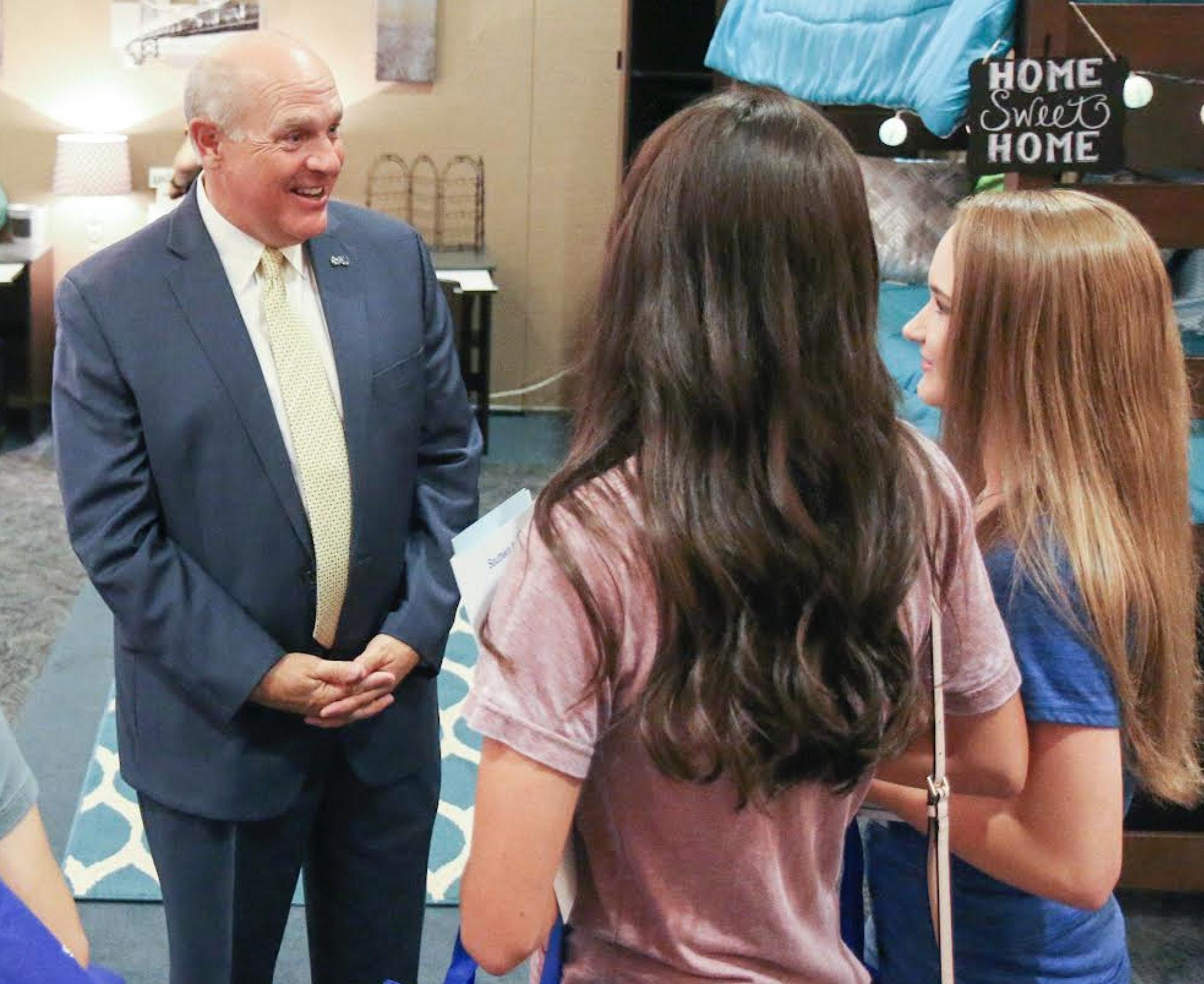
“We became business forecasters,” he said. “We have to be prognosticators. You don’t want to jump on something without doing market research first.”
As a result, SAU offers such unique majors as marine biology and cyber criminology.
Berry, who took the leadership role at SAU on July 1,
2015, came to Magnolia in 2011 as a professor of history and the dean of the College of Liberal and Performing Arts. He was promoted to provost and vice president for academic affairs in 2016.
He was also a deputy director at the Department of Arkansas Heritage for two years, a dean at the University of Arkansas at Monticello for two years and a member of the faculty at Ouachita Baptist University in Arkadelphia for 18 years before coming to SAU.
He replaced former SAU president David Rankin, a leader Berry credits with setting up the university for its future growth. And he noted the recession of 2008 as an element that drastically changed the perspective of college age students.
“We saw an immediate shift in the majors students [were pursuing],” he said. “They wanted good jobs. We needed to find a good market.
“We had to keep abreast of what was going on. We were constantly looking for new areas that people felt were the next big job markets.”
Schools across the country have seen declining enrollment figures, according to a recent study by the National Student Clearinghouse Research Center.
The study showed a 0.5 percent drop in enrollment across all higher education facilities since the 2022 spring college semester. A year earlier, that dip was larger at 3.1 percent.
Henderson State University saw a decline of 34.6 percent
We were constantly looking for new areas that people felt were the next big job markets.
— Dr. Trey Berry
in enrollment between 2018 and 2023; the University of Arkansas at Little Rock lost 22 percent of its enrollment over the five years; and Arkansas Tech University’s enrollment dipped from 12,101 in 2018 to 9,445 – a 21.9 percent drop.


While this year’s national decline is less than before — in part because of the COVID-19 pandemic waning — it is still indicative of the trend of less college students. The center forecasts that enrollment recovery seems “out of reach for a full or even partial recovery for most institutions.”
During the pandemic, Berry said he “lost many nights of sleep” trying to prepare the university for changes.
“We didn’t know what was going to happen,” he said. “We had never seen anything like this. Our main concern was in keeping our students safe.”
The university adjusted its academic programs, gearing them toward whatever it took to keep students from danger from the virus and to keep enrollment from declining.
With its 435 employees, the university is the county’s second largest employer. The university continues to strengthen its relationship with the Magnolia community; the annual Making Magnolia Blossom, a cleanup program for the city’s Main Street, has drawn scores of SAU students and staff as volunteers.
“We wouldn’t be here without Magnolia’s support,” Berry said.
Berry also serves on the board of directors for the Magnolia-Columbia County Chamber of Commerce and is a member of the Golden Triangle Economic Development Council board.
SAU board member Nathan Evers credits the working relationship between administrators, the board and the town for the college’s success.
“We’ve had some big construction projects on campus,” said Evers, who is serving his third five-year term on the board. “There’s been a lot of expansion, but the students like the smaller college atmosphere.”
He said the university’s internship programs,
which place students with businesses, has also worked well and is a draw for the school.
“The program puts people with businesses looking to hire,” Evers said. “The students get experience, and businesses find people they want to hire.
“Our students are getting as good an education as they would at a bigger university.”
His first year as president of Harding University in Searcy has kept Dr. Michael Williams, and his wife, Lisa, busy enough that they are just now able to sort out goals for the state’s 100-year-old private university.
“Joel Anderson told me when I started to give him a call so we can get coffee and catch up,” Williams said. “That was last June. I just emailed him in May this year to grab that cup.”
Harding University is home for President and Mrs. Williams. Both attended and earned degrees there, Williams a Bachelor of Business Administration in 1985 and Master of Business Administration in 1987. He then went on to earn his Doctor of Education from the University of Pennsylvania. Originally from central Ohio, Williams was drawn to Harding on the advice of his Church of Christ minister and the influence of his school librarian, who had also attended Harding.
“Coming back to Harding University and Searcy, Arkansas was an opportunity for Lisa and me to lead an institution that has meant so much to both of us, our family and friends,” Williams said. “With this coming year being the centennial for Harding, I see tremendous bandwidth the university has and can offer this state.”
In addition to graduating from Harding, Williams joined its admissions staff in 1987. In 1991, he was promoted to director of admissions, which led him to his appointment as vice president of advancement in 2003. His career then led him to take on the president role of Faulkner University, a private Christian school in Montgomery, Ala.
Meanwhile, Lisa Williams was earning her Bachelor of Arts and Master of Education degrees from Harding, meeting her future husband there in 1986. She taught third, fifth and sixth grade students before helping launch the Virtual Education Academy in Arkansas. The Williams’ shared passion for education and profound faith have led them to come back to Harding to grow it in its second 100 years.
“We are in a knowledge economy,” Williams said. “Higher education is at a pivotal moment in our history, and we must lean into the opportunity of educating students not just now, but throughout their lives. It is forecast that this country’s emerging workers will have 20 different jobs in five different industries during the working years of 22 to 75.
“What does that look like? How do we as high education professionals prepare our institutions and our students for success in this environment? That is what Lisa and I are hoping to help answer while at Harding University.”
Founded in 1924, Harding University is a private Christian university affiliated with the Churches of Christ. The university offers a wide range of undergraduate and graduate programs across various disciplines. The institution is committed to the tradition of the liberal arts and providing opportunities for a broad range of disciplines in undergraduate, graduate and professional programs.
“The student body at Harding comes mostly from outside the state,” Williams said. “Our students, on the whole, think missionally.”
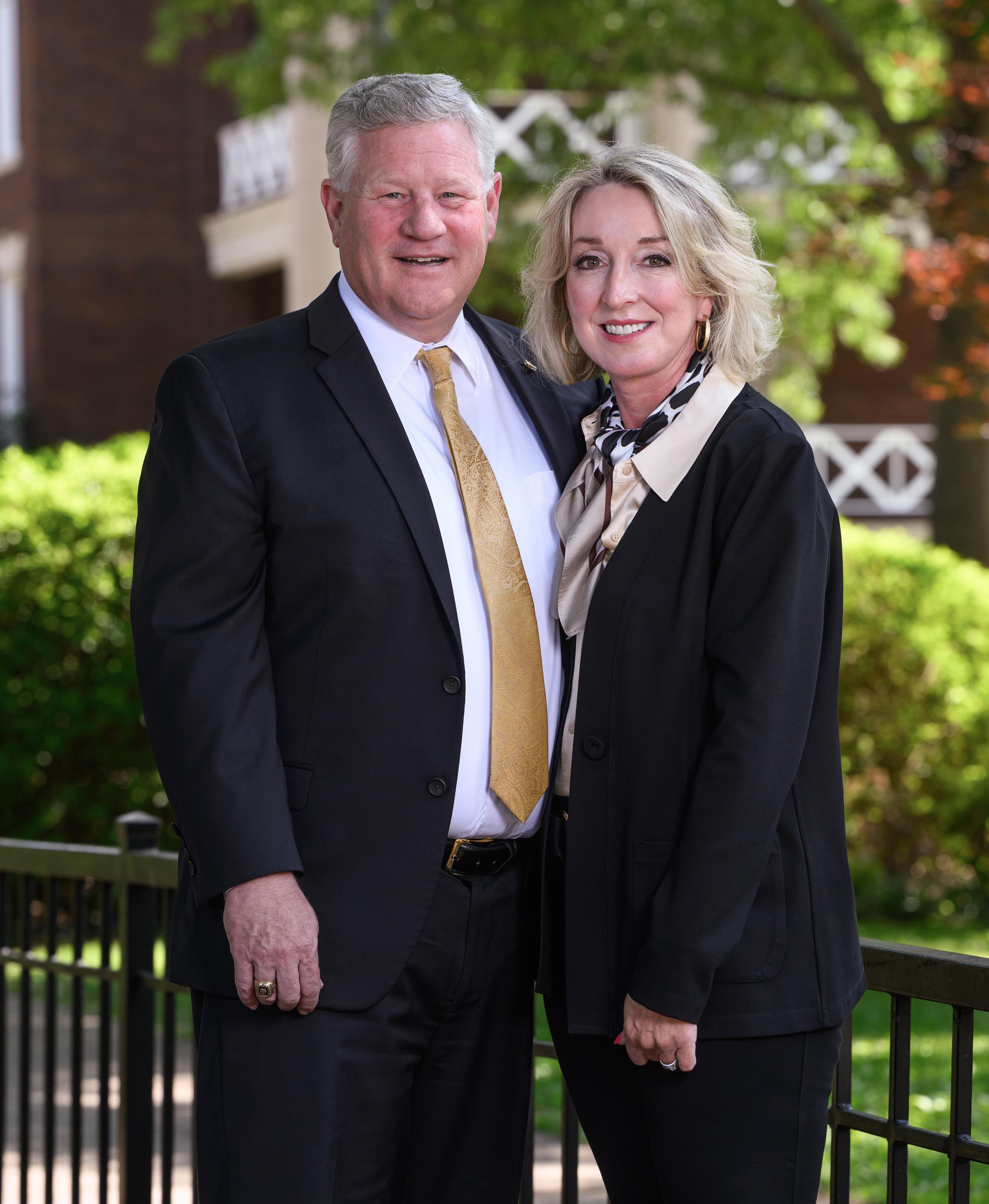 Lisa and Dr. Michael Williams (Photos courtesy of Harding)
Lisa and Dr. Michael Williams (Photos courtesy of Harding)
The Williams’ want to further establish Harding as a place where students can develop their faith and find a ‘relational community.’
Lisa Williams noted that the average Harding student’s hometown is 10 hours away from campus.
“They are attracted to Harding for the sound education, but also because they are people of character who want to develop their faith in addition to shaping their careers,” she said. “Of the 5,000 students we enroll, 75 percent of them are from out of state and the country. What draws them from so far is they find a relational community here, they feel they belong, and they want their lives to matter, now and always.”
The leadership structure of Harding also bears this out. According to Williams, the college’s board of trustees, administration and faculty believe the freedom to pursue truth and high academic achievement is compatible with the Christian principles to which the university is committed. The faculty also is dedicated to excellence in teaching, scholarship and service, and to its role as a model of Christian living.
Throughout Arkansas, the United States and the world, Harding is known for its commitment to providing a quality education in a supportive and nurturing environment, he said.
“When high school graduates come to Harding, they find direction for the rest of their life, which is needed now more than ever,” Lisa Williams said.
Williams believes Harding, as a Christ-centered educational institution, has an opportunity to shape how students influence the communities in which they live after graduation.
“Our students know what they believe and why they believe it,” he said. “Our job at Harding is to equip them to communicate effectively, learn critical thinking skills and how those work within, not just their careers, but their personal missions, families and communities. What higher education institutions will have to do is look at how we can reach high school graduates and returning, nontraditional students.
“The common thought is higher education is no longer needed, but there are not studies or statistics to support that. Benign goals produce benign results, I’m afraid, so we must create pathways for both traditional students and adults well into their careers and lives to come back to school. We are looking at everything — distance learning, advanced certificate programs, affordability. It is going to take some ingenuity to maintain relevance and continue to attract people who want to make a difference in their lives and those they serve. One size no longer fits all.”
For Lisa Williams, her goals for Harding are already in motion. She is chair of an advisory board recognizing and honoring women of faith as part of a tribute in the new Holland Waller Center on Harding’s campus. The $10.5 million academic building will host the departments of history and political science, foreign language and international studies, international student programs and ROTC. The HollandWaller Center also will include the new Swaid Institute for International Education.
The idea for the women-of-faith advisory board came from the namesakes of the new facility, Sue Holland and Joella Waller.
“These special women represent so many others who prayed and sacrificed to send their children to Harding,” Lisa Williams said. “The advisory board and I are looking to honor each year three to five women of faith just like Mrs. Holland and Mrs. Waller who are committed to faith in their careers.”
President Williams added, “As we look into the future, we want Harding to prepare accomplished professionals who run toward the brokenness of the world.

“We want to create empathy in these emerging leaders who are propelled by their faith. We want them to leave with inspired purpose.”

As we look into the future, we want Harding to prepare accomplished professionals who run toward the brokenness of the world.
6 Study Abroad Programs

NCAA Division II Sports
Christ-Centered Education
110+ Undergraduate Majors

14 Preprofessional Programs
40+ Graduate and Professional Programs

Dr. Tansel Karabacek’s research laboratory on the campus of the University of Arkansas at Little Rock has the aesthetic quality of a wellrun auto mechanic’s garage. Ratchets, screwdrivers and wrenches are arranged by size on a large pegboard. A table against the wall is covered with manuals and half-dissected mechanical parts. Centered in a room is a steel machine that only exists only in this particular lab. To describe its function requires a Ph.D. in electrical engineering — and more than a passing knowledge of lithium batteries.
By contrast, Dr. Min Zou’s laboratory at the University of Arkansas in Fayetteville is exquisitely spotless. It must be. Zou and her team works with nanomaterials — slivers of substances so tiny they can only be manipulated with the specialized equipment found in her lab. White lab coats are standard issue.
A white lab coat isn’t the most practical garment to wear in Dr. Argelia Lorence’s Arkansas State University lab, which is situated inside an enormous conservatory atop the roof of the Arkansas Biosciences Institute. Countless varieties of plants grow in abundance from every available inch. Gloves are stained with potting soil. The future of the world’s food supply may be impacted by what is discovered on this glass rooftop.
A crane was needed to bring the latest
resource to Dr. Clint Kilts’ lab at the University of Arkansas for Medical Sciences. The new Siemens 3T Prisma MRI scanner weighs all of 13 tons and provides imaging brain function and structure with improved spatial and temporal resolution. The technology is a game changer for Kilts’ research.
Like many engineering labs, Dr. Mansour Mortazavi’s space is more of a workshop than a laboratory. Located almost discreetly in a nondescript building on the University of Arkansas at Pine Bluff campus, Mortazavi’s laboratory is a mix of precision instruments and work stations for tinkering. On prominent display is a complex apparatus — a laser device designed as a stepping stone to the next generation of optics technology.
While these labs all serve different purposes, they share one thing in common — they are part of a valuable infrastructure curated by Arkansas’ growing research community. In The Natural State, research labs like the ones described above generate intellectual property and federal funding for revenue silos like agriculture and aquaculture, nanotechnology, artificial intelligence, data science, electrical engineering, drug discovery, biofuels, biotherapies, quantum computing and more.
While support research certainly has an immediate effect on the state’s economy, the foundation built for the future
is far more valuable. Tomorrow’s success will be owed to an equation written more than a decade ago, one that came to a resounding conclusion; that the future was dependent on scientific and technological innovation.
In 2009, the Arkansas Research Alliance was a newly formed public-private partnership seeking to build a strong bridge to the 21st century global and knowledge-based economy. Hugh McDonald, currently the Arkansas Secretary of the Department of Commerce, served as ARA’s first chairperson. In a report assessing future job opportunities for the state, McDonald understood just how important research was to launching the knowledge-based economy.
“One critical ingredient to growing the high-end skills and technologies in Arkansas is a robust university research effort in the state,” McDonald wrote. “To address today’s knowledge-based economy, the target for recruitment by Arkansas now needs to be world-class research talent.”
In other words, what Arkansas needs is a strong research community, with talent not just fostered in The Natural State but incentivized to stay.
Arkansas can enter the innovation economy from any number of portals opened by Arkansas research. For example, Dr. Ranil Wickramasinghe, an ARA Academy member, is a distinguished
professor at the University of Arkansas College of Engineering. His forte is membranes — or more specifically, the synthetic membrane-based separation processes for purification of pharmaceuticals and biopharmaceuticals, treatment and reuse of water and for the production of biofuels.
It’s a niche section of science, but also one that can have a billion-dollar economic impact. Separation processes are an enormous cost in drug discovery.

Wickramasignhe’s work at the UA seeks to streamline those processes to make them more cost-efficient. In the process, he has co-founded a startup company called SIEV Technologies, located in Northwest Arkansas, and created to commercialize catalytic membrane technology (developed at the UA) with
the goal of creating bio-based platform chemicals and byproducts from agricultural residues and low-value biomass waste or feedstocks.
Such a company provides great promise not just for the founders, but also for the state. The global market for membrane separation technologies, estimated at $19.3 billion in 2020, is projected to reach a revised size of $30.9 billion by 2026, Globe Newswire reported. With investment and support, Arkansas could convert our this groundbreaking membrane research into a lucrative industry, one that would attract blue chip companies and top tier talent to The Natural State.
This is just one potential revenue stream that research opens to Arkansas. ARA works to bring those opportunities to the table, with a mandate to “pro-
mote collaboration between Arkansas universities, businesses and government in guiding the focus of research initiatives in Arkansas.” The collaboration is yielding results. Since 2011, ARA has converted $8 million in state support to more than $205 million in research funding, a 25x return on investment.
What can be accomplished with more investment? Imagine an Arkansas that leads in the production of viable biofuels and the development of life-changing biotherapies. Envision a Natural State viewed as the nation’s center for data science, taking charge of cybersecurity, logistics and artificial intelligence. Imagine the state as an engine for drug discovery and next generation ag science. It’s already happening — it’s up to Arkansans to determine the pace.
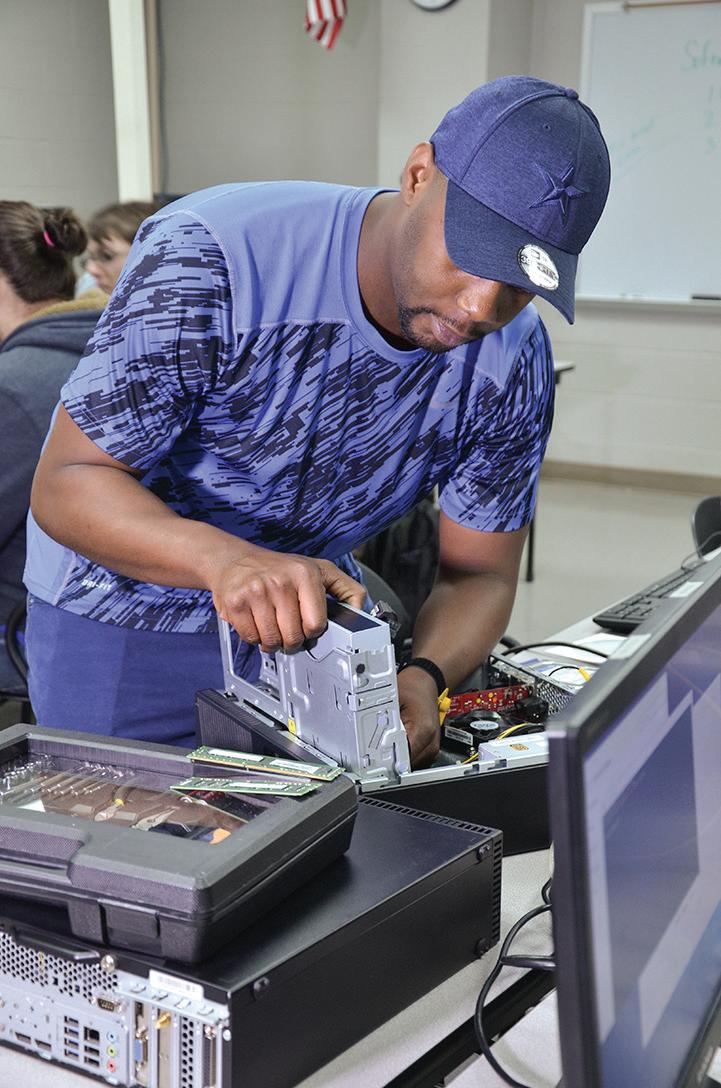
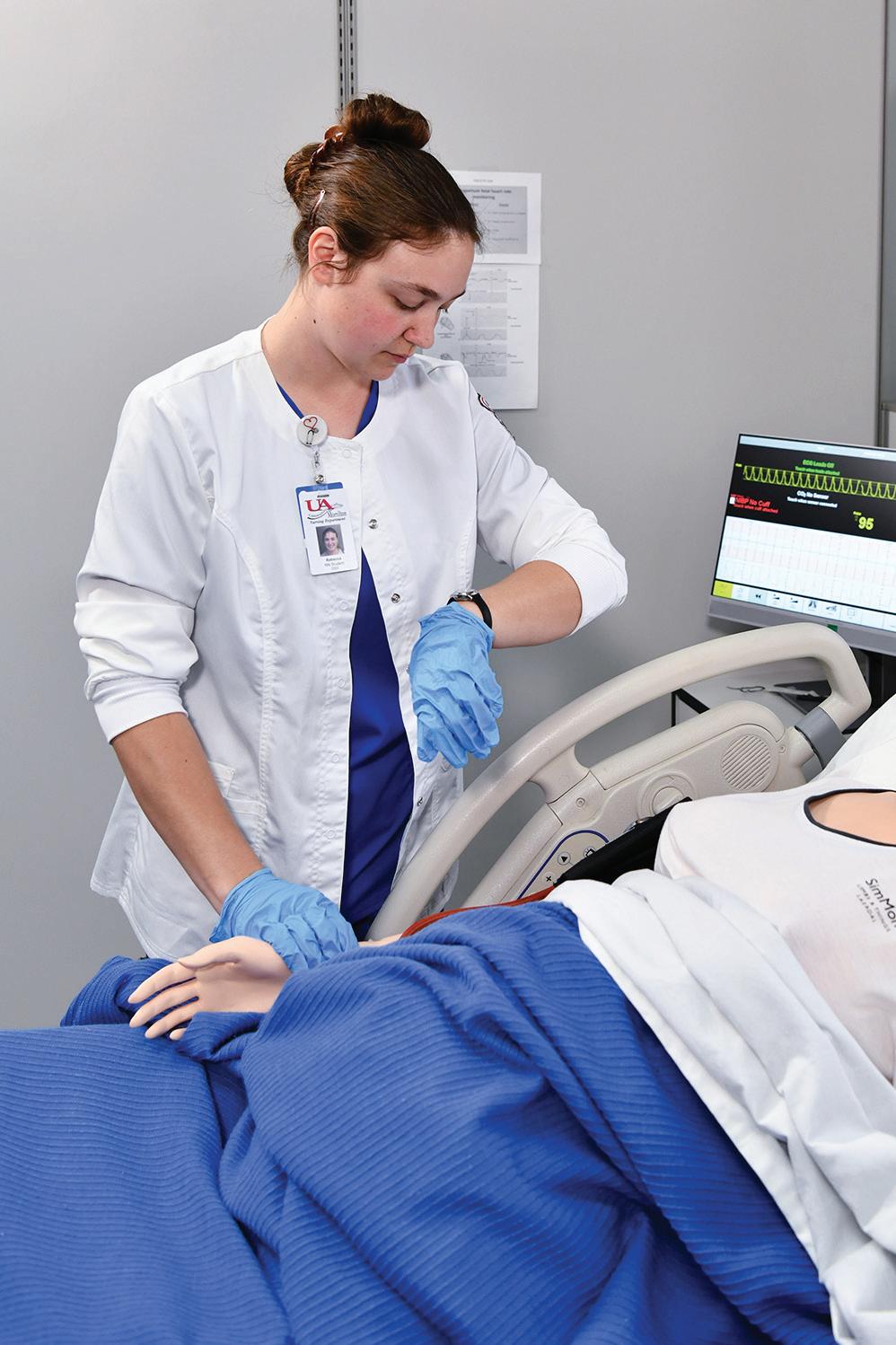

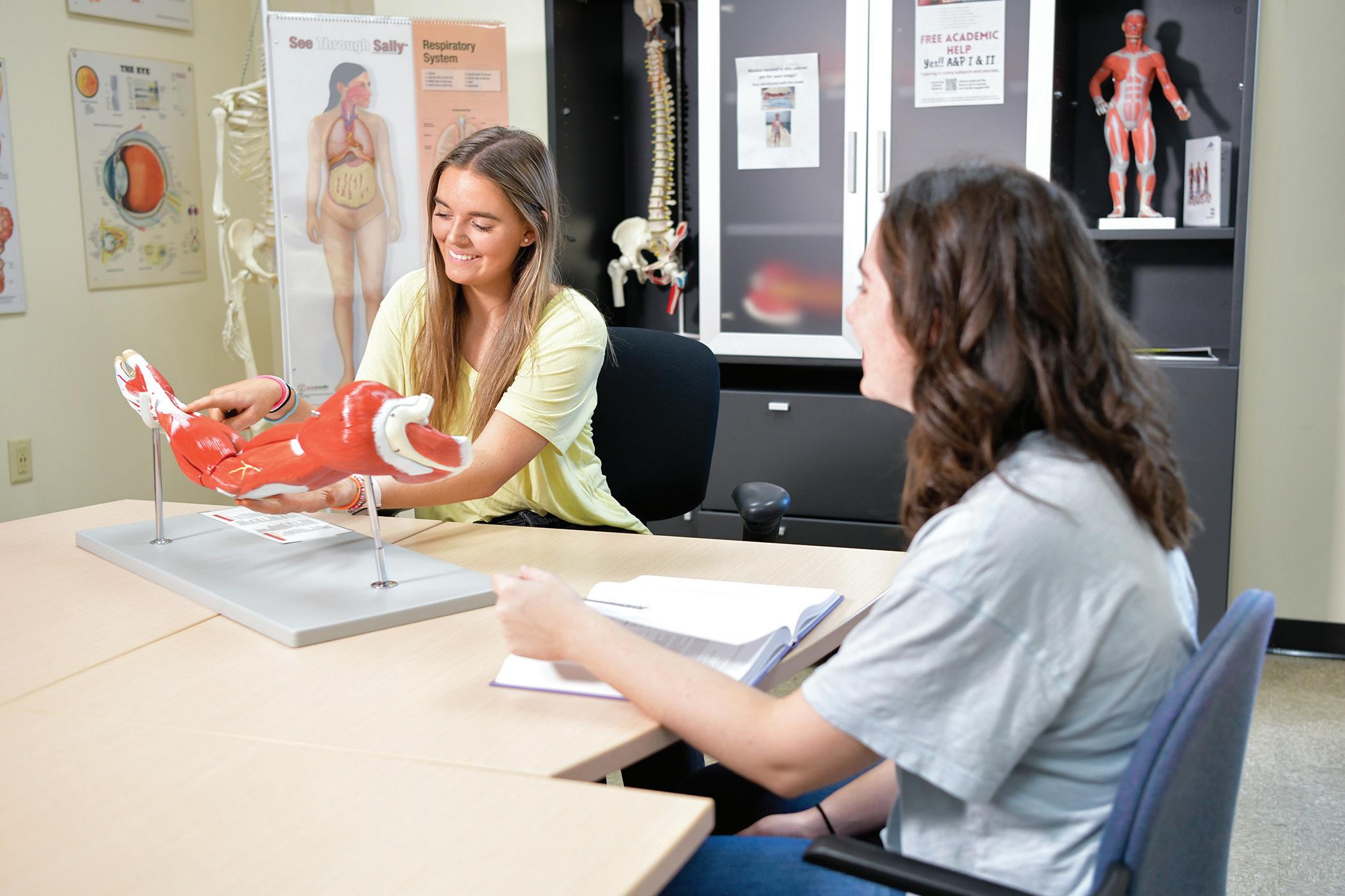



After nearly a decade of providing a guiding hand to the Arkansas Research Alliance, Sonja Yates Hubbard passes the torch of ARA Board of Trustees Chair to longtime board member Ritter Arnold.

Sonja's vision and passion for research has served our state in extraordinary ways. We're grateful to have Sonja's continued leadership on the Board, and we welcome Ritter to his new position as Chair.
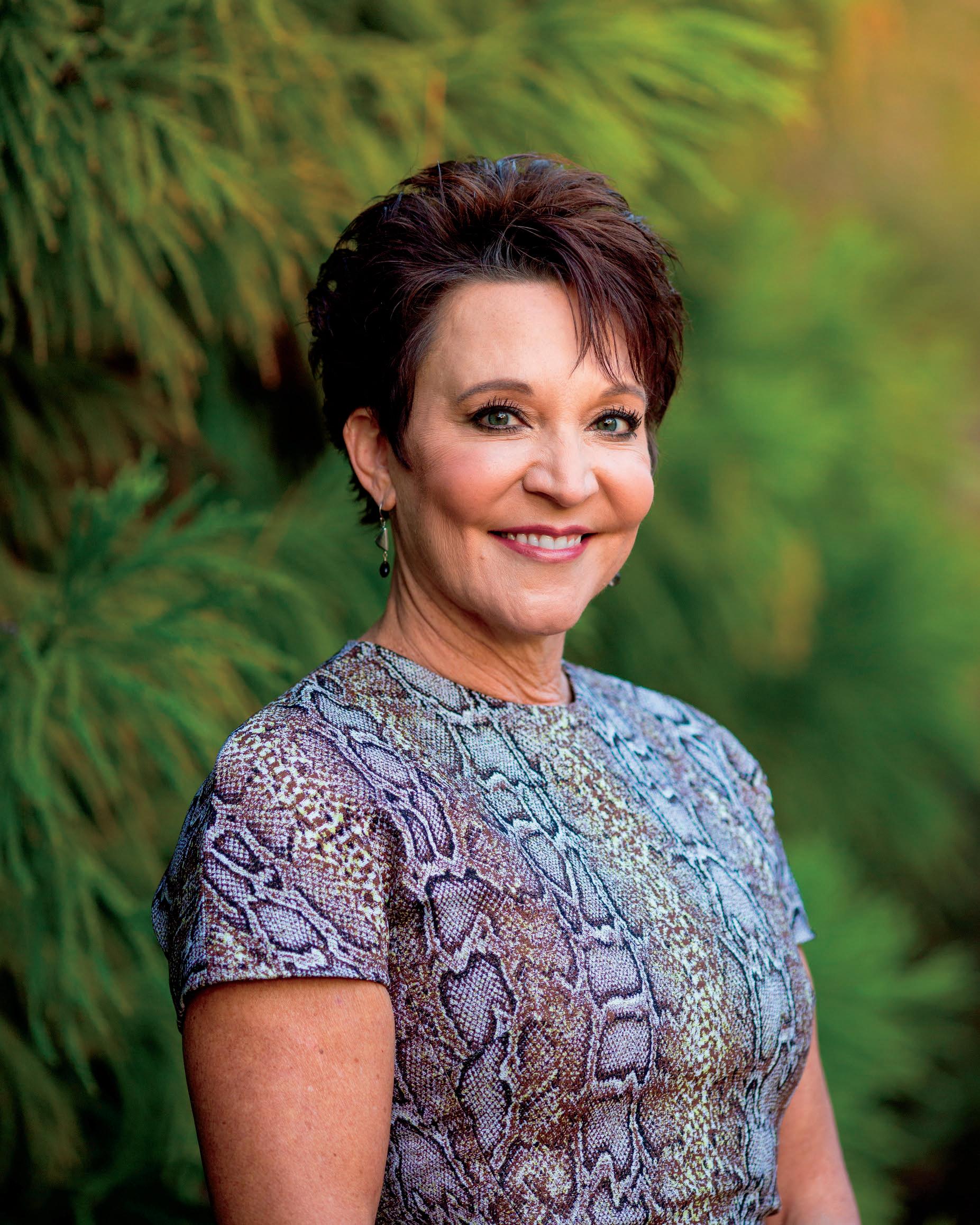 Ritter Arnold, E. Ritter & Company
Ritter Arnold, E. Ritter & Company
For contractors and their crews, it’s back to school this summer in Arkansas.
From the LEARNS Act legislative package passed this spring by the Arkansas General Assembly to the plethora of school construction projects underway across the state, it’s clear that education is a focus in The Natural State.
Historic Little Rock Central High School is undergoing $80 million in renovations, including the construction of a new science building and field house.

General science classrooms and laboratories will be placed on the first floor of the new classroom building, in addition to lecture halls and restrooms for a new baseball field. Chemistry classrooms and labs will be located on the second floor of the new building, with biology labs and robotics labs on the third floor.
The new building will be separated from the main school building by a plaza for students to gather in downtime and
at lunch.
A new two-story field house with an indoor practice field for football will be constructed on the south end of Quigley Stadium. It’ll include spaces for wrestling, spirit and pep teams, coaches’ offices, a weight room and locker rooms for multiple sports.
The Little Rock School District is working with Polk Stanley Wilcox Architects as well as Nabholz and Doyne Construction on the projects.
Little Rock busines owner Muskie Harris, a member of Central High’s Tiger Foundation, told AMP that the renovations are making the most of the school’s current footprint.
“We have to make the most of the property we have, although I suspect we’ll need to acquire land in the future because we’re landlocked,” he said. “We’ve got one gym for nine sports and over 2,000 students. You’ve got to provide the facilities for student activities to improve, and these new facilities
will definitely meet that need.”
Harris noted that the city’s success is tied to Central High.
“This community respects Central High. Just look at Quigley Stadium. You never see graffiti on the walls or surrounding buildings, even though there is graffiti in the surrounding community. Quigley Stadium doesn’t get defaced because people respect it. The community wants Central High to do well.
“I think certain renovations and improvements make the lights go off in peoples’ heads about things that we can continue to make better, and I think we’ll see a lot of great ideas come forward in the next two years.”
Other prominent education-related projects underway include the $60 million Alice Walton School of Medicine in Bentonville, $40 million in new student housing at Southeast Arkansas College in Pine Bluff and new facilities at Hot Springs and Pine Bluff high schools.

Meanwhile, the University of Arkansas recently held a topping out ceremony for the planned $114 million Institute for Integrative and Innovative Research, which will be home to exclusive research. The “I3R” will be home to a whole body calorimeter, which measures human metabolic performance in real time. There are less than two dozen of the devices in

North America.
CDI of Fayetteville is the construction manager for the project, and Bentonville’s Hufft is working with a Wisconsin firm on the architecture.
UA INSTITUTE FOR INTEGRATIVE AND INNOVATIVE RESEARCH
Owner: University of Arkansas, Fayetteville
Project Location: 793 W. Dickson St., Fayetteville
Valuation: $114 million
Target Start Date: Oct. 1, 2022
Target Completion Date: July 1,
Architect: HGA, Milwaukee, Wisc.; Hufft, Bentonville
Construction Manager: CDI, Fayetteville
ALICE WALTON SCHOOL OF MEDICINE
Owner: Crystal Bridges Museum of American Art, Bentonville
Project Location: 1001 N.E. J St., Bentonville
Valuation: $60 million
Target Start Date: March 1, 2023
Target Completion Date: Sept. 1, 2025
Architect: Polk Stanley Wilcox, Little Rock
General Contractor: Crossland Construction, Springdale
Civil/Consulting Engineer: McClelland Consulting Engineers, Fayetteville
Mechanical/Electrical Engineer: Henderson Engineers, Bentonville
Structural Engineer: Martin/Martin Consulting Engineers, Bentonville
Landscape Architect: Outdoor Spatial design, North Charleston, S.C.
SOUTHEAST ARKANSAS COLLEGE STUDENT HOUSING (The Reef)
Owner: Southeast Arkansas College, Pine Bluff
Project Location: 6811 S. Hazel St., Pine Bluff
Valuation: $40 million
Target Start Date: April 1, 2023
Target Completion Date: July 1, 2025
Architect: Chasm Architecture, Atlanta
General Contractor: Servitas, Irving, Texas
Builder/Developer: The P3 Group, Memphis
HOT SPRINGS HIGH SCHOOL (phase 1 – new school)
Owner: Hot Springs School District
Project Location: Emory Street, Hot Springs
Valuation: $37.5 million
Target Start Date: May 1, 2023
Architect: French Architects, Hot Springs
Construction Manager: Hill & Cox Corp., Hot Springs
Civil Engineer: Morrison-Shipley Engineers, Bentonville
PINE
HIGH SCHOOL (new school)
Owner: Pine Bluff School District
Project Location: 711 W. 11th St., Pine Bluff
Valuation: $37.5 million
RFQ Publish Date: Feb. 27, 2023
Architect: Cromwell Architects Engineers, Little Rock
UAPB STUDENT ENGAGEMENT CENTER
Owner: University of Arkansas at Pine Bluff
Project Location: 12 Watson Blvd., Pine Bluff
Valuation: $33 million
Target Start Date: Dec. 17, 2022
Architect: AMR Architects, Little Rock
General Contractor: CDI Contractors, Little Rock
Civil Engineer: Crafton Tull, Russellville
Structural Engineer: Engineering Consultants, Little Rock
Electrical/Mechanical Engineer: Pettit & Pettit Engineers, Little Rock
Consultant: Theatre Consultants Collaborative, Chapel Hill, N.C.
WATSON CHAPEL HIGH SCHOOL (new school)
Owner: Watson Chapel School District, Pine Bluff
Project Location: 3900 S. Camden Rd., Pine Bluff
Valuation: $23 million
Design Publish Date: May 27, 2023
Target Start Date: Sept. 1, 2024
Architect: Lewis Architects Engineers, Little Rock
General Contractor: Baldwin and Shell, Little Rock
Structural/Mechanical/Electrical Engineer: Lewis Architects Engineers, Little Rock
LR CENTRAL HIGH SCHOOL (new science building and field house)
Owner: Little Rock School District
Project Location: 1500 S. Park St., Little Rock
Valuation: $20 million
Target Start Date: June 1, 2023
Construction Manager: Doyne Construction, North Little Rock; Nabholz, Little Rock

LYON COLLEGE INSTITUTE OF HEALTH SCIENCES
(dental and veterinary schools)
Owner: Lyon College, Batesville
Project Location: existing Heifer building, 1 World Ave., Little Rock
Valuation: $20 million
Schematics Publish Date: Feb. 22, 2023
Architect: Cromwell Architects Engineers, Little Rock
ASU WINDGATE HALL (art and innovation facility)
Owner: Arkansas State University, Jonesboro
Project Location: ASU campus, Jonesboro
Valuation: $17 million
RFQ Publish Date: April 13, 2023
NORTHWEST TECHNICAL INSTITUTE NURSING/ MEDICAL TECHNOLOGY CENTER
Owner: NTI, Springdale
Project Location: 709 S. Old Missouri Rd., Springdale
Valuation: $15 million
Target Start Date: Aug. 1, 2023
Architect: Wittenberg, Delony & Davidson, Fayetteville
UAMS CHILD DEVELOPMENT CENTER RENOVATION
Owner: University of Arkansas for Medical Sciences, Little Rock
Project Location: South Monroe Street, Little Rock
Valuation: $10 million
Target Start Date: Sept. 1, 2022
Target Completion Date: July 1, 2024
Architect: Fennell-Purifoy Architects, Little Rock
General Contractor: CR Crawford Construction, Fayetteville
Civil Engineer: Ecological Design Group, Little Rock
Mechanical/Electrical Engineer: Brown Engineers, Little Rock
Structural Engineer: Engineering Consultants, Little Rock
Reprographer: Southern Reprographics, Little Rock
NORTH ARKANSAS COLLEGE
(Robotics and Manufacturing Innovation Building)
Owner: North Arkansas College, Harrison
Project Location: 1515 Pioneer Dr., Harrison
Valuation: $8 million
Target Start Date: March 1, 2023
Target Completion Date: June 1, 2024
Architect: Tim Risley & Associates, Fort Smith
Construction Manager: Clark Contractors, Little Rock

KIRBY HIGH SCHOOL (new gymnasium)
Owner: Kirby School District, Kirby
Project Location: 2614 Arkansas 27, Kirby
Valuation: $7.5 million
Target Start Date: March 1, 2023
Architect: French Architects, Hot Springs
Construction Manager: Moser Construction, Bryant
Civil Engineer: B&F Engineering, Hot Springs
Mechanical/Electrical Engineer: Brown Engineers, Little Rock
Structural Engineer: Engineering Consultants, Little Rock
Reprographer: Southern Reprographics, Little Rock
HOT SPRINGS HIGH SCHOOL (phase 2 – new gymnasium)
Owner: Hot Springs School District
Project Location: Emory Street, Hot Springs
Valuation: $4 million
Schematics Publish Date: Nov. 9, 2022
UCA CAMPUS MINISTRY CENTER
Owner: University of Central Arkansas, Conway
Project Location: UCA campus, Conway
Valuation: $3 million
Target Start Date: Sept. 1, 2022
Architect: H+N Architects, Conway
General Contractor: Nabholz, Conway
ARKANSAS SCHOOL FOR MATH, SCIENCES AND ARTS
(Administration Building)
Owner: ASMSA, Hot Springs
Project Location: 200 Whittington Ave., Hot Springs
Valuation: $2.25 million
Target Start Date: Nov. 1, 2022
Architect/Civil Engineer: Harris Architecture, Hot Springs
Civil/Consulting Engineer: McClelland Consulting Engineers, Fayetteville
Mechanical/Electrical Engineer: BDS Energy, Austin (Lonoke County)
Structural Engineer: Engineering Consultants, Little Rock
ANNOOR ACADEMY (new middle and high schools)
Project Location: 2300 S.E. C St., Bentonville
Valuation: $2 million
Target Start Date: June 1, 2023
Architect: Key Architecture, Fayetteville
Construction Manager: Clinard Construction Management, Bentonville
Civil Engineer: Morrison-Shipley Engineers, Bentonville
Source: Dodge Construction
With 75 years of collaboration with Arkansas schools, Nabholz knows we’re not just building structures. We’re building futures. Nabholz is proud to work with Arkansas schools to support the next generation of students with upgraded facilities built to put education first.




Four of the top 10 largest public school districts in Arkansas are located in Benton and Washington counties, and if one counts Fort Smith as part of an extended Northwest Arkansas, then half of the top 10 hails from the region. The other half is located in the greater Little Rock metro. Below, AMP lists the top 25 public districts in the state (not including charter schools) by enrollment for the 2022-23 school year. Each district is listed with information about its current superintendent.
Dr. Jared A. Cleveland // Springdale School District // 21,801

Dr. Jared Cleveland previously served as deputy superintendent in Springdale from 2013-2020. Cleveland has worked in public education for the past 27 years. Prior to joining Springdale schools, he served in the Arkansas Department of Education and as superintendent of the Lavaca and Magazine districts.
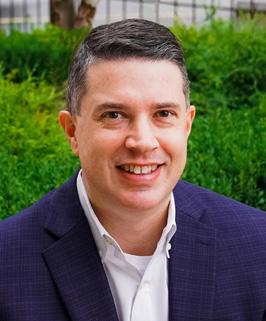

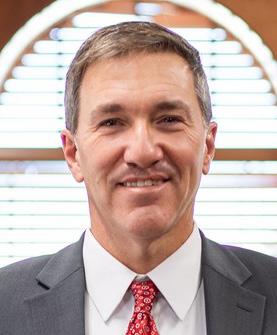
Dr. Jermall Wright // Little Rock School District // 20,135
The Little Rock School District welcomed Dr. Jermall Wright as superintendent following the retirement of Mike Poole at the end of the 2021-2022 school year. Wright previously served as the founding superintendent of the Achievement School District in Mississippi.
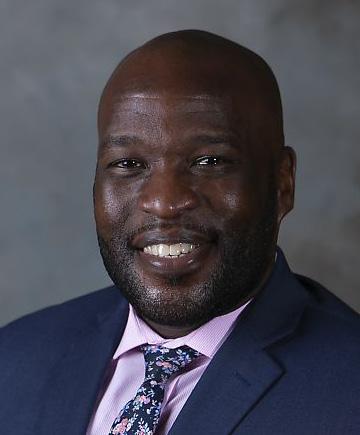
Dr. Debbie Jones // Bentonville School District // 18,674

Dr. Debbie Jones previously served in the Arkansas Department of Education, as assistant superintendent for the Bryant School District and as principal of Bryant High School. She worked as a teacher, assistant principal, principal and secondary director for the Pulaski County Special School District.
Dr. Jeff Perry // Rogers School District // 15,665


Dr. Jeff Perry serves as superintendent of Rogers schools, responsible for more than 15,600 students and 2,000 staff members. Perry previously served as the superintendent of the Hamblen County School District in Tennessee, and has been an educator for 35 years — 18 of them as a superintendent. He began his professional career as a high school teacher and coach in Norton, Va.
Dr. Terry Morawski // Fort Smith School District // 13,829
With more than 20 years of experience in public education, Fort Smith Superintendent Dr. Terry Morawski has held a variety of roles including deputy superintendent, assistant superintendent, COO and director. In Fort Smith, he has been part of the leadership team for the Strategic Planning process, Citizens Millage Committee and the Citizens Capital Improvement Program Advisory Committee.
Dr. Charles McNulty // Pulaski County Special School District // 11,787
Dr. Charles McNulty just completed his fifth year as superintendent of the Pulaski County Special School District in Little Rock. The PCSSD district serves a highly diverse student population of more than 12,000 students across 25 schools. Prior to accepting the position in 2018, McNulty worked as associate superintendent for the Waterloo Community School District in Iowa.
Dr. John Mulford // Fayetteville School District // 10,426
The Fayetteville School District recently named Dr. John Mulford as superintendent following the departure of Dr. John L. Colbert. Mulford previously served as the deputy superintendent of operations for Springfield Public Schools in Missouri.
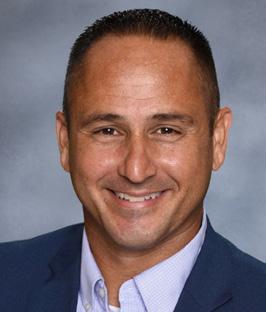
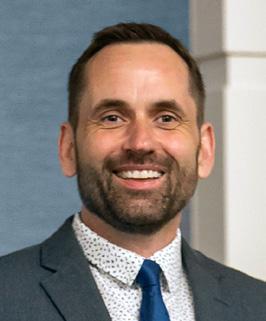
Dr. Tony Thurman // Cabot Public Schools // 10,361
Dr. Tony Thurman has worked in the field of public education for more than 30 years and was named superintendent of Cabot Public Schools in May 2007. In 2015, Thurman was named Arkansas Superintendent of the Year by the AAEA.
Dr. Jeff Collum // Conway Public Schools // 10,001
Dr. Jeff Collum became the superintendent of Conway Public Schools in July of 2021. Collum worked as a superintendent for nine years in Hallsville, Texas, and Benton before coming to Conway. Prior to becoming a superintendent, he was the executive director of secondary education for the Tyler (Texas) ISD.

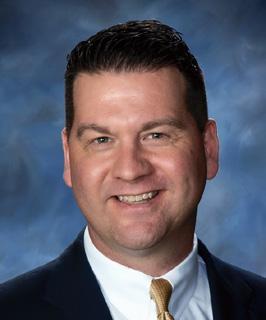
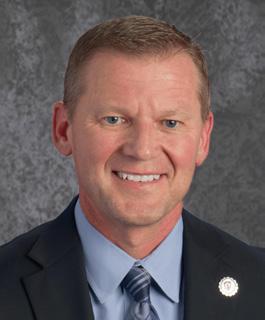
Dr. Karen Walters // Bryant School District // 9,607
Dr. Karen Walters has been the superintendent of the Bryant School District for a decade. She is a member of Arkansas Association of Educational Administrators, Bryant Rotary and Bryant Chamber Board of Directors.
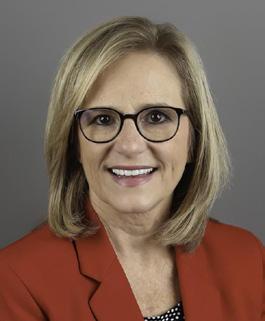
Dr. Gregory J. Pilewski // North Little Rock School District // 7,640

Dr. Gregory Pilewski became the superintendent of North Little Rock schools in November 2020 as COVID raged. He joined the NLRSD from Queen Anne’s Public Schools in Maryland, where he served as deputy superintendent.
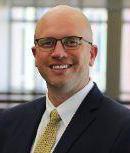
Dr. Kim Wilbanks // Jonesboro School District // 6,398
During her 13-year tenure with the Jonesboro district, Dr. Kim Wilbanks has provided vision and guidance to the district’s 13 campuses and 790 employees. During her tenure, student population has increased by more than 2 percent each year.
Dr. Kim Anderson // Benton School District // 5,723
Dr. Kim Anderson has been in education for 29 years as a teacher, coach, library media specialist, technology coordinator, school improvement specialist and professional development coordinator. She previously served as an instructor at Arkansas State University, Black River Technical College and Arkansas Northeastern College.
Dr. Harold Jeffcoat // Van Buren School District // 5,506
Dr. Harold Jeffcoat has been the superintendent of Van Buren School District in since 2015. Jeffcoat previously served as deputy superintendent of the Cabot School District.
Dr. Ginni McDonald // Russellville School District // 5,412
Russellville Superintendent Dr. Ginni McDonald has more than 25 years of experience in public education and academic leadership. In 2016, she was named the NASSP 2016 Secondary Principal of the Year.
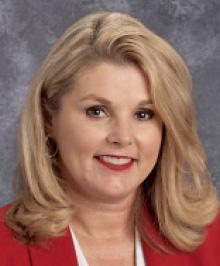
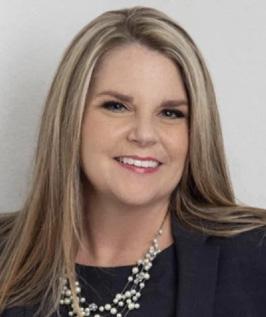
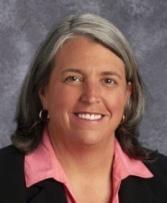
Dr. Terrence Brown // West Memphis School District // 4,829
Dr. Terrence Brown was named superintendent of the West Memphis School District earlier this year. He previously served as the deputy superintendent for the Forrest City School District.
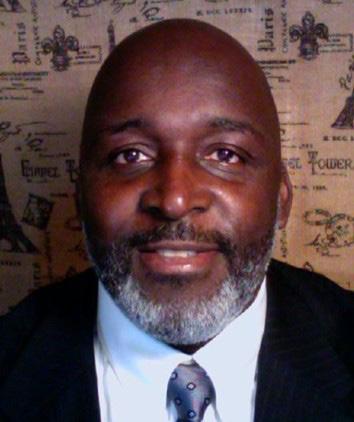
Jody Wiggins // Siloam Springs School District // 4,463
Jody Wiggins has served the students of Siloam Springs in some capacity since 2002. He started his career in the district as high school assistant principal and athletic director. He has also served as high school vice principal, federal programs coordinator and assistant superintendent. Wiggins was named superintendent in 2019.
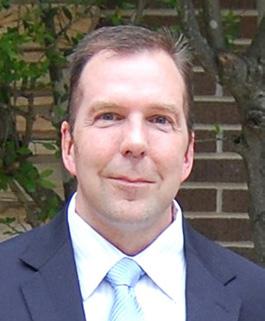

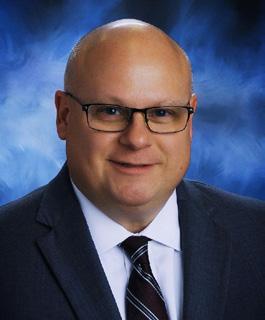
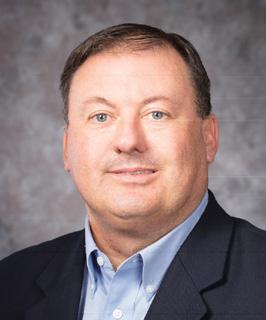

Dr. Jeremy S. Owoh // Jacksonville North Pulaski School District // 4,248
Dr. Jeremy Owoh’s career in education started as a high school English teacher and he has served as a dean; assistant principal; principal; assistant superintendent of curriculum, instruction and desegregation; and assistant commissioner of educator effectiveness and licensure.
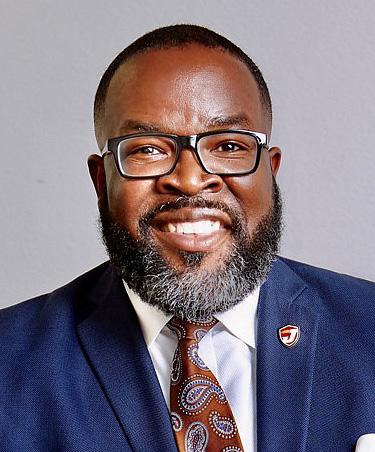
Dr. Karla Neathery // Sheridan School District // 4,246

Dr. Karla Neathery was named superintendent of the Sheridan School District in 2022. She has almost 30 years of experience in education. Her career began as an elementary school teacher at Salem Elementary in the Bryant School District in 1992.
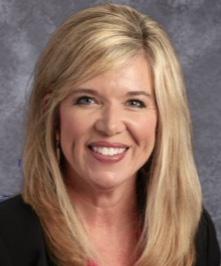
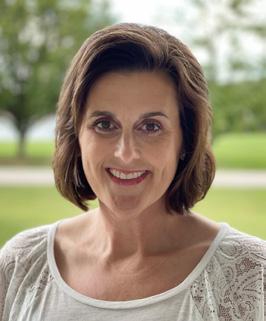
Shawn Higginbotham // Lake Hamilton School District // 4,031
Shawn Higginbotham has been with Lake Hamilton district since 2001 and has served as high school assistant principal and junior high principal. The Hamburg native graduated from the University of Arkansas at Monticello and earned a master’s degree in educational administration from what is now the University of Louisiana at Monroe.
Jim Tucker // El Dorado School District // 4,004
Jim Tucker was the principal at Retta Brown Elementary and El Dorado High School before taking over as deputy superintendent in 2013. He was principal when the new high school opened in 2011. Tucker graduated from Southern Arkansas University and holds a master’s degree in education administration from Texas A&M.
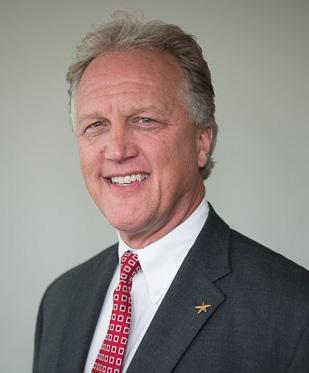
Dr. Bobby Hart // Searcy School District // 4,003
Dr. Bobby Hart has been the superintendent for the Searcy School District since 2021. Hart previously served as the superintendent at Hope Public Schools and has experience as a building principal, athletic director, coach and classroom teacher. Hart earned his undergraduate and master’s degrees from Henderson State University and his doctorate in education from Texas A&M.
John Ciesla // Greenwood School District // 3,882
John Ciesla has served as the superintendent of the Greenwood School District since 2013, having served as assistant superintendent since 2006. He previously worked as the superintendent of the Lavaca School District and as a coach and teacher at Hector High School. Ciesla earned his master’s degree in educational leadership and his education specialist degree in education administration and supervision from Arkansas Tech.
Allyson Dewey // Mountain Home School District // 3,856
Allyson Dewey begins her tenure as the superintendent of the Mountain Home School District this year, after serving as assistant superintendent since 2022. Dewey was previously the principal of Hackler Intermediate School and assistant principal at Pinkston Middle School. Dewey obtained her bachelor’s degree from the UCA and her master’s degree in school administration from Arkansas State University.
Dr. Glen Fenter // Marion School District // 3,842
Dr. Glen Fenter has been the superintendent of the Marion School District since 2017. Fenter previously served as the president of Mid-South Community College, a position he held for over 20 years, and worked as a coach and teacher in Alma. A graduate of Hendrix College and the University of Arkansas, Fenter has also chaired the Arkansas Association of Two-Year Colleges.
It’s a bright Saturday, and across all of its locations, Sissy’s Log Cabin is jumping. Love is in the air and palpably so, as hundreds of customers come and go throughout the day, each representing a different stage de l’amour.
Over here, a young man’s head spins as he pores over the selection in search of the perfect engagement ring. Over there, there and there, couples’ eyes shine like the wedding sets women try on, the Big Day suddenly feeling very close and real. And sprinkled throughout, the silver couple who was in the youngsters’ shoes 30, 40, even 50 years ago and whose covenant shines still.
A Sissy’s Log Cabin experience is like entering a literal jewel box where everything sparkles, including the elegant and attentive service of the staff. Marguerite “Sissy” Jones,
,the indomitable founder of the company and matchmaker to thousands, would have it no other way.
“We have nine objectives on my wall out [in the stores]. They’re not negotiable,” Jones said. “These things that are on that wall, if you don’t do it, you’re not going to be here. Care about your customer. Give them good service.
“I don’t expect you to do something I wouldn’t do. I would say I expect you to do your work. I don’t expect any more than that, but I want you to do your work.”
By Dwain Hebdaabout my mother, Mary Amelia Champion Robinson, was as a strict disciplinarian,” Jones said. “When I tell you she’s strict, ooooooh. A’s were acceptable in school, anything else, you’d better not bring it in this house. On Saturdays, when the rest of the kids got to go out and play, we had to work. You did all your jobs on Saturday, and she had a number two washtub, sprinkled down with starch. I had to iron; I was a good ironer.”
The first thing is to greet someone when they first come in the door. Otherwise, they feel like they’re in the wrong place, someplace they can’t afford. You can’t be pushy, and you can’t be overbearing. If you treat a person right and you’re good to them and your prices are fair, then you don’t have any problems.
Of all the elements that have coalesced to make Sissy’s Log Cabin the largest family-owned jewelry store in the mid-South, “doing the work” might well be the most salient. Founded in a rotting log cabin in Pine Bluff as an antique shop, jewelry was an afterthought for the first few years of the business. Far off from those days was expansion (the first of five additional locations not coming online until decades later) or coining one of the most famous taglines in Arkansas retail history: “Life’s too short for ordinary jewelry.”
For people who come in and say, ‘I’m just looking,’ I say, ‘Good, I’ve got something to show you in my back counter.’ I’m not going to let you use that excuse. You’re not just looking, or you wouldn’t have made the trip out here. I’m not dumb. I know you’ve made a trip, so I want to entertain you, and I want you to have a good experience while you’re here.
But the work ethic that would lead the company through its growing pains and tough times, persevering over bad economies, snickering naysayers and changing tastes, was there from the beginning. As in, all the way back to the beginning.
“What I remember most
Along with her work ethic, Jones developed a headstrong nature, something that would serve her well in the male-dominated and often cutthroat world of business. But it also frequently led her into misadventures with her sister, Netta, most times as antidote to the boredom they felt growing up in Gillett, a small Arkansas County town known for its annual Coon Supper and little else.
“I was born in San Antonio, Texas, and stayed there until I was 10 years old,” Jones said. “When we moved to Gillett, a little bitty town that had 500 people in it, one main street, Netta and I were bored to death. Oh, it was horrible, horrible. I just can’t tell you how we felt, but we were always in trouble.”
One particularly enterprising piece of mischief from those days happened during an annual community poppy drive for which Mary Robinson had signed up her daughters as salesgirls.
“She took us up there at 9 in the morning and picked us up at 5, and we’d better not have a poppy left. If we did, we got in trouble,” Jones said. “So, we sold those poppies. I’m going to tell you something, I got sick of poppies, but I sold them. I had sold mine by noon, and then I had all afternoon to do what I wanted to do.
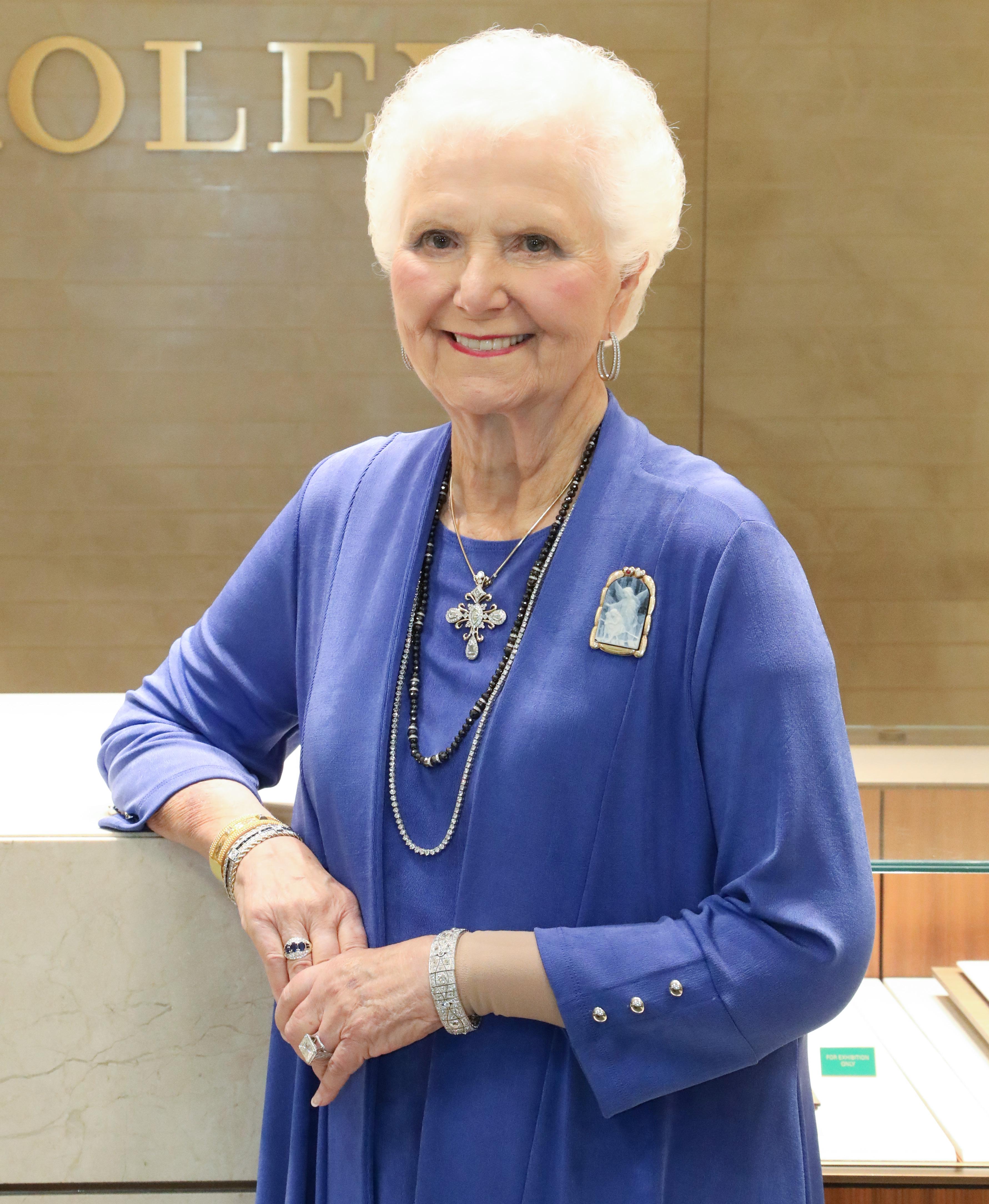
“I saw this grocery store down there, and they had those Hostess cupcakes, two for a nickel. I thought, boy, that’s something. I went in and bought 10 of them with my allowance. Put them in little plastic sacks, and I sold them for 10 cents each. I made all kinds of money from those cupcakes. I had a pocketful of money, and I was so proud of myself until my mother got there. She says, ‘Did you sell all your poppies?’ ‘Yes, ma’am. And I’ve got a surprise for you. I made myself some money today.’ My Lord, I thought she was going to come apart.”
Jones’ mother made her give all the money back and suspended her allowance to boot (“I thought that was awful,” she said. “I never did get over that.”) but somewhere in her psyche, the die had been cast. This spunky little transplanted Texan could sell.
“I saw an opportunity to make some money and I sold them,” she said of that first epiphany. “They wanted the cupcakes, they were happy. And one person even came back for some more. That was my first selling experience.”
After high school, Jones enrolled at the University of Arkansas at Monticello, then called Arkansas A&M College, where she’d soon meet her husband, Murphy Jones. The couple married in 1957 and moved to Atlanta, where he attended Georgia Tech University, then came home to Pine Bluff in 1960 to work for the local power company.
Along the way, Sissy Jones became a licensed interior decorator and antiques appraiser, eventually generating enough business to operate out of her living room. The setup didn’t meet with Murphy’s approval, so he told her to get the menagerie out of there, thus unwittingly putting Arkansas business history in motion. On errands one day, Sissy happened to spot a decrepit log
cabin that was scheduled for demolition and saw her future so clearly it stopped the car in its tracks.
“Oh, it was so primitive, and the people were already taking the windows out of it,” she said. “I could tell they were fixing to take it down, so I drove up there, and that grass was this tall. I drove kind of close to it so I wouldn’t get a snake bite. I went up on the porch, and the porch was so bad with termites it was cracking when I held onto the post.
“I went in, and I said, ‘What y’all doin’?’ One of the guys says, ‘Well, we’re tearing this down. Mr. Sanders said it’s an eyesore, and he either has to improve it or tear it down because of city code or something.’ I said, ‘Where is he?’ He gave me his telephone number, and I said, ‘You just take a break now. I’m going to go over there and make a phone call at the doughnut shop.’”
You never, ever quit. My mother had this red book by her chair, and as a child, she read it to me. It was the story of that little train that went up the hill — you can do it, you can do it, you can do it. After I started the business, when I walked in, she had that book in her hand, and she said, ‘See this? You better do it.’ That put a little fear in me, so in my mind, it was always, ‘I cannot fail.’
there.’ So, we got up and we went over there, and he said, ‘What have you done?’ I said, ‘I bought me my business.’”
Jones called the owner from the shop, who was flabbergasted at her offer to rent the place, insisting it was not livable with no heat or air, only rudimentary sewer service and barely holding together. Reminiscent of her cupcake selling days, Jones effectively deflected all objections, and the owner caved to the tune of $50 per month. The deal done, Jones called her husband.
“I called and asked if he could come during his lunch hour, and he said yes. We met over there at the doughnut shop, and I said, ‘Isn’t it nice out here? It’s so peaceful. Look at that old log cabin over there.’ He said, ‘What about the log cabin?’ ‘Well, let’s just go over
Most people are not going to tell you, ‘I can afford to buy that $50,000 one over here.’ A man came in the store from Texas, and he had on overalls. He said, ‘I want to see something.’ Well, what are you going to look at?’ He said, ‘I guess I’m going to see that right there.’ It was a diamond, it was $10,000. ‘This is an engagement ring. Is that what you’re in the market for?’ He said, ‘Yup, got anything else? Let me see this over here.’ He was going up in price, not down. That gives you a clue right there of how you cannot judge anyone by the cover that they’re showing you.
Like all entrepreneurs, Jones saw great potential in the 600-square-foot cabin, warts and all, and wasted no time selling that vision to anyone who she thought would help her get it where it needed to be. Friends pitched in, some sold on her idea, others fearing for her sanity, and all plied with bologna and mustard sandwiches for their trouble. She didn’t go undefeated in her campaign — a fellow church member who was a banker turned her down flat for a $1,500 loan to start up, leading her to a relative for the funds.
“I called my aunt, and I said, ‘I’m going to start my own business, and I just need rent money and some restoration money to fix it up.’ She said, ‘What kind of business?’ I said, ‘A junk store, antiques.’ She said, ‘Oh, Sissy, please.’ I said, ‘I’ll pay you back as quick as I can. I won’t leave you with this note. I will pay it even if I have to dig ditches on weekends. I will do it.’ She knew I would because I was very determined. So, she said, ‘OK.’”
When Sissy’s Log Cabin opened its doors in 1970, Jones had pulled off the impossible. But the ride was just beginning and as she quickly found out, it’s all fun and games until you start taking market share
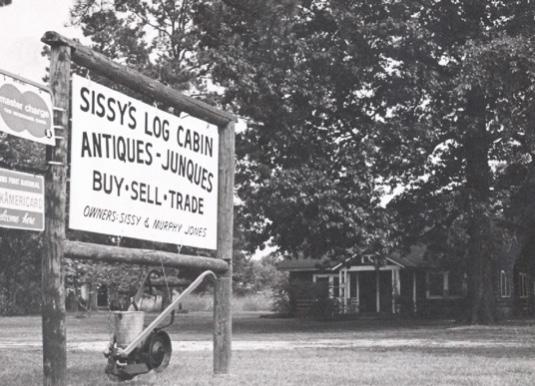
from someone else.
“In 1970, a woman going into business was not a popular thing,” she said with an edge to her voice. “But I paid my aunt back that money I borrowed in six weeks. And then when rent went up from $50 to $60 a month, it made me mad, so I bought all that property and the land.”
Sissy’s Log Cabin would shift from antique furniture to jewelry-only after a fateful conversation Jones had with her son, Bill, now head of the company. One day, after lugging around rolltop desks in the dead of summer, he asked his mother what she was going to do when she was too old for the heavy lifting. By 1975, the store changed inventory and became the blueprint for everything that was to come, right down to incorporating log-cabin-themed elements into future store designs.
The merchandise might have been lighter, but the hours were just as long and the pressure just as intense. Jones faced other challenges away from work, struggling for balance as had generations of working women before and since.
“When you have the joy and the passion to do something, you put everything you’ve got into it, but I also had two children at home,” she said. “Murphy took Bill to every ballgame. He never missed anything with Ginger. I didn’t neglect them, but it was me who always had to be gone once I got the business started. I’m reading one of Danielle Steele’s books now that she did the same thing as a working mother, and that comforts my guilt feelings some.”
Whatever difficulties Jones faced in the periphery of her career, the things that made Sissy’s Log Cabin what it was never went out of focus. Her culture was simple, but inviolate: Sell them with courtesy, sell
them with expertise, but most of all, sell them. Her sales technique became a master class, a sophisticated rote process that rolls off the tongue as easily as gossip over tea, rooted in exacting knowledge of the merchandise, a born-in understanding of humanity and the communication chops to turn browsers into buyers.
“I had an apron I wore with three pockets in front — hold, sold, maybe so,” she said. “If you looked at something I thought you might want, I would take and put it in there, and at the end I’d say, ‘You looked at this and this. Do you think you still like those?’ ‘Well, I can only buy one thing.’ ‘OK, we’ll put this one on hold. You know, I have the earrings and a pendant to match that, too.’ ‘OK, let me see that.’ So now, we have a wish list.
If you ask me what’s the one thing that really made my business work, it’s the Lord. So, we pray before we open the store in the morning. Our first 30 minutes are dedicated to a devotional, and we have a prayer together and bless those people that are sick. It’s important to pray, but I’ll also tell you this: When you take out of a community, you need to give back to that community. It’s like tithing at church; as poor as I might be, I’m still going to give you money, and that became more evident for me the older I got. I believe in doing all these things.
the most discriminating customer.
Jones talks of such things in tones by turn proud and incredulous, most thankful for the many family members involved with the business, sharing in its success and writing its next chapter.
“In sales, the answer’s yes; what’s the question? You have to treat everyone like they’re a supreme being. At the same time, you have to have the knowledge to get the customer where they want to go. If they only want to spend $125, I’m going to help them have a $125 ring.”
These days, after surviving cancer and other ailments, Jones’ routine has slowed even if the business hasn’t. After years of digging in her heels against it, she finally relented to opening a second location — in Little Rock’s Heights neighborhood — in 2009, followed in short order by stores in Conway, Jonesboro and West Little Rock. Sissy’s also entered Memphis, where business has been so good it’s led them to think even bigger, spending millions on a new space that will dazzle even
“I didn’t do this by myself,” she said. “I had a lot of people that liked me, that helped me and wanted to work.”
It’s a common thing today to describe someone’s work as having it in the blood. In Jones’ case, that’s literally true, and as a woman of deep faith, she sees that both as a gift and a sign she’s doing what the Almighty anointed her to do from the day she was born.
“I had this good friend from Mena, Arkansas, who owned a jewelry store,” she said. “He had retired, and we became good friends. He showed me how you looked at a diamond, how you have to know if a piece is gold or gold-filled and all this stuff. One time, he had on a ring, and he handed it to me and said, ‘Now, this is gold.’ I said, ‘How am I going to know that from gold-filled?’ He said, ‘What’s that on your hand?’
I loved the antique business, but I had to do everything to make a living. When things got slow, I sent a letter out to all these lawyers in town who needed help because their client bought this house and thought it was full of junk. It wasn’t junk, it was worth some money, so I gave them the spiel on how I could show them what it was worth. I would refinish furniture from 4 in the morning until I opened, because I didn’t really need a lot of sleep, and my mother would get the kids off to school. I taught over here at the tech school for a while. I also had a drapery business over on 38th Street, with the president of Arkansas Power and Light’s wife. She made all the drapes, and Murphy hung them at night. Anything to make a dollar.
As she tells the story, Jones rubs a gold pendant against her finger. The flesh turns a shade of charcoal.
“Turns out, I was allergic to gold, and sterling silver is worse. I can blacken this whole finger if I want to. I don’t have to test gold, and it works every time — 10K, 18K, 14K, it turns blacker and blacker. I thought ‘Well, that’s just wonderful. I guess I’m supposed to be a jeweler.’
Who are Arkansas’ most influential up-and-comers? Who are the future drivers of the Arkansas economic engine, of policy and culture? Readers helped us determine who the state’s real drivers are shaping up to be.
Arkansas Money & Politics is proud to showcase its Future 50 for 2023.
The Future 50 represents those Arkansans — business, political, cultural leaders — recognized by AMP readers as poised to do big things in their fields.
They could be up-and-comers, business leaders already established or industry veterans who have switched fields. But they all share one thing in common — from them, big things are expected. This year’s Future 50 honorees run the gamut of Arkansas industry from banking to baseball. These 50 exceptional Arkansans are highlighted on the pages that follow.
For all of the new ideas and energy a younger face can bring to a given industry, there is some essential knowledge that can only come with time and experience. Luckily for Garland Rice IV, his introduction to the world of trucking came in childhood, giving him a head start and allowing him to learn the transportation business like the back of his hand.
“Working in the shop and maintaining the grounds was my introduction to my career path,” Rice said.
It’s a path not unlike the one his father, Garland E. “Butch” Rice, took himself. Butch worked his way up starting as a teenager, from cleaning the bathrooms at a trucking company and spending 10 years in sales to starting his own company, Stallion Transportation Group, in 1992. No stranger to the lessons learned through hours of hard work, Butch made sure his son would also benefit from that bottom-up approach.
Being raised around his father’s company — and gaining the kind of insight that is only won by showing up for the job day in and day out — made Rice’s career choice an easy one. After a year of college, he joined the Stallion team full time.
“My first job assignments were working in each department of the company for a minimum of three months, or until I could complete all functions of that department,” he said. “I am still completing that assignment.”
In his current role as vice president of the multimillion-dollar company, Rice oversees a variety of different functions. From customer service and day-to-day freight movement operations, to keeping tabs on the safety department and purchasing upwards of $10 million in trucks and trailers annually, suffice to say he has no shortage of hats to wear. Rice relies on his years of on-the-job training, plus the wisdom of his father, to ensure he’s always doing what’s best for employees and customers alike.
Like any business-minded leader, Rice’s long-term vision for Stallion centers on the continued growth of the company. Staying on the upward path is easier said than done in the best of times, though, and with a labor shortage and other hiccups shaking up the industry in the last few years, these are far from the best of times. In that regard, Rice’s youth gives him a distinct advantage in preparing for the company’s future.
“As a younger leader, I am very much aware of the wants and expectations of newer generations in the workforce,” Rice said. “They are looking for career advancement, but also place a lot of value on life outside of work. I am in a good position at Stallion to bring these concerns into our discussions regarding scheduling, pay and promotion.”
He’s not alone in that mindset, as Butch Rice and the rest of the Stallion leadership team have continued to invest in the next generation of drivers and logistics professionals. That foresight has resulted in lower turnover compared to the rest of the industry, and Rice recognizes the importance of maintaining those relationships and sticking by his employees for the long haul.
“I enjoy watching our employees being successful, meeting all their fi-
nancial goals and spending quality time with their families,” he said.
Rice leads by example when it comes to that soughtafter work life balance as well. He doesn’t let the nonstop pace of his work keep him from his hobbies or enjoying time with his wife, Jordan, and two boys, Garrison and Porter.
In addition to being tuned in to the needs of the new workforce, Rice is not afraid to embrace other changes to the industry itself, allowing the company to stay flexible in the face of evolving tools and technologies.
“Having grown up using technology, I am comfortable with its increasing use in our industry,” he explained. “I believe that technology makes work easier, not harder. Our employees can work more efficiently if they are given the right technology and are well-trained to use it.”
Thanks to his expertise and strong leadership, Rice is already widely recognized as a key industry and community voice. He currently sits on the Arkansas Trucking Association’s 40 Under 40 Council, as well as the City of Beebe Planning and Zoning Commission.
When he does eventually take the helm of the 30-year-old company, Rice will build on the solid foundation built by his father, ensuring that Stallion has both the people and the tools needed to keep the wheels turning for the next three decades and beyond.
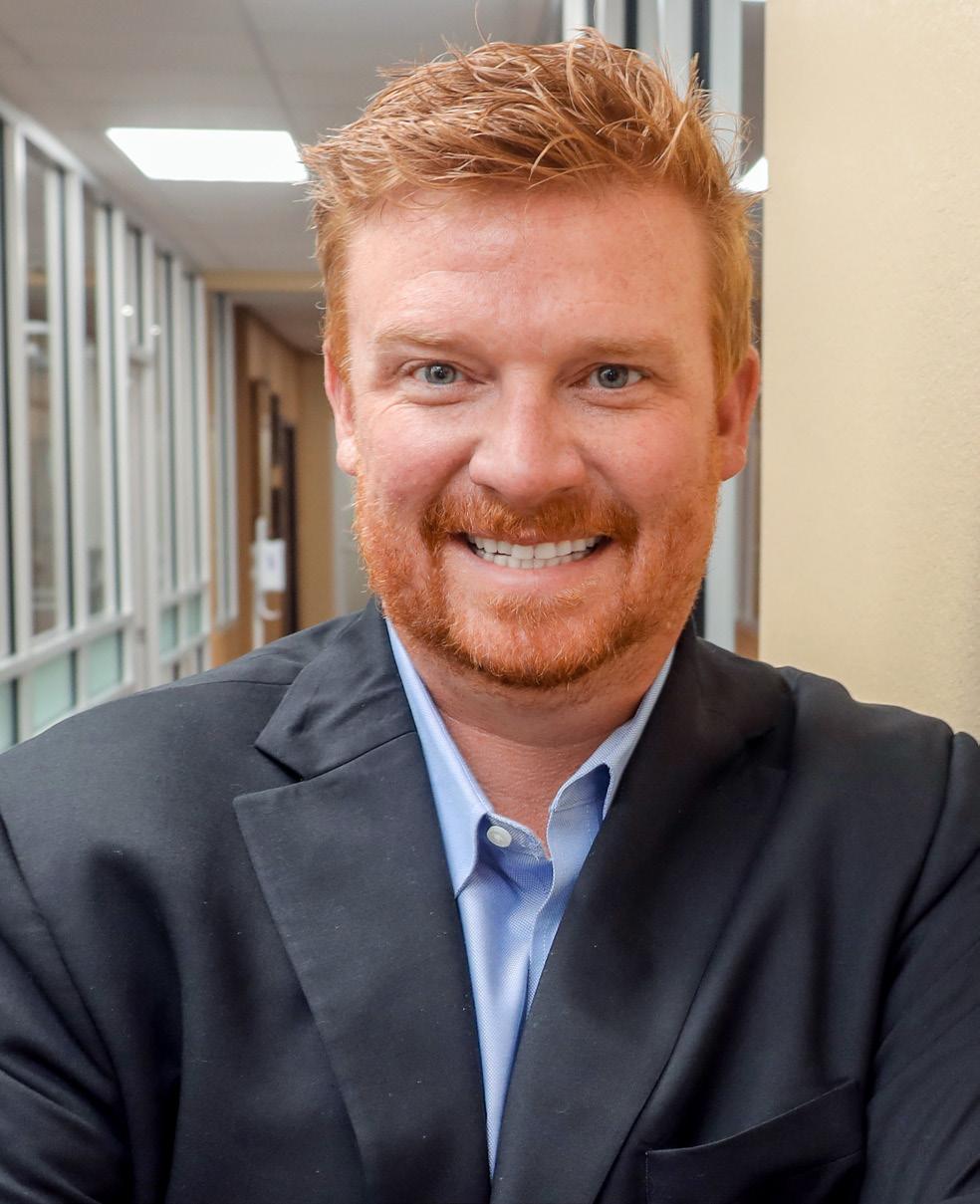
Growing up athletic, Sophie Ozier always had a passion for sports and loved baseball. Though many sports nuts dream of playing, she went after a different goal: to work in the front office of a professional baseball team.
And though Ozier’s path to the position of general manager for the Arkansas Travelers baseball club wasn’t traditional, she was determined to break into the front office. Seven years after graduating from Webster University in St. Louis, joining the Travs and working her way up the organizational ladder, it’s mission accomplished.
“The college I attended didn’t have a sports management program, but I majored in public relations and accomplished my goals of interning at professional sports organizations,” Ozier said, noting that she gained internship experience in baseball while still in school.
Ozier has been a full-time employee for the Travelers for seven years, since graduating college in Missouri, and worked in various capacities before being promoted to GM — the club’s first female GM — two years ago. She takes pride in creating interest with young women for the sport and said she continues to learn and grow from everyone she meets in the Double-A Central League (formerly the Texas League).
“People don’t typically see the front side of things, and when they do, it’s predominantly men in these positions,” she said. “Being a woman in sports administration means being able to let kids, and specifically young girls, know that there is an avenue for them in sports even if you’re not a stellar athlete. I wasn’t a stellar athlete, but I did understand sports, and I liked the business of sports and working with people. I’ve always loved bringing people to sports. I would love to see more young girls have this as a career aspiration while they’re growing up.”
Leading with kindness has been the strategy for Ozier as she worked her way up the ladder within the Travs organization.
“I’ve had a lot of different roles with this organization, and I’ve taken every one of them seriously and tried to make the organization better as a whole. I think that’s all you can do as a young professional — just try to make the place you’re working in better.”
Valuing the importance of work-life balance, Ozier is aware of the work pace in the sports industry. Because of this, she is passionate about creating and maintaining an enjoyable work environment.
“In this industry, we work so many hours, and during the season, we’re often at a minimum of 12 hours a day on game days. And we do that 69 times throughout the season,” she said. “Our employees have to truly love what they do in order to give up that quality time with their family to be here. I love motivating people to love being here and to enjoy working here. I, myself, love what I do, and success to me is continuing to be motivated.”
In her current role, Ozier spends countless hours coordinating logistics and taking care of the operations side of the business. The Travelers serve as the Double-A affiliate of the Seattle Mariners, and the Mariners take care
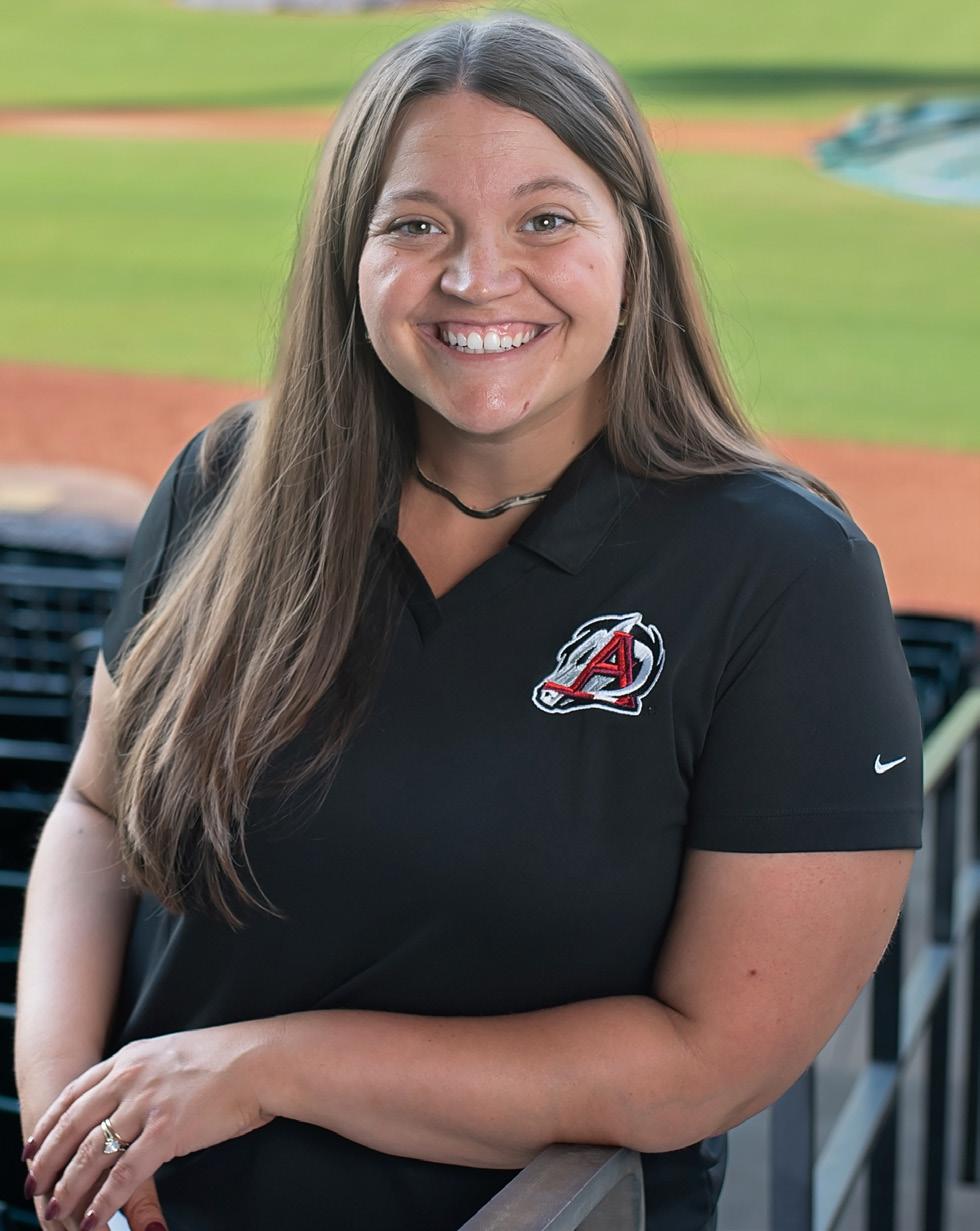
of the coaching staff, players and when the players get called up. Ozier handles what happens once the players and staff get to North Little Rock, while also running the business side of Dickey-Stephens Park.
“I coordinate how players get here, where they live and what hotels they stay in. But on the other side, I take care of sales, marketing, tickets and anything you can possibly think of that would make our facility run on game day, or when we host events here,” she said.
Ozier strives to change the stereotypical boss-employee relationship.
“I think it’s portrayed that you have to be a mean, tough person,” Ozier said. “That’s not really me, and that’s not my personality. I still think you can be a very nice, caring and compassionate person while still holding people accountable to get their job done. I’m going through the process of learning that leadership can look different regardless of who’s in the position.”
Ozier added that her role is made enjoyable because of the people who work within the Travelers organization, and she credits them as being part of the reason why she truly loves what she does.
“Our department heads are amazing; they make everything happen on game day and make sure everything runs smoothly. I’ve learned so much from everyone that works here,” Ozier said.



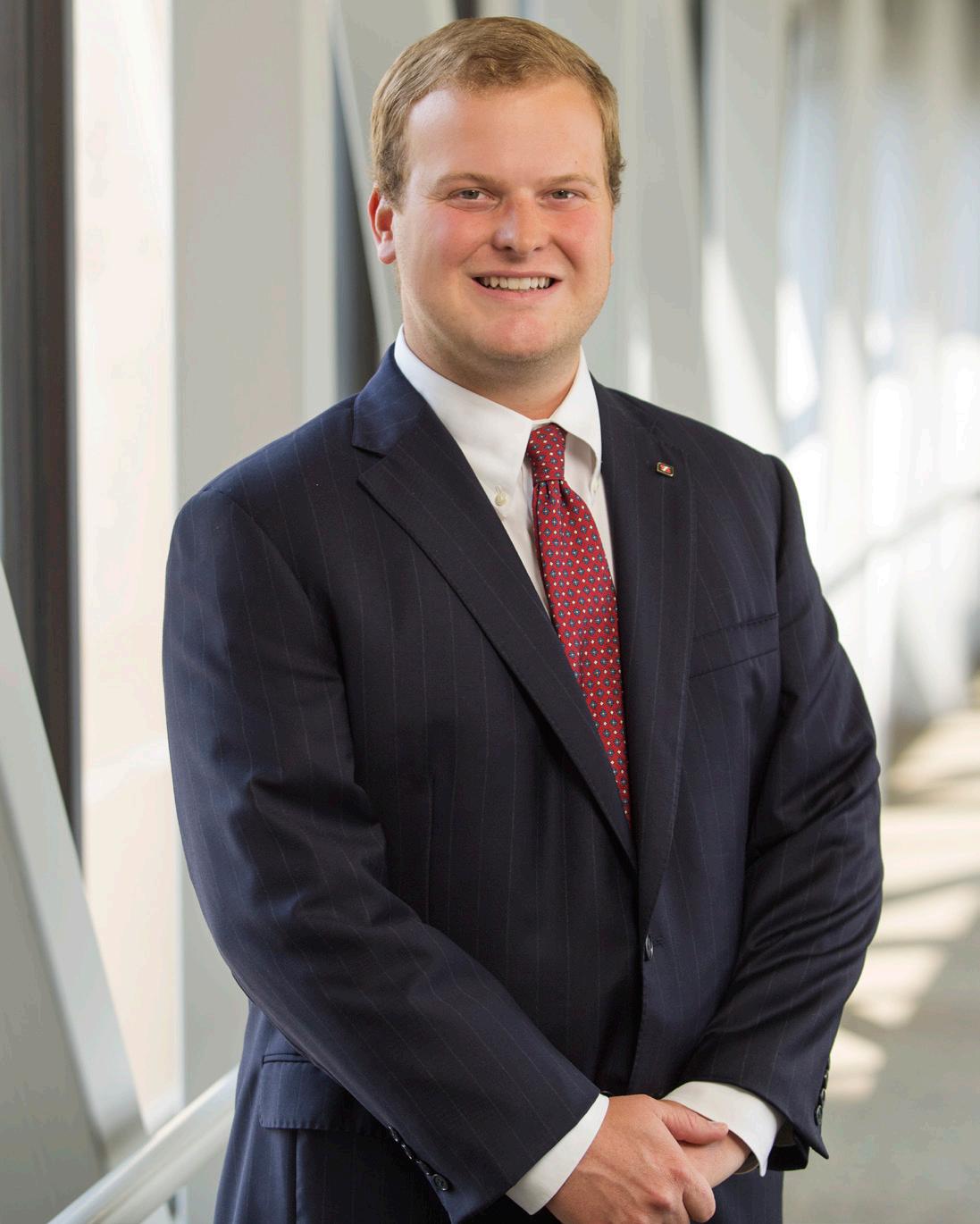


When your last name is on the front of the building, it’s easy to assume you’ll end up in the family business at some point. Having been around the grocery business for as long as he can remember, Steve Edwards Jr. grew up paying his dues in various roles around his family’s namesake Edwards Food Giant and Edwards Cash Saver stores.
“I remember going up to the office and hanging out with my dad as a child,” he said. “I would often help carry out groceries or stock shelves when I was little, on busy days around Thanksgiving and Christmas. As I got older, I started working as a cashier.”
Still, the grandson of GES Inc. founder Oral Edwards didn’t expect to jump into a leadership role quite so soon after finishing up his degree at the University of Arkansas.
“About a month before graduation in May 2018, my brother-in-law, [GES Vice President] Paul Rowton, asked me to meet him for lunch,” Edwards said. “We met in Conway and spent the afternoon discussing the possibility of me coming to work for the company.”
Edwards and his wife, Lexie, moved to Little Rock that year. Once on board and officially christened the special projects manager, Edwards’ main task was leading the launch of Edwards Curbside, the company’s new online shopping platform. Though online grocery shopping was still a relatively new concept, Edwards’ arrival could not have come at a better time. A few years later, the COVID-19 pandemic would trigger an explosion in online shopping; thanks to the groundwork laid by Edwards, the company’s Food Giant and Cash Saver stores weren’t stuck playing catch-up.
Edwards also had a front-row seat to the other effects COVID had on the traditional business model. One-way aisles, plexiglass dividers, setting up warehouses to combat product shortages and bracing for the influx of new online users — he and the rest of the team had their work cut out for them. That the business didn’t just scrape by, but tackled those challenges headon, is a testament to the 60-year-old company’s leadership and culture.
“Our team members showed up to serve the members of their community when they needed them most,” Edwards said. “I’m beyond proud of the way our team stepped up.”
Nowadays, Edwards continues to oversee Edwards Curbside, as well as the company’s rewards and catering programs and marketing efforts. He’s been recognized as a growing industry talent, enjoying a place in both the National Grocers Association Emerging Leaders Share Group and on the retail technology advisory board for the Alliance Retail Group.
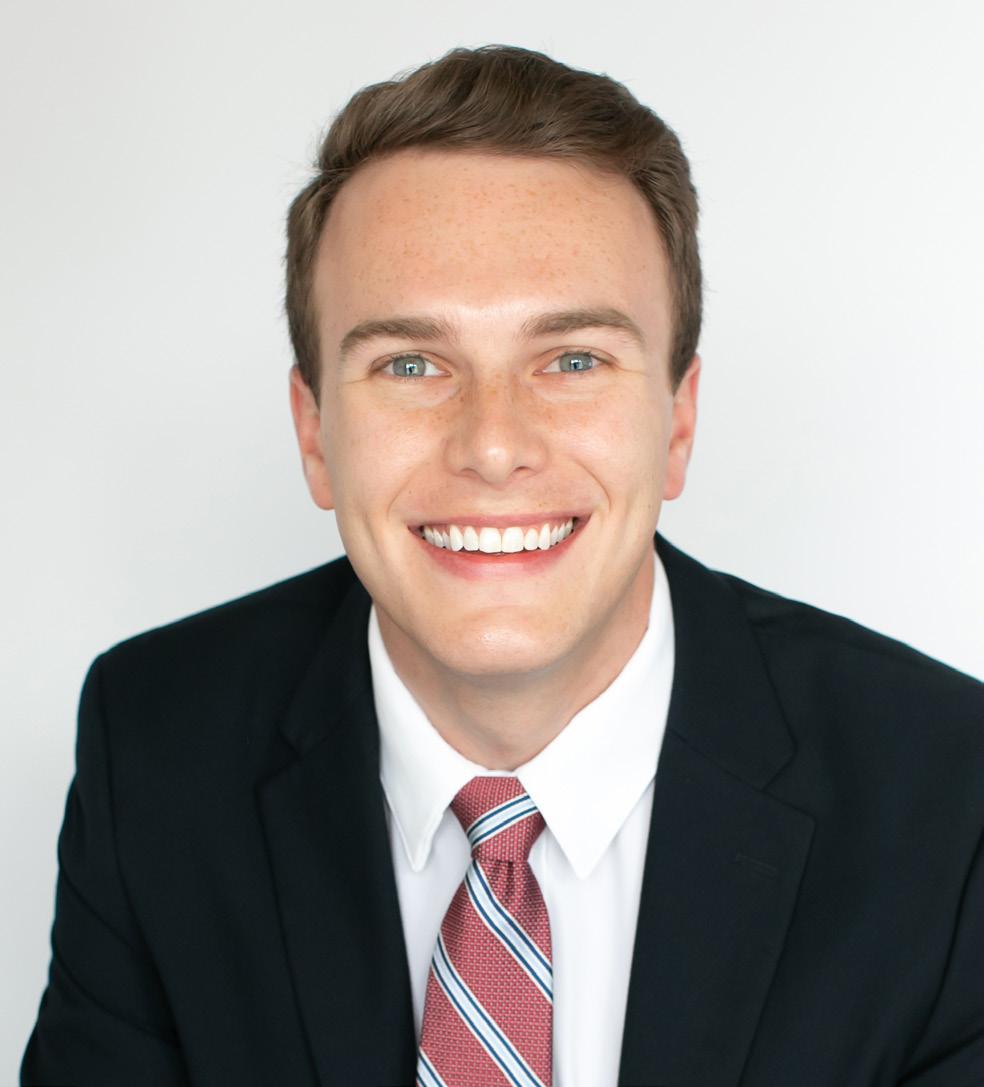
The day-to-day tasks of a special projects manager can be as numerous and varied as the “special projects” themselves, and Edwards appreciates that unpredictability. Some days he finds himself glued to a desk all day, navigating a sea of emails and meetings. Other times, he’s on-site at one of the stores, walking the aisles during a remodel or handling any number of other situations.
“I can’t tell you how many days I drive to work with a plan in mind for what I want to accomplish for the day, only for that plan to be thrown out
the window by the time the day gets started because something needs to be taken care of at one of the stores,” he said.
Despite the capricious nature of the work, seeing the look on customers’ faces when they enter a new or remodeled store never gets old. With 14 stores between the two brands and more in the works, Edwards is optimistic about the chain’s continued growth throughout the state. And, as part of the next generation of GES leadership, Edwards is also clear-eyed about the importance of learning from his elders and setting the example for the ones who will come after him — like his son Elijah, who at 1 1/2 years old still has plenty of time to learn the ropes.
“Having that push and pull between the older and younger generation helps us progress forward at a steady pace,” he said. “The younger generation helps usher in new ideas and ways of thinking, and the older generation makes sure that we are staying true to our roots and uses their experience in the industry to keep us on the right path.
“We will continue to battle grocery behemoths. We will never have the buying power or access to technology that the big names have, but we will always win when it comes to things like product quality, freshness and customer service. My grandfather always said that being in the grocery business means being in the people business. If we remember who we are and how we got here, we can always be successful.”
Jeff Maland, chief risk officer at Signature Bank of Arkansas since 2016, never thought he would go into the banking industry. In fact, when he signed up for a job, he didn’t think he would be going to Signature Bank — the bank was yet to exist. Nevertheless, he has been a pillar of the financial institution since its earliest days by being willing to do whatever work needs doing.
A native of Harrison, Maland attended the University of Arkansas, where he played a year of baseball and graduated with a business degree. He wasn’t sure exactly what he wanted to do with the degree, but he did have a connection at Arvest Bank, where he hoped he might find a parttime job. That connection was Gary Head, who at the time was the CEO of Arvest. Head took his time in making an offer, and Maland soon found out why. Head left his position at Arvest in 2004 to start Signature Bank, and Maland followed.
“I don’t know if I was the first employee,” Maland said, “but I might have been the first one to get to work, because everyone else that was getting recruited had other jobs already and had to resign, and I was just there waiting to get to work. I got to be there on the ground floor, probably in a bunch of stuff that I had no business being involved with.”
Maland ended up serving as the bank’s compliance officer, ensuring that Signature followed all necessary consumer compliance regulations. Though not the kind of job most people dream of, Maland was willing to get it done. When someone was needed to fill the role of vice president for loan review and risk management in 2008, Maland once again stepped up to the plate.
Risk management has not always been an easy job in the years since Maland took it up; he has seen the country go through multiple economic cycles. While Signature Bank has had some difficult times, it staunchly remains afloat.
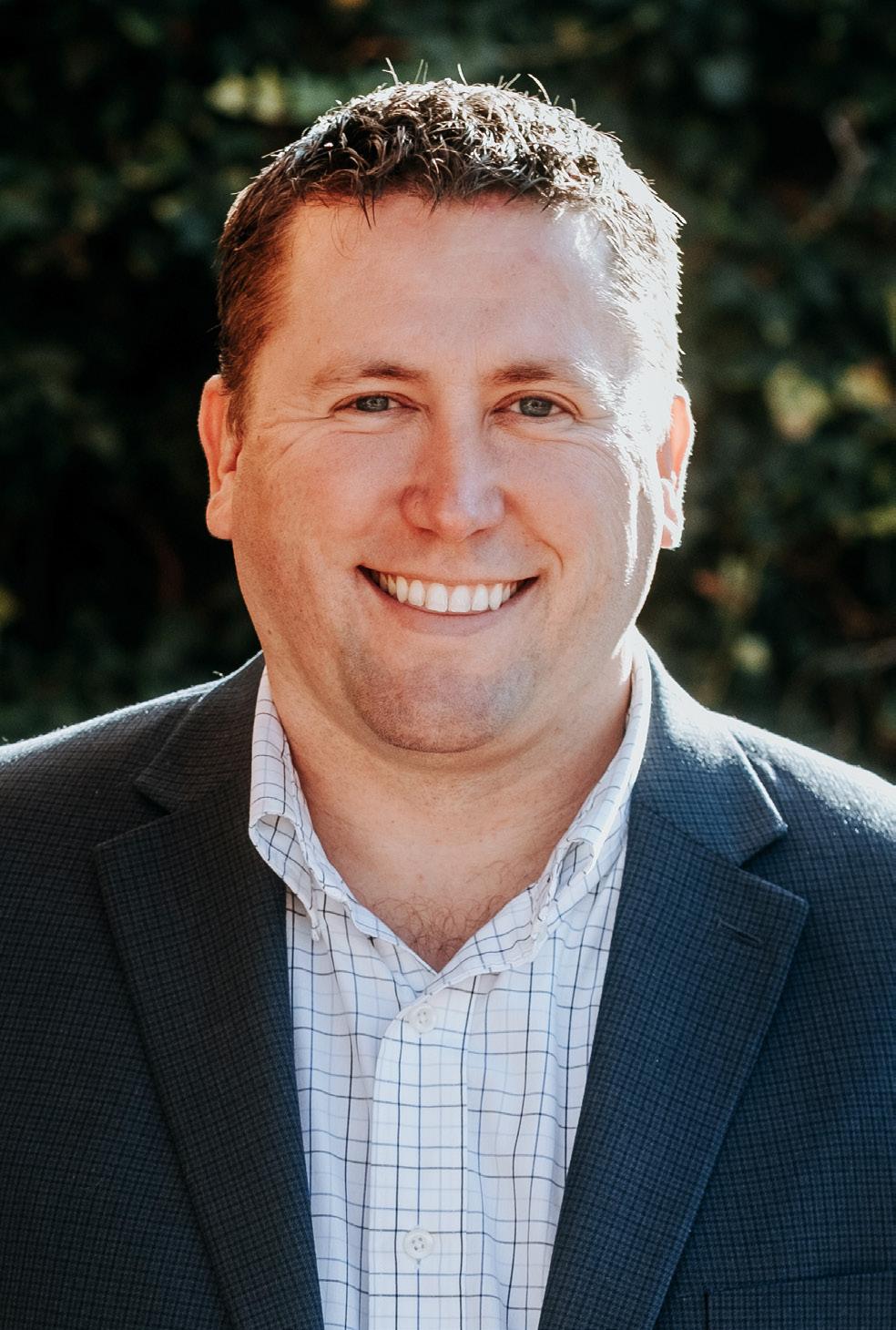
“I think back to when banking wasn’t as fun, around 2010,” Maland said. “There were lots of people struggling — good people. We made loans to people with great character, but if they don’t have the money then they can’t pay it, no matter how great their character is. So, we worked with people, took some lumps and got through some hard times. And to see people that came out of that on the other side and are doing great today, that’s a really rewarding thing. I look back at some of the metrics we had, the negative numbers, and it’s like, how did I sleep at night? But I was young, and I didn’t know any better, and there was work to be done.”
Signature Bank survived those days, as well as the pandemic and a more recent case of mistaken identity when a financial institution in New York also named Signature Bank went under. After years at the forefront of risk management, Malland has some advice for those in a similar position.
“Don’t jump to conclusions about what needs to be done immediately,”
Malland said. “Step back and gather facts. You’ve got to be able to move quickly, but try to do it in a way that benefits the bank and the customer. I think too often people get emotional about things, maybe irrational, but [it’s important to be] able to calmly survey the situation, go through facts and take all the data you have and make the best decision available at that time. You’re not always going to be right, but I think that kind of analytical mindset really helps.”
He also offered advice that can apply to careers far beyond risk management or banking as a whole.
“When you see an opportunity for work to be done and there’s not necessarily a natural person to get it done, just take on the challenge and go do it,” Malland said. “Because not only will you learn from that experience, you’re going to gain the respect of others who see that you’re willing to work, willing to take on a challenge. And if you consistently do that, you’re going to look up one day and [find that] you’re pretty wellrounded and respected wherever you’re at.”
Katherine Andrews is the state’s first director of the Office of Outdoor Recreation within the Arkansas Department of Parks, Heritage and Tourism. She is responsible for leading the state’s efforts to grow the outdoor recreation economy in Arkansas. This includes the promotion and connection of the outdoor recreation industry, the creation and progress of collaborative relationships between outdoor industry stakeholders in Arkansas, fostering the growth of outdoor companies, and the support and advocacy of conservation in The Natural State. In 2023, Andrews was appointed by Gov. Sarah Huckabee Sanders to the Natural State Initiative Council and leads the Outdoor Economy subcommittee.
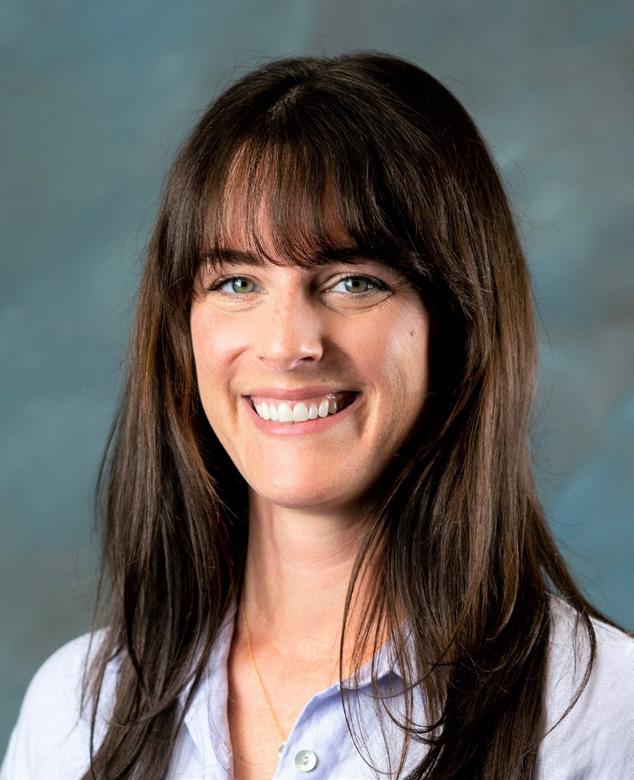
Andrews previously worked for the Arkansas Economic Development Commission as director of the Small Business and Entrepreneurship Development Division. Prior to AEDC, she worked as a commercial real estate sales associate for the Hathaway Group in Little Rock.
Andrews attended the University of Arkansas, where she received a B.S.B.A. in finance from the Sam M. Walton College of Business in 2013. She is a graduate of Leadership Arkansas Class XIII and Leadership Little Rock Class XXXV, as well as a graduate of the University of Oklahoma’s Economic Development Institute program.

Duncan Bellingrath serves as Hot Springs community president for Simmons Bank, overseeing operations throughout the market. A native of Pine Bluff, he joined Simmons Bank in 2017 and is a graduate of the University of Arkansas in Fayetteville.
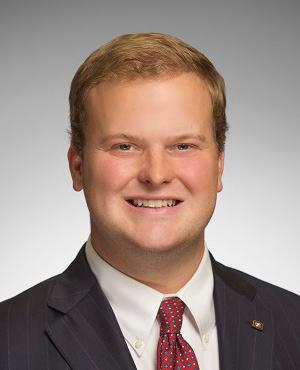
Bellingrath is a graduate of Leadership Arkansas Class of XVI, Leadership Pine Bluff and serves as president of the Arkansas Bankers Association Emerging Leaders Council. He also serves as a treasurer of the Arkansas Financial Education Commission and on the boards of the Arkansas Bankers Association, The Salvation Army of Hot Springs and the Hot Springs Metro Partnership.
Jessica Bernard founded J. Ruby Interiors in 2018, focusing on residential and commercial interiors. After graduating college with a BFA in interior design, she began an internship at WER Architects and has since partnered with the firm on a health care project. Bernard collaborates with architectural firms, contractors and other designers as needed on larger projects, allowing her to focus solely on design. While she has her own, eclectic personal style, Bernard always designs according to her clients’ interests and particular tastes. Bernard has worked with charitable organizations such as Arkansas Symphony House in 2020 and the playhouse build for the Girl Scouts of America in 2022.
Congratulations Joey Msall on being named as one of Arkansas’ Future 50. As general manager for natural gas operations in Arkansas, Joey exemplifies professionalism with positive energy and a commitment to safety. Each day, his impact supports nearly 183,000 customers in more than 100 Arkansas communities. From all of us, thank you for your leadership.

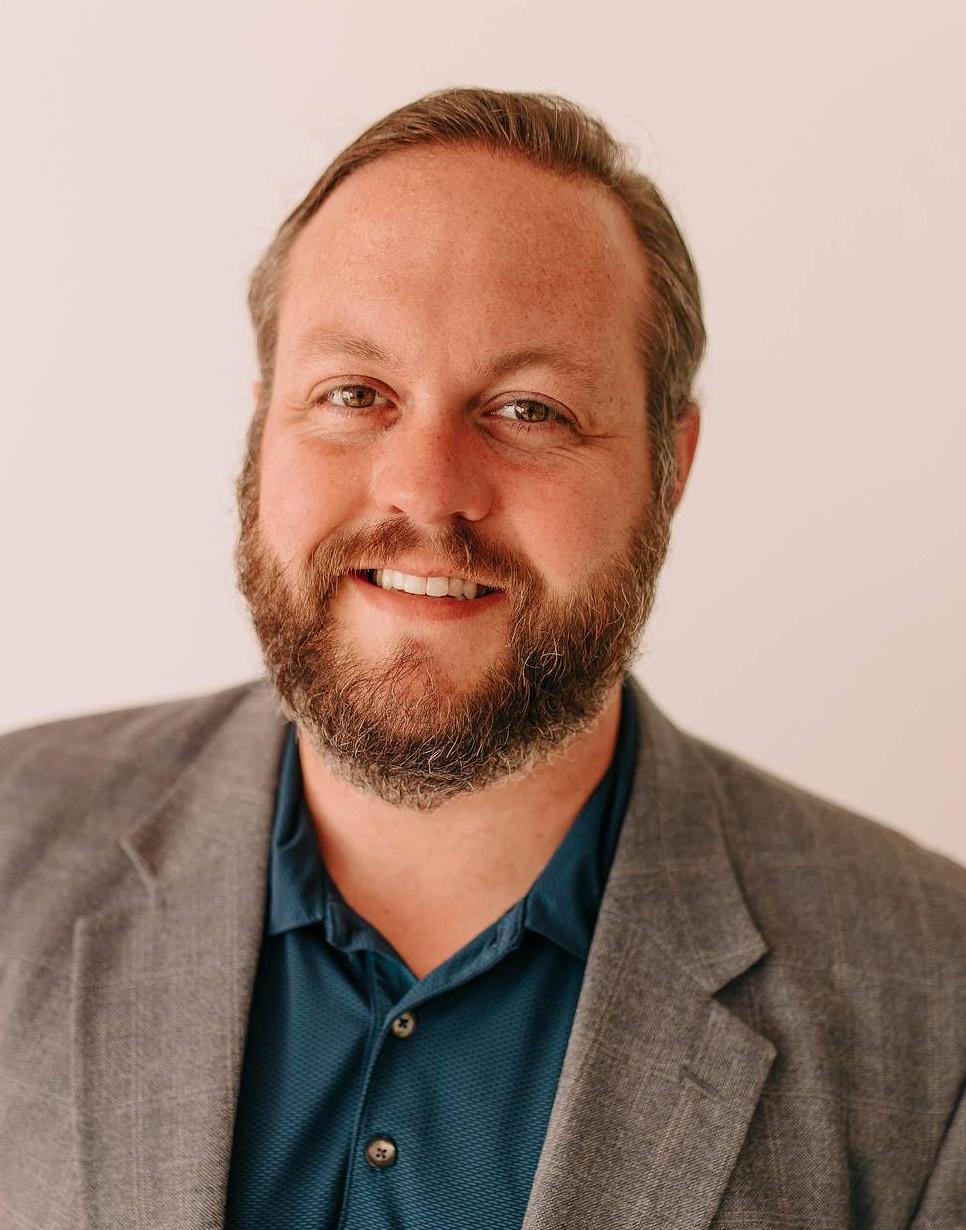
Atrial attorney with more than 70 jury trials and 10,000 courtroom hours, James Bornhoft is recognized as an upand-coming force to be reckoned with in courtrooms all over Arkansas. His career began by serving as a deputy district attorney in the Special Victims Unit & Human Trafficking Prosecutor in Colorado’s largest judicial district. Bornhoft’s passion has and always will be representing victims of injustice. His practice focuses on personal injury cases, family law, estate planning and criminal defense.

A graduate of the University of Arkansas, University of Denver Sturm College of Law and a member of the DU Law National Trial Team, Bornhoft brings unparalleled expertise and tenacity to his practice. Committed to client-centered and compassionate representation, he empowers his clients during their most critical moments. With his visionary leadership and unwavering dedication, he is poised to shape the future of law and leave a lasting impact in the Arkansas legal field.
Cahill is the founder and owner of Cahill Design, a virtual design service specializing in interior and exterior design for residential and commercial properties. Cahill played collegiate golf at Arkansas State University, where she earned a bachelor’s degree in sports management with a minor in sales. In 2020, Cahill founded Cahill Design, and in 2022, she joined The Vibe Interiors as an interior designer. Home renovation and design is a passion for Cahill. Whether virtual or local, she assists clients with renderings providing creative visualization of their ideas before committing to physical work.
Cahill is a member of The Venture Center’s 2022 Spark! Cohort and won first place in the annual Pitch N’ Pint competition. She also is a member of the 2023 VC Woman Achieve Program, a statewide mentorship program bringing Arkansas’ women entrepreneurs the opportunity to develop life-changing relationships to drive professional growth.
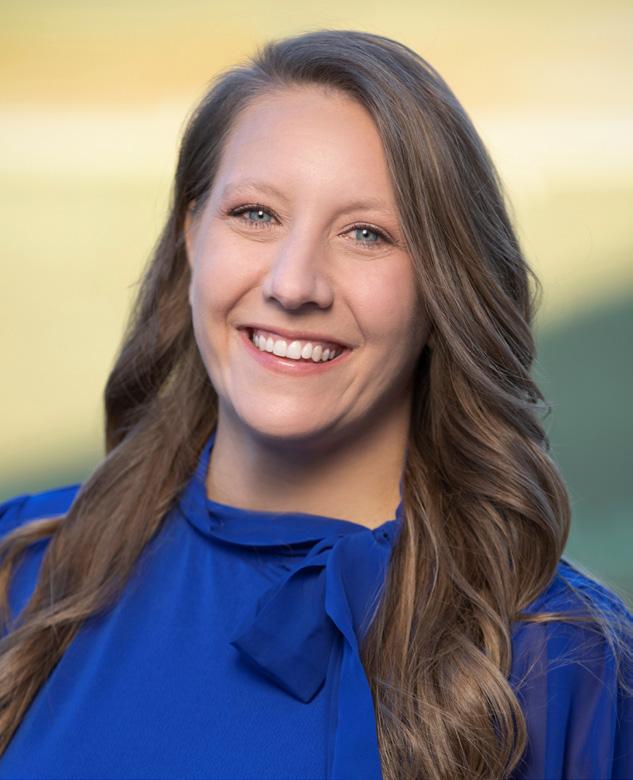
Tara Cobb, a native of Cabot, is a financial advisor with Small & Associates Financial with more than a decade of industry experience. After graduating from the University of Arkansas at Little Rock in 2008 with a degree in marketing, Cobb started her financial career at Small & Associates Financial in February 2010, initially serving as a receptionist. Her dedication and passion for the field quickly became evident. In 2011, she successfully passed her FINRA exams, earning certification as a paraplanner. Fueled by a desire to make a meaningful difference, she decided she wanted to do more. With her sights set on becoming a financial advisor, Cobb pursued her goal diligently and, in 2021, solidified her position as a trusted and knowledgeable advisor.
What sets her apart is genuine enthusiasm for meeting clients and forming new connections. She finds great joy in hearing about her clients’ financial goals and working together towards achieving those goals. Cobb takes pride in empowering her clients, helping them to understand, achieve and manage their financial independence with confidence.
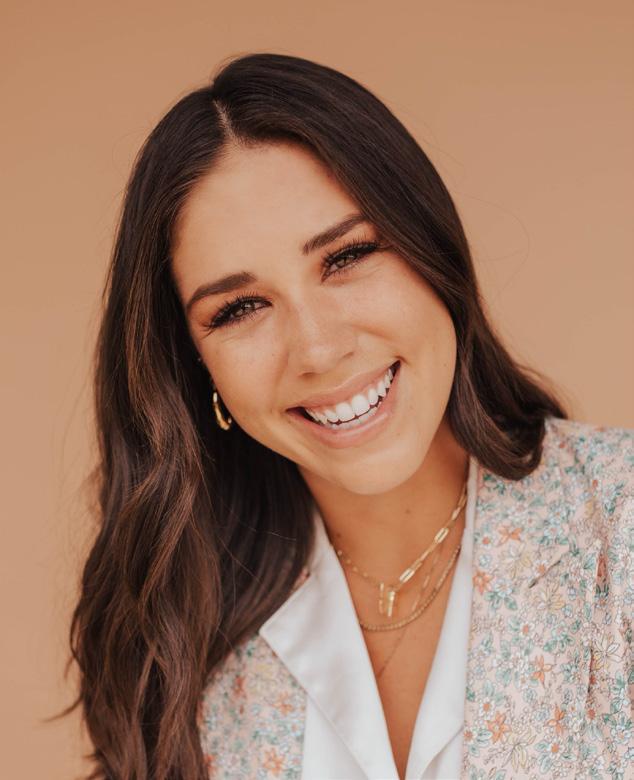
Pulaski County
Born and raised in Little Rock, Drew Dorsey is a graduate of Mount St. Mary Academy, the University of Arkansas in Fayetteville and the William H. Bowen School of Law in Little Rock. While in law school, Dorsey worked for two sports agencies, ESQ in Nashville and Rosenhaus Sports Representation in Miami, and gained her license as a Major League Baseball player agent. She spent a legislative session as a law clerk for Capital Advisors Group, a lobbyist firm. She later worked on Congressman French Hill’s reelection campaign in 2020 as a legal intern before joining his 2022 campaign as the political and fundraising director. Following the campaign, she now serves as a deputy prosecuting attorney in Pulaski County. Aside from her work, she enjoys reading, watching the Atlanta Braves, volunteering at Miracle League, playing tennis and hanging out with her three Labs.
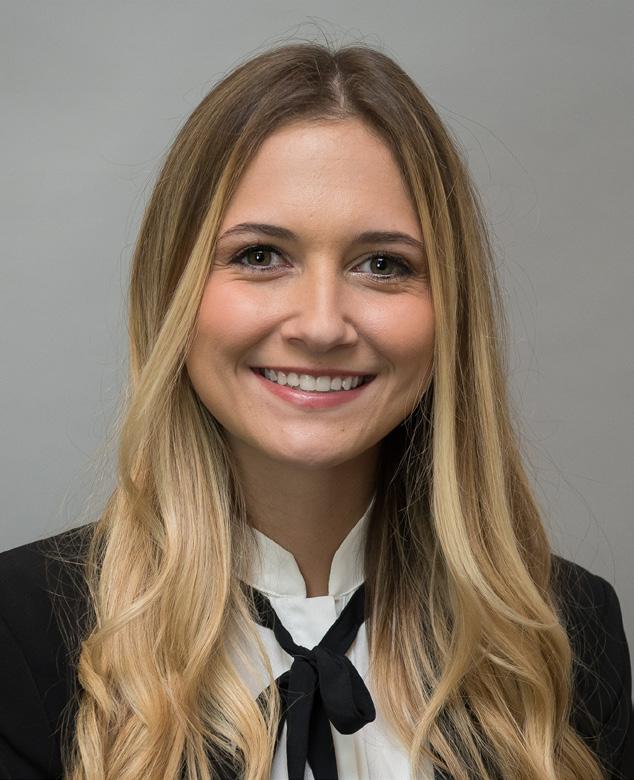
Hot Springs
Edwards Jr. is the special projects manager for GES Inc., the parent company of the Edwards Food Giant and Edwards Cash Saver line of grocery stores. Edwards joined the family business full-time after graduating from the University of Arkansas in 2018 and led the launch of the Edwards Curbside online shopping platform and continues to oversee the efforts of the digital marketing team. He is a graduate of the Leadership Greater Little Rock Class XXXVIII, as well as a member of the University of Arkansas Alumni Association’s Central Arkansas chapter, the National Grocers Association Emerging Leaders Share Group and the Alliance Retail Group Retail Tech Advisory Board.
Dr. Ethan Erwin, a compassionate dentist and Hot Springs native, graduated from Lakeside High School in 2012. Excelling at the University of Central Arkansas, he earned a B.S. in biology with honors interdisciplinary studies and chemistry minors before securing his dentistry degree from Texas A&M in 2020. Gaining invaluable experience at Smile Dailey and Arkansas Dental Centers, Erwin joined with Dr. Robert J. Barnett in 2021, rebranding the practice as “Smile Hot Springs.” Residing in Hot Springs with his wife, Dr. Cara Erwin, a physical therapist, and their three children, Erwin is often found enjoying Arkansas’ natural beauty, indulging in fishing or even playing the fiddle when not practicing dentistry.

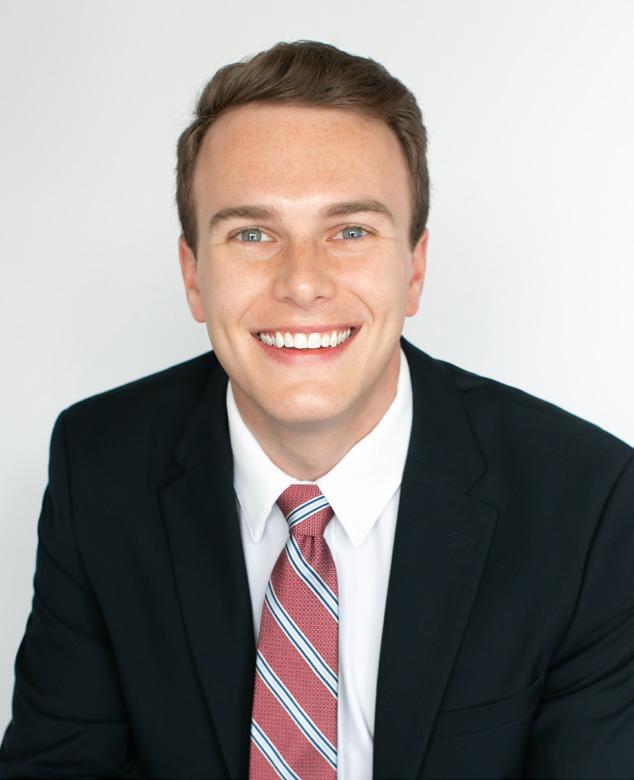
For nearly 15 years, Andrew Ford has provided leadership in the corporate and nonprofit sectors to make a meaningful difference in the lives of families. At USAble Life, Ford works with executive leadership to advance the company’s business plan and strategic initiatives that deliver supplemental, life, disability and dental insurance products in partnership with 16 Blue Cross Blue Shield plans across the country.
Before joining USAble Life, Ford was a senior associate with the Winthrop Rockefeller Foundation, where he focused on economic development and education in Arkansas. He also previously supported Southern Bancorp’s banking and development initiatives in the Delta region. A lifelong Arkansan, Ford earned his B.A. in business administration and political science from Ouachita Baptist University and M.S. in economic development from the University of Central Arkansas.
Westrock Coffee Co.
Centennial Bank
Ford serves as group president of operations at Westrock Coffee Company. Since starting with the company in 2016, Will has worked in several of Westrock Coffee’s entities around the world, focusing on multiple aspects of the coffee trade. Currently, Ford oversees global production, operations and distribution logistics for Westrock, where he is responsible for over 1 million square feet of operational space across eight facilities. In 2021, he oversaw the construction of Westrock Coffee’s first international manufacturing facility in Johor Bahru, Malaysia, and is currently responsible for the construction of the nation’s largest roasting to ready-todrink facility. Among Ford’s core skills are reviewing and improving efficiencies in order to help the company deliver complex beverage solutions at a global scale in multiple formats.
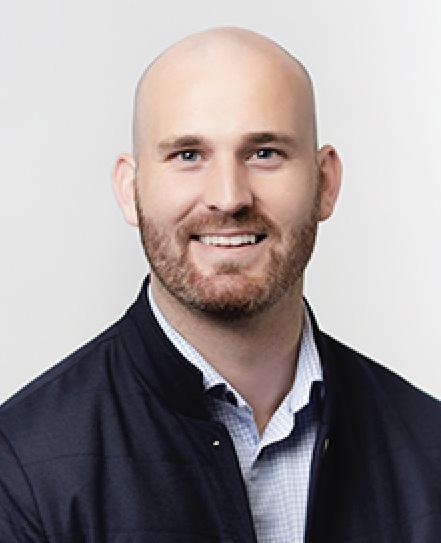
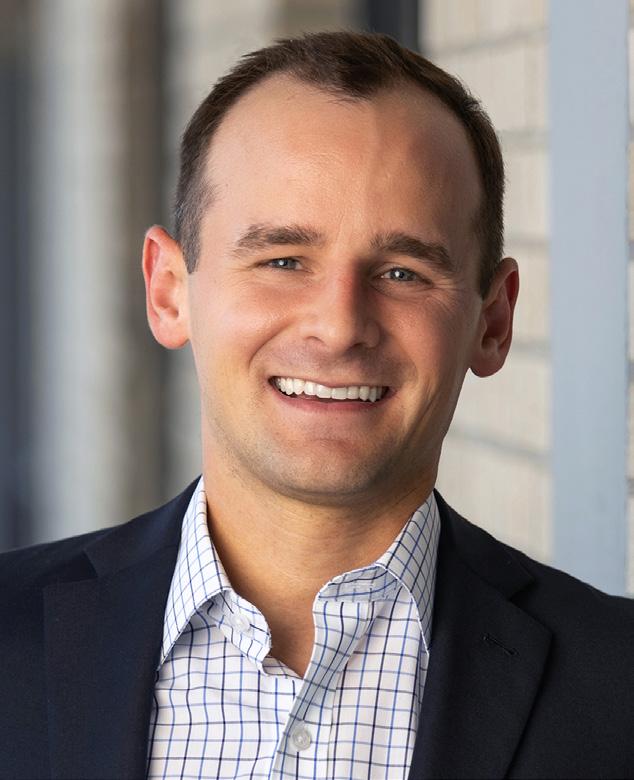
Ford earned a master’s degree in coffee economics and science from Illy Universtatá del Caffé in Trieste, Italy. He received his B.A. in communications from Baylor University in Waco, Texas. Will serves on the boards of the National Coffee Association (NCA) and the Greater Little Rock Chamber of Commerce.
Collin French graduated from the University of Central Arkansas in Conway in 2019 with a bachelor’s degree in finance. He joined Centennial Bank as a loan officer trainee while still in school and then joined the bank officially after graduation. He has worked his way up from loan officer to mortgage loan originator trainee and in 2020, to mortgage loan originator. He recently celebrated his fifth-year anniversary with Centennial.
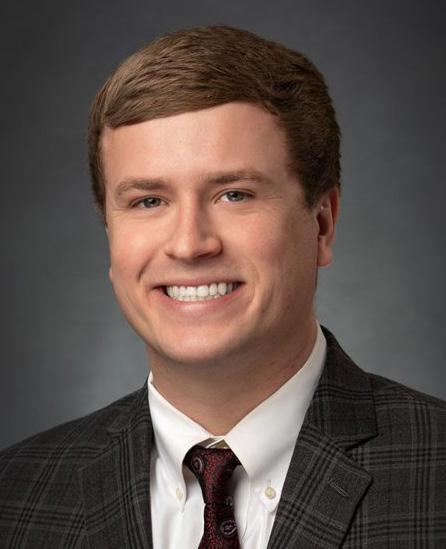



Haley Giffin’s journey in health care has been a series of stepping stones. Her love for nursing started when she worked as a certified nursing assistant for several years while working toward her nursing career. Giffin then went on to graduate with a bachelor’s from the University of Arkansas at Little Rock. Giffin began her nursing career on a medical-surgical unit, but the majority of her experience has been in longterm care. Giffin joined Nursing Consultant Inc. in 2020 as director of nursing in longterm care. Over the last eight years, she has worked diligently to care for vulnerable patient populations. Giffin is grateful to be a part of a company that believes in offering the best life and experiences possible for our elderly population.
Ben Hargrave is a banker and the son of a banker. He is a North Little Rock native and after graduating from Central Arkansas Christian, he completed his education at UALR, earning a B.A. in business management.

Hargrave has been part of Stone Bank for six years but has been in banking for 11 years. He started his career as an auditor before becoming a credit analyst. He then moved into compliance as an assistant risk management officer and senior auditor and recently became the bank’s BSA Officer. He is a CRCM (Certified Regulatory Compliance Manager).
Hargrave has been part of Stone Bank’s efforts to recognize veterans and served with his fellow bankers for Junior Achievement. He was involved when the bank delivered food for relief workers from the recent tornados.
When he’s not working at Stone Bank, he likes to take it outside for hunting, fishing, and four-wheeling. He follows any sport involving a Razorback.
As the founder and driving force behind Rock City Digital, Kait Hill is one of Arkansas’ most promising young business leaders. With a clear vision for the future of business, Hill is committed to cultivating a culture of innovation and efficiency. Her progressive thinking and remarkable achievements have garnered widespread recognition, including the Small Business Owner 30 & Under Award from the Little Rock Chamber of Commerce in 2019 and a feature in Local Magazine as a Woman to Watch in 2020. Setting herself apart with a unique approach, she distinguishes herself in the business world through her fresh and innovative perspective. Hill recognizes the vital role played by individuals within an organization and highly values their contributions. Emphasizing a team-centered philosophy, she has carefully curated a group of passionate professionals who share a deep love for their work and a genuine connection with their colleagues. This valuable teamwork is evident in the exceptional level of dedication and consistent quality of service that Rock City Digital delivers to its clients. Moreover, her company has been recognized for its excellence, receiving the Best Web Designer and Best Advertising Agency awards for three straight years from Arkansas Money & Politics and others.






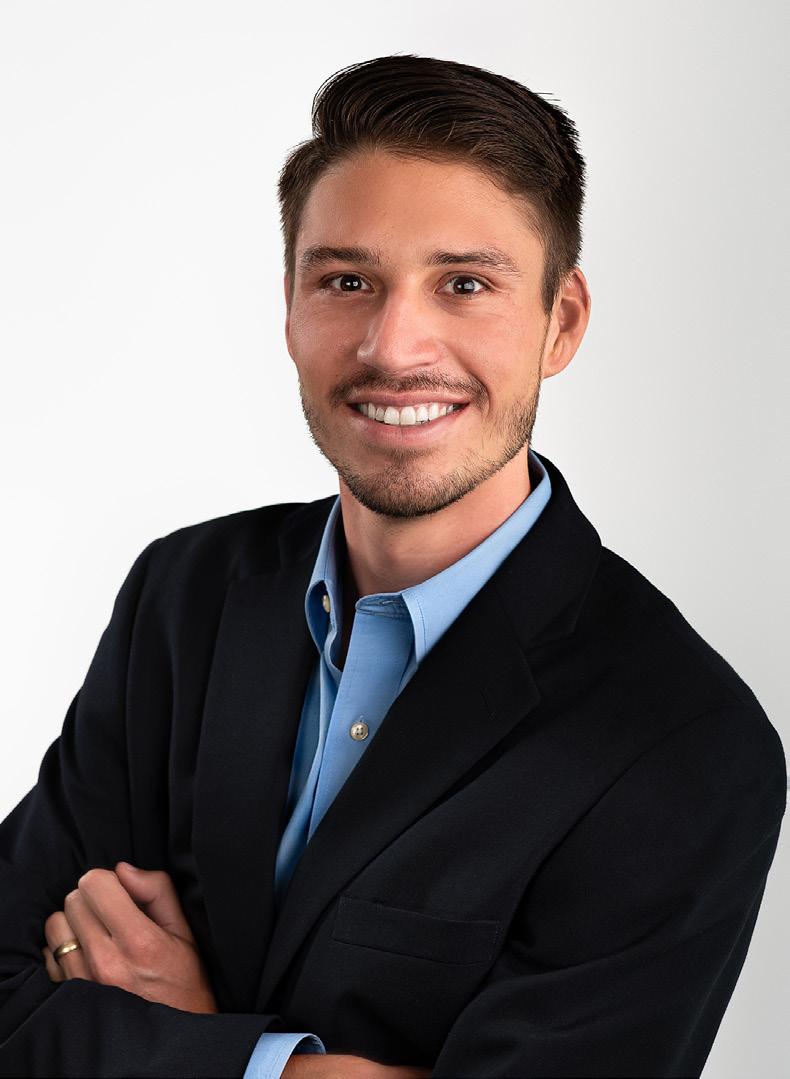
Strategic
Arkansas Small Business and Technology Development Center
Diego Morales Ibarra is the owner of DIMORI Services LLC, a newly established consulting company. Prior to this, he worked as the strategic partnerships manager at the Arkansas Small Business and Technology Development Center (ASBTDC), where he also served as the coordinator for the pilot program Arkansas Business Navigator. While at ASBTDC, Ibarra excelled at strengthening relationships with stakeholders through outreach and event coordination to ensure the program was accessible to minority communities in Arkansas.
A native of Guanajuato, Mexico, Ibarra completed a business degree at the Autonomous University of the State of Hidalgo. In 2017, he accepted a job in Little Rock to serve at the Mexican Consulate, eventually ascending to the role of coordinator of community and economic development. Ibarra is passionate about serving the needs and demands of minority populations by developing collaborative strategies in public health, finance and education.
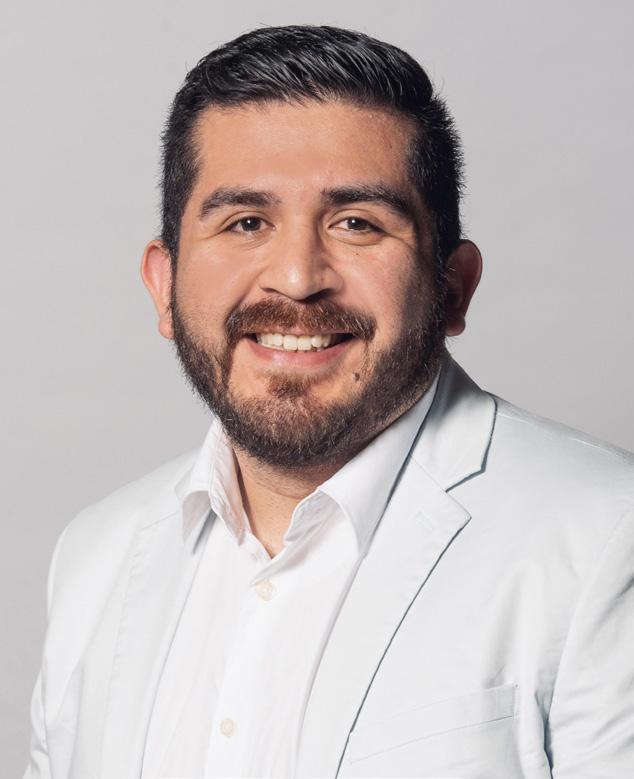
COO
JTJ Restaurants
In2008, Jake Keet returned to Little Rock after attending Florida State University to open Taziki’s Mediterranean Cafe with his partners and family members, Tommy and Jim Keet. As COO of JTJ Restaurants LLC., Keet helped expand Taziki’s into two states and 10 locations.
In recent years, Keet has been involved in creating the restaurants Cypress Social and Petit and Keet and has partnered in three Waldo’s Chicken and Beer locations, two Count Porkula BBQ locations and one Big Bad Breakfast. His family has recently been a part of the purchase of the Breckenridge Shopping Center, where it will be involved in opening numerous restaurant concepts over the course of the next year.
Keet also holds his real estate broker’s license as the principal broker of Keet Realty Group.

Owner, Andrew Klatt Media Collective
Co-founder, 34 North Creative
Andrew Klatt is an outdoor photographer, videographer, media specialist and creative director from Hot Springs. He founded the Andrew Klatt Media Collective and co-founded 34 North Creative, a collective of creative artists who provide creative vision, camera/production gear and post-production work. Klatt works with a number of outdoor industry leading brands, music artists and top-ranked destination lodges.
He travels the country to capture unique imagery in remote places that tells the stories of epic people and places. A graduate of Arkansas State University, Klatt previously worked for The Confluence Group, Red Shutter Media, IDX Inc. and Instrument & Supply Inc.

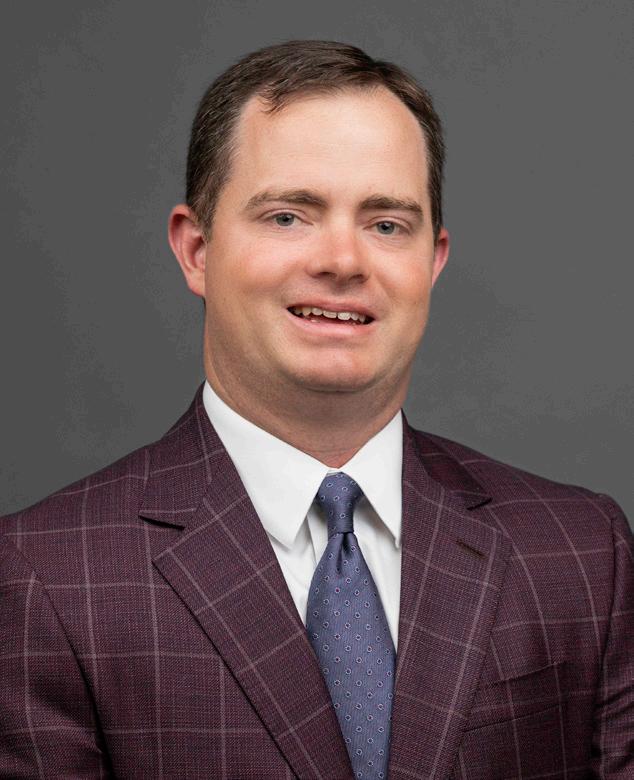
Jeff Maland serves as the chief risk officer and assistant secretary of the company and has been employed with Signature Bank of Arkansas since May 2004. Maland began his career with the bank as a banker trainee and was promoted to compliance officer in October 2005. In April 2007, he was again promoted to loan review/risk management officer, a position he held until his promotion in October 2016 to his current position of chief risk officer.
In his role as CRO, Maland oversees the risk management, compliance, BSA, loan review, security and IT functions for the bank. He is a graduate of the University of Arkansas with a BS in administrative management. He has also completed the Graduate Commercial Lending School at Southern Methodist University, the ABA National Compliance School at the University of Oklahoma and is a graduate of the Graduate School of Banking at Colorado.
Reynardo Marks, 29, serves as director of communications for North Little Rock Chamber of Commerce, with responsibility for communication activities and cultivating external relationships with the chamber’s members and constituencies. In this role, Marks protects and strengthens the North Little Rock Chamber of Commerce reputation by guiding external, internal, executive and digital communications, strategic marketing, branding and social responsibility.

Marks oversees various initiatives including the North Little Rock Young Professionals, Military Relations and Vanguard Ambassadors. He also sits on the Chamber’s Minority Business Accelerator board, which focuses on community inclusion. Marks has more than seven years of broad project-management experience. Prior roles include channel partner engagement advisor with Hewlett Packard Enterprise as well as commercial/consumer lending operations analyst with Simmons Bank. Marks earned a Bachelor of Science in Marketing Management with emphasis in strategic management and analysis from Arkansas State University.
Wes Martin serves as vice president of Hathaway Group. He joined the firm in 2012 and became a partner in 2019. Martin specializes in the leasing and sales of office, retail, land and industrial transactions. He holds both the CCIM and SIOR designations. He was honored by the Commercial Real Estate Council of Metro Little Rock for the largest office sale of 2018, largest industrial sale of 2020 and largest industrial lease of 2021.
Martin is currently the vice chairman of the board for the Better Business Bureau of Arkansas and serves on the board for the Little Rock Regional Chamber of Commerce. Other community involvement includes serving on the board of the Arkansas CCIM Chapter and The Hat Club. He is a past chair of Create Little Rock and the Rotaract Club of Little Rock and was a member of Leadership Greater Little Rock Class 31. Martin earned his bachelor’s degree in finance with an emphasis in real estate at Missouri State University in 2009.

Cole McCaskill is the vice president of economic development at Hot Springs Metro Partnership. McCaskill has been working to develop and grow the iconic Arkansas city since he was hired in the fall of 2014. A 2013 graduate of Henderson State University, McCaskill had also interned at the city’s Chamber of Commerce before joining the staff full-time. The Hot Springs Metro Partnership is a separate nonprofit organization that works closely with the chamber to invest in areas of Hot Springs. McCaskill graduated from Henderson with a bachelor’s degree in communications.
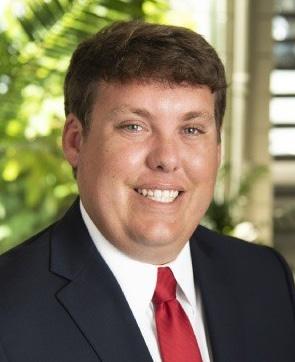
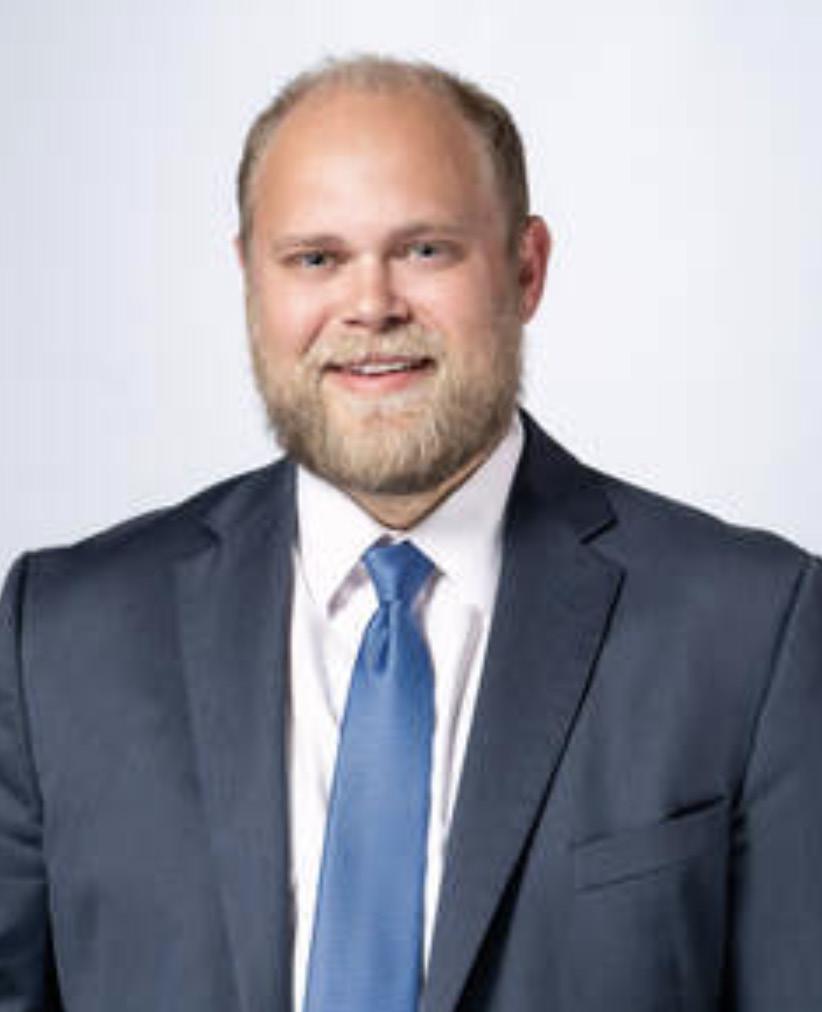
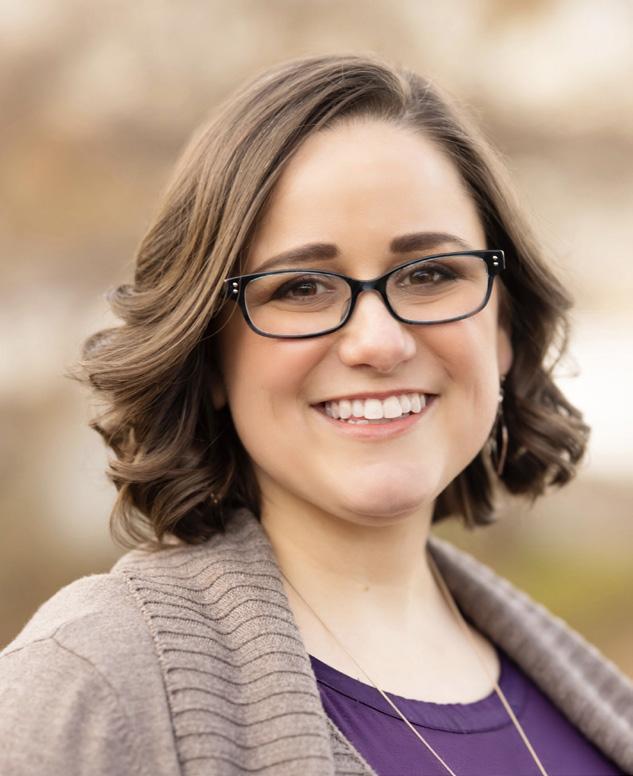
Pulaski Heights United Methodist Church
Kathleen McMurray serves as the pastor of connecting ministries at Pulaski Heights United Methodist Church in Little Rock. McMurray is passionate about ensuring all people know that they are loved, that their lives are important and that they can make a difference in the world. Young adult and new member ministries at PHUMC have grown under McMurray’s leadership, and last year she received the Denman Evangelism Award from the Arkansas Conference of the United Methodist Church. McMurray has served on the boards of the Wesley Foundations at Arkansas State University and the University of Arkansas at Little Rock, the Ozark Mission Project and most recently at the Children’s Protection Center of Pulaski County. McMurray graduated summa cum laude from Louisiana State University and holds a master’s degree in divinity from GarrettEvangelical Theological Seminary in Evanston, Ill. This fall, she begins work toward a doctorate in ministry in church and community leadership at Emory University’s Candler School of Theology.
Nick Merriweather is a financial advisor and operations manager at Ipsen Advisor Group in Little Rock. A native Arkansan, Merriweather has worked with the firm since graduating from Henderson State University in 2016. He earned his Certified Financial Planner certification (CFP®) from the Certified Financial Planner Board of Standards in 2023. Merriweather’s areas of focus include sustainable and responsible investing, saving for education and cash flow management strategies.

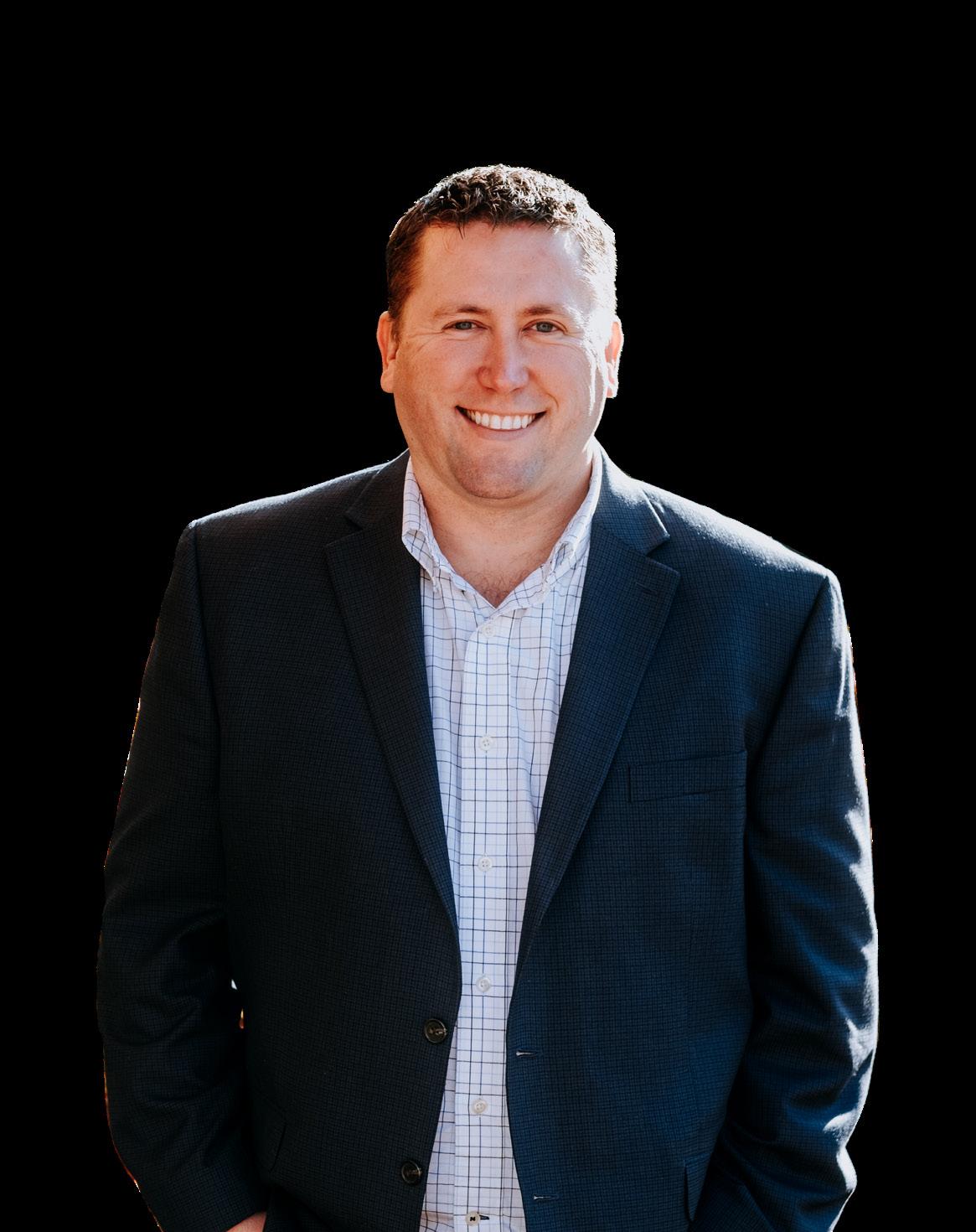


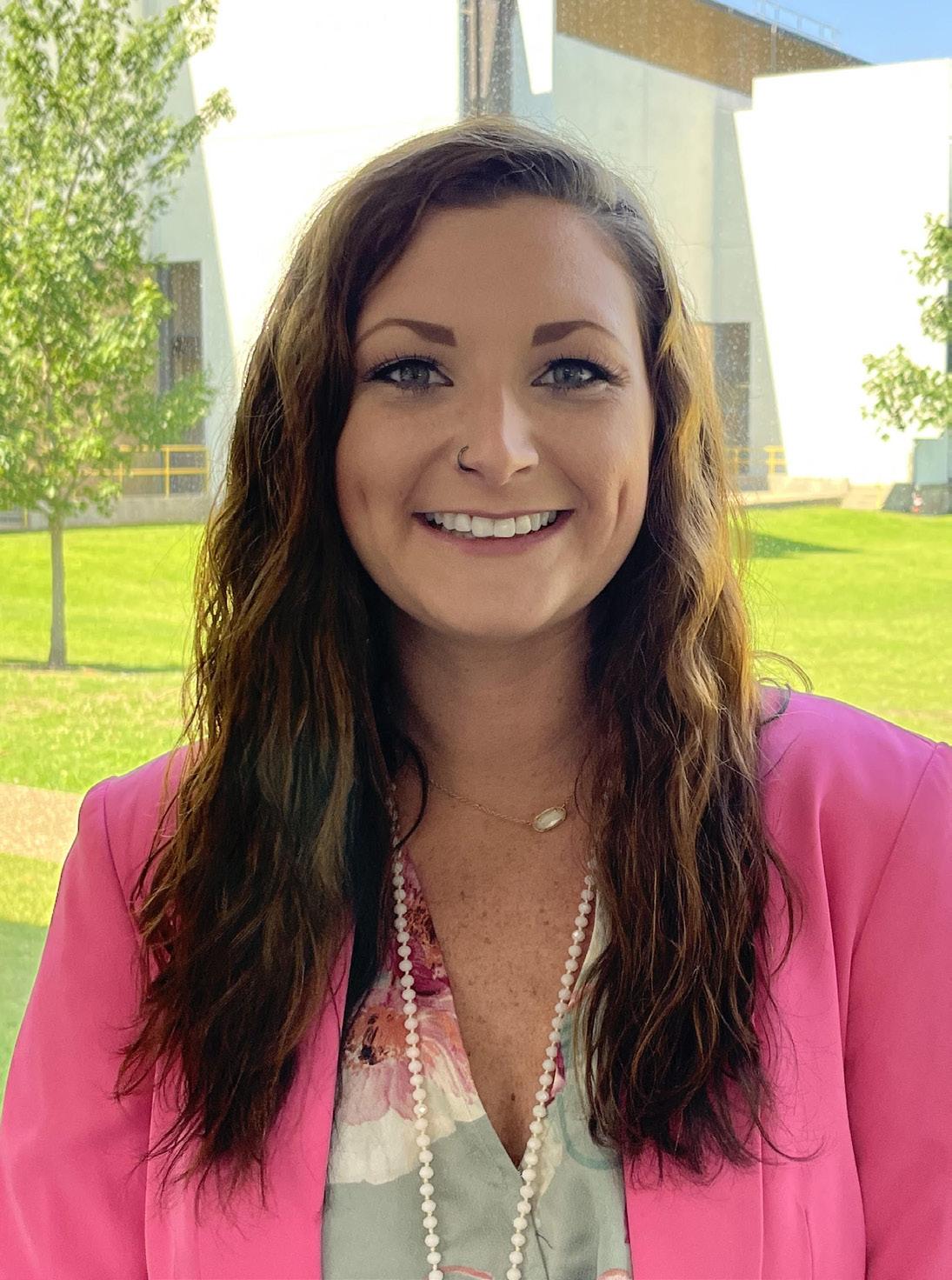
R&E Supply
Cory Miller is a dynamic professional serving as vice president at R&E Supply, a renowned company in the HVAC industry. With a Bachelor of Business Administration degree from Harding University, Miller possesses a solid educational background in business management. As a third-generation leader, he is proud to carry forward the legacy established by his grandfather, who founded R&E Supply. Miller’s dedication to the company’s growth is evident in his multifaceted role. In addition to his position as vice president, he serves as a board member of CGNA (Controls Group of North America), contributing his industry expertise to the association’s strategic initiatives.
With a keen understanding of the HVAC market, he recently spearheaded the reinvention of R&E Supply’s website. Leveraging his technical skills and knowledge, Miller successfully transformed the online platform, enhancing user experience and positioning the company as a technologydriven industry leader.
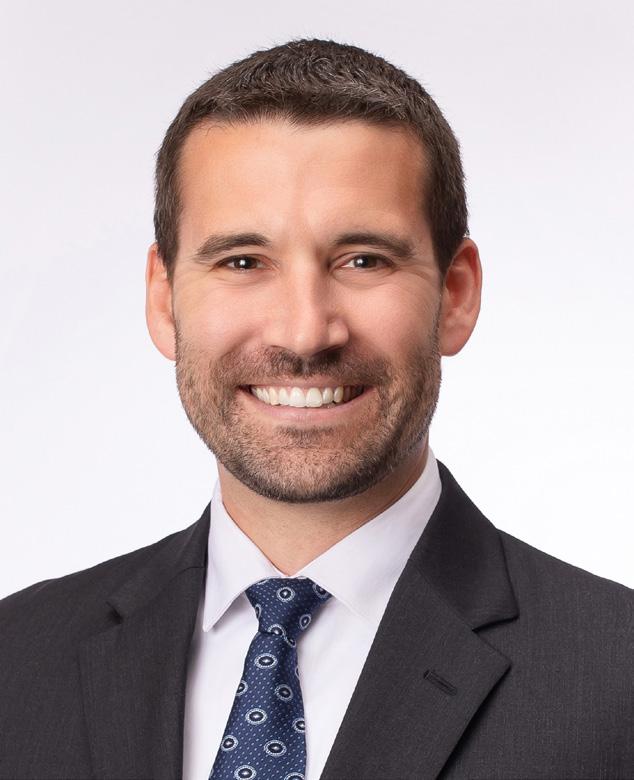
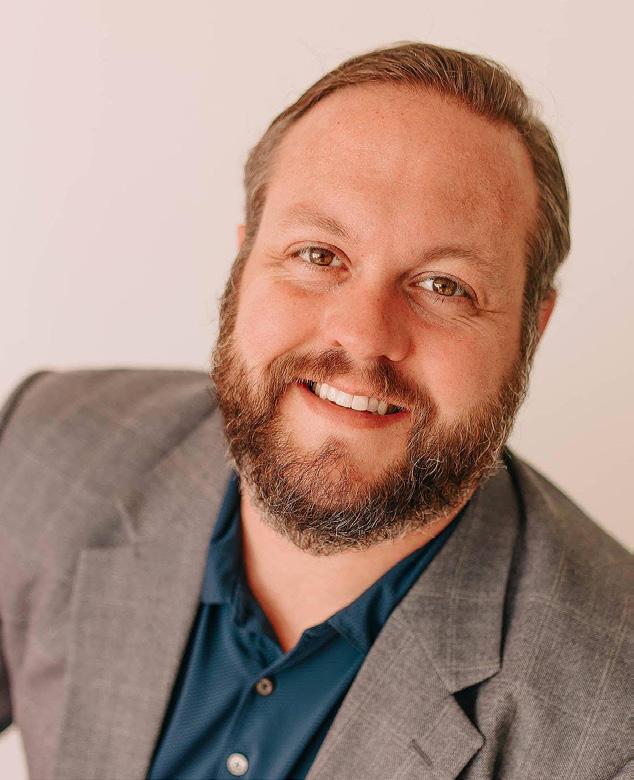
With a strong focus on customer satisfaction, innovation, and staying ahead of industry trends, Miller aims to further solidify the company’s position as a trusted and influential player in the HVAC sector. Through his leadership and commitment to excellence, he is determined to build upon the strong foundation laid by his grandfather and make a lasting impact on the industry.
Joey Msall, PE, ensures Black Hills Energy delivers safe, reliable energy for 183,000 customers in 106 Arkansas communities. He oversees natural gas system operations and integrity initiatives as well as 7,200 miles of infrastructure and construction investments to meet the growing demand for energy in the state while supporting a net zero target by 2035 with enhanced emissions detection and damage prevention efforts. Through his leadership, Black Hills Energy made a $120 million economic impact in Arkansas with 480 employees, charitable contributions and payments in 2022. A Leadership Arkansas Class XV alumnus, Msall serves on the Rogers Lowell Chamber and Arkansas 811 boards, among other community service efforts. A licensed professional engineer with civil engineering degrees, he has a B.S. from the University of Arkansas and M.S. from Missouri University of Science and Technology, along with an MBA from UA Little Rock.
Currently serving as the director of marketing at Conway Regional Health System, Lauren Norris is responsible for increasing brand recognition and spearheading advertising campaigns for all service lines. With a bachelor’s degree in graphic design from Arkansas Tech University and a master’s degree in business administration from the University of Arkansas at Little Rock, Norris combines her artistic expertise with her business acumen to drive results.
Norris is a dynamic professional known for her expertise in blending creativity and analytical thinking. Having experience in two seemingly opposing fields, art and business, she has honed her adaptability and thrives in challenging environments. Her success as an artist, leader and strategist has equipped her with the skills necessary to thrive in collaborative settings. With a belief that anything worth doing is worth doing well, Norris approaches every task with intention.
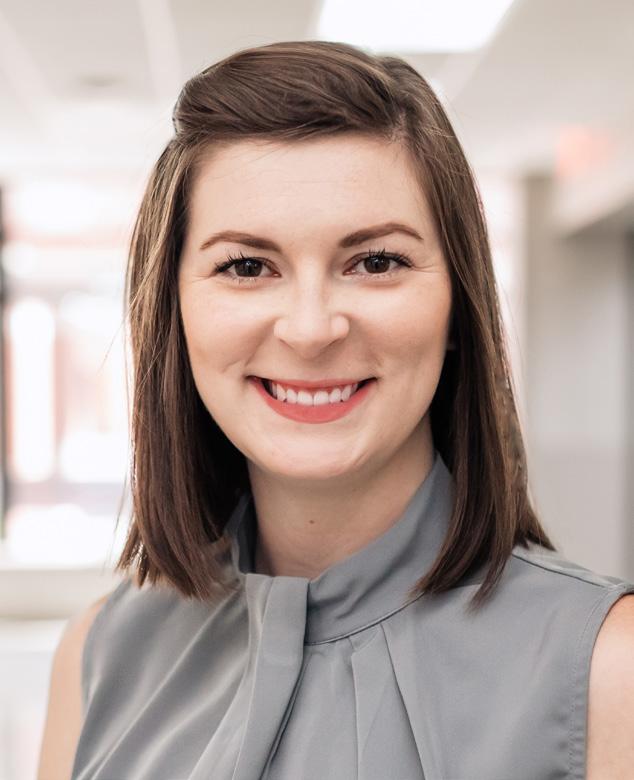
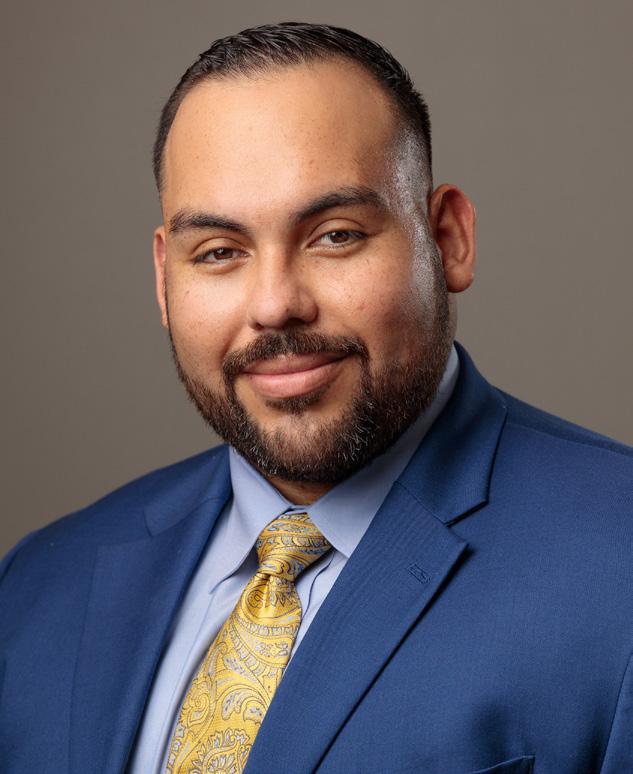
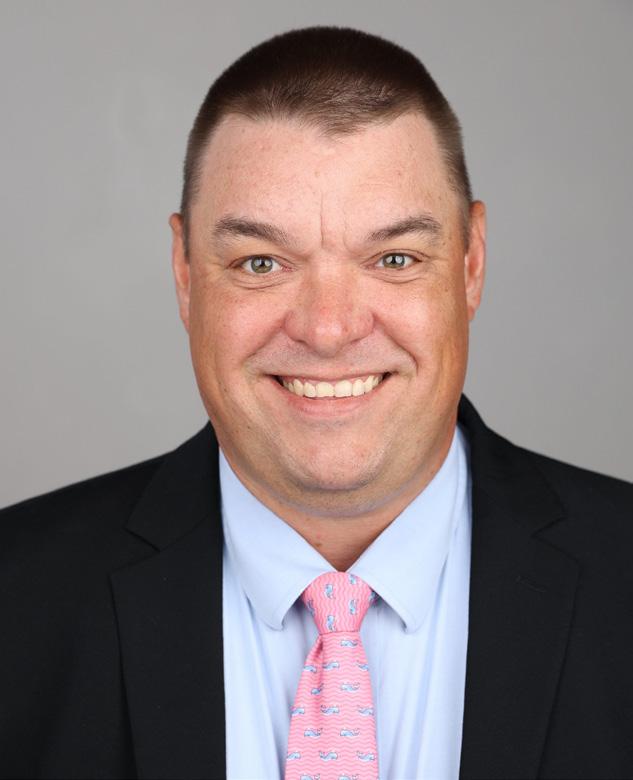
Bill Oliva is the vice president of commercial lending and diversity outreach with First Community Bank. Oliva came to First Community Bank as a student at Batesville High School, where he began in the maintenance department in 2007 before officially joining the bank in 2008. He has served the bank in various roles including marketing, insurance, Hispanic outreach and lending over the last 15 years. In his current role, he focuses on commercial lending within Independence County and the surrounding areas, as well as working diligently to provide quality-banking services to the underbanked communities in the area.
Oliva attended the University of Arkansas Community College at Batesville and is a 2023 graduate of the Barret School of Banking. He is participating in the 20222023 Leadership in Banking Academy with the Arkansas Bankers Association and Walton College Executive Education. He was the 2022 recipient of the Arkansas Bankers Association Bill Holmes Leadership award, a prestigious distinction that recognizes outstanding leadership among the emerging leaders in Arkansas banking.
Chris Oswalt is an attorney with Robertson, Oswalt, Nony & Associates, a boutique Little Rock firm specializing in domestic relations and probate and estate planning. Oswalt’s practice areas include family law, probate and estate administration and traffic violations, among others. Oswalt obtained his bachelor’s degree from Arkansas State University and his juris doctorate from the University of Arkansas at Little Rock William H. Bowen School of Law. He has been a member of the Arkansas Bar Association and has provided probono services through the Center for Arkansas Legal Services (VOCALS) since 2011.
Arkansas Travelers
Sophie Ozier joined the Arkansas Travelers in 2017 as a corporate event planner. After serving as an assistant general manager, she was named GM following the 2021 season. Ozier graduated from Webster University in St. Louis, earning a degree in public relations with a minor in media communications. During her time in St. Louis, Ozier interned with Fox Sports Midwest, the St. Louis Blues and the River City Rascals.
Ozier was born and raised in a small town in central Illinois called Cerro Gordo and is a fan of the St. Louis Cardinals and Kansas City Chiefs.

Chief
Conway Area Chamber of Commerce/ Conway Development Corporation
Corey Parks is the chief economic development officer for the Conway Area Chamber of Commerce and Conway Development Corporation. He manages the organizations’ community and economic development efforts and oversees talent and workforce development initiatives.
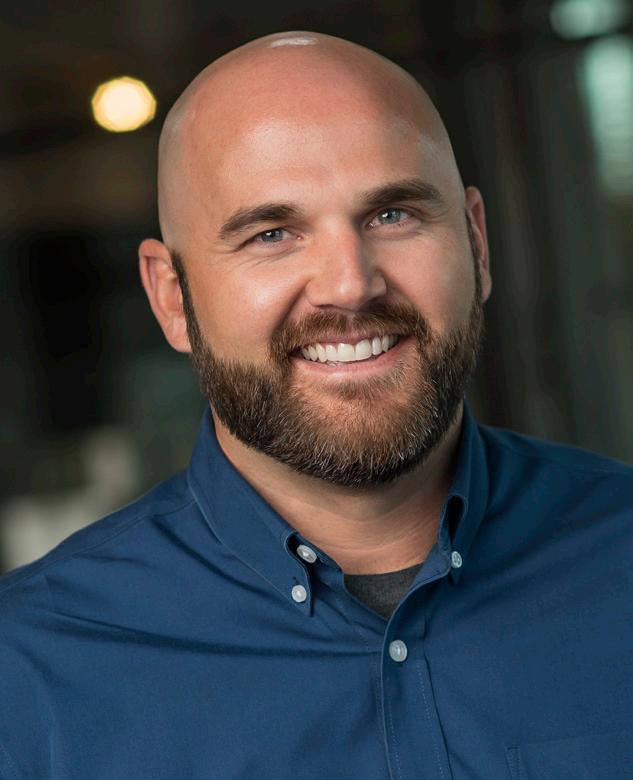
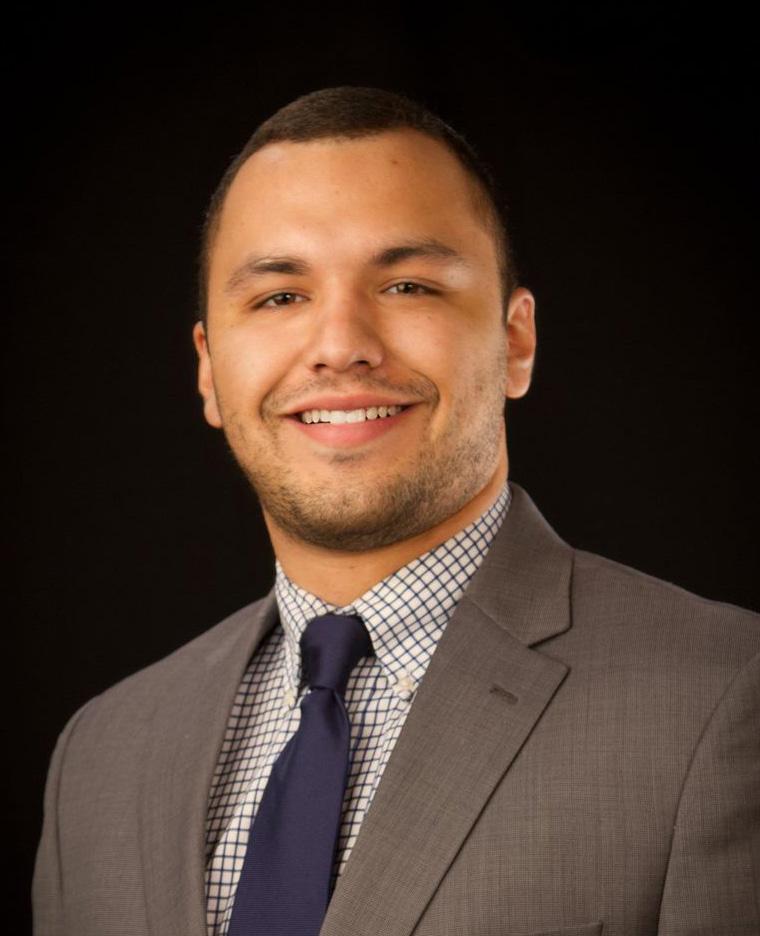
Parks earned a Bachelor of Business Administration in Insurance & Risk Management and Master of Business Administration from the University of Central Arkansas. He is a certified Professional Community and Economic Developer (PCED), designated by the Community Development Council, and is a graduate of the Community Development Institute and the University of Oklahoma Economic Development Institute.
He currently serves on the University of Arkansas Community College at Morrilton Board of Visitors, and the Board of Directors for the University of Central Arkansas Alumni Association, Arkansas Coding Academy and the Children’s Advocacy Alliance. Parks previously served on the Arkansas Economic Developers & Chamber Executives (AEDCE) board of directors.
L’Oreal USA
Leia Peek is a proud graduate of Arkansas Tech University in Russellville. At ATU, SHE earned her B.S. in Business Administration with a focus in Accounting. After graduating, she has earned an MBA from the University of Arkansas at Little Rock and passed her exam to become a Certified Public Accountant with the Arkansas State Board of Public Accountancy. Peek used her education to work and hone her skills in many areas such as accounting, finance, education and now manufacturing. She joined the L’Oreal USA team at the North Little Rock manufacturing plant after earning her MBA and has held several positions including internal control manager, plant lead for accounts payable and fixed asset manager. She most recently was promoted to senior finance analyst.
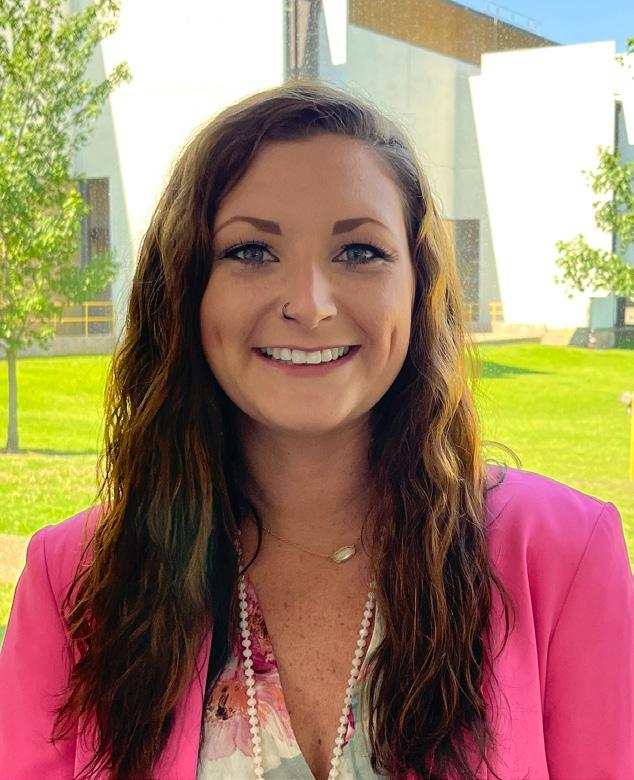
Colby Post is the vice president and regional director for the HP Engineering Northwest Arkansas team. With more than 15 years of experience in design, Post leads the mechanical, electrical and plumbing design teams in NWA. His responsibilities include organizing project teams, maintaining communication between the team and clients and leading meetings to ensure that projects meet objectives and stay on schedule.
His portfolio includes mixed-use and multifamily developments, higher education, commercial, industrial, retail and medical facilities. He graduated with a Bachelor of Science in mechanical engineering from the University of Arkansas in 2009.





Singer/Songwriter/Producer
Cliff and Susan
Cliff Prowse represents one half of the independent musical duo, Cliff and Susan. Prowse is a singer, songwriter, multiinstrumentalist, arranger and producer who honed his skills in the Mountain View town square. He has collaborated with many award-winning artists, producing more than 30 artists, and has recorded and performed in Nashville.
Cliff and Susan perform more than 200 acts a year around the world. The duo released its debut single, “Drivin’ Me Crazy,” in April 2020. Its signature song, “Fiddle & Keys,” released in January 2023, caught the attention of Mike Huckabee and lead to an invitation to perform on his nationally televised “Huckabee Show” in February 2023.
Stallion Transportation
Anative of Beebe, Garland Rice IV currently serves as vice president at Stallion Transportation. For the past 20 years, Rice has acquired extensive knowledge and experience, having worked in every department of the company. Under the influence of his father, Butch Rice, president and CEO of Stallion, Rice has developed into a strong and highly respected leader in his own right.
As a key figure on the executive management team, Rice is an important voice in all major decisions at Stallion. His understanding of the industry, loyalty to the company’s values and passion for continued growth and expansion, all make his insight indispensable.
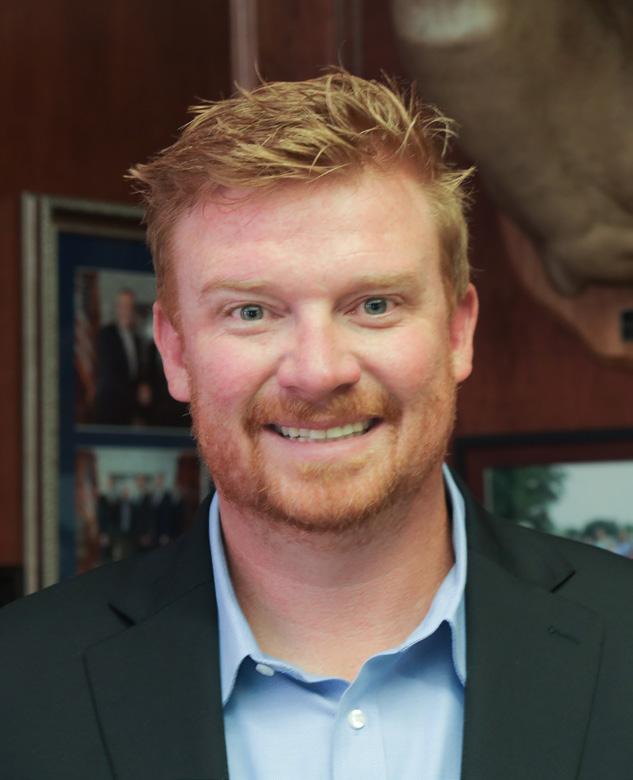
Rice also is heavily involved in Stallion Transportation’s charitable work. Over the years, he has been a “hands-on volunteer” and organized many company events supporting Special Olympics of Arkansas, Wreaths Across America, local and state disaster relief and a variety of other causes.
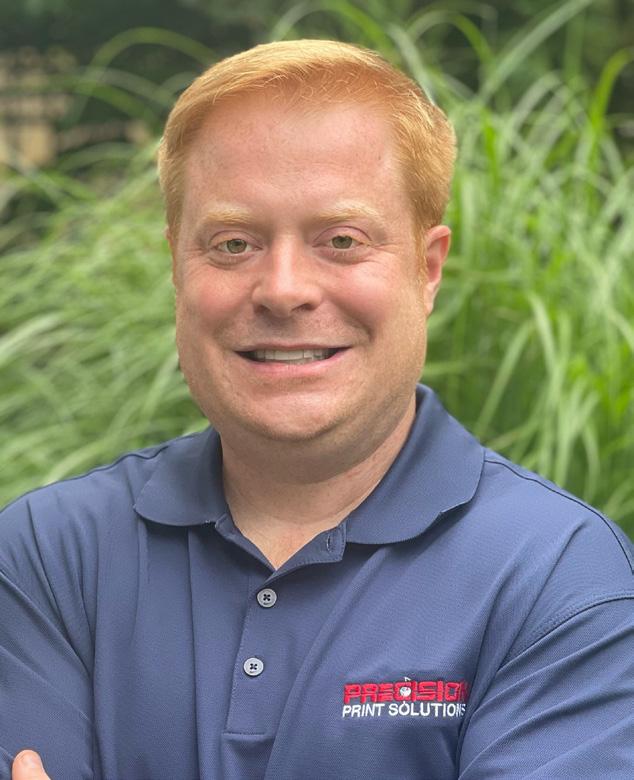

Precision Print Solutions Inc.
Matt St. Clair serves as president of Precision Print Solutions, a locally owned commercial printing company in Little Rock. After graduating from the University of Arkansas with a degree in small business management, St. Clair moved back to Little Rock to help lead Precision Print as a trusted provider of top-notch printing services. He values the importance of building strong relationships with clients and works closely with them to understand their unique needs.
Founded in 1974, Precision Print focuses on its tagline of “one company, many solutions” — earning consumers trust and delivering finished products across several platforms to reach their goals and objectives. Commercial printing, labels, signs and banners, promotional products, just to name a few.
St. Clair is active in his community and enjoys time outside, being at the lake, hunting and fishing, and coaching his daughter’s soccer team.
Eli Saldivar is a prominent e-commerce figure with 15-plus years of experience. Originally from Latin America, he holds international business and marketing degrees from John Brown University. Saldivar started by developing digital practices for leading agencies, including Publicis and Omnicom, serving Fortune 500 clients. In 2019, he joined Procter & Gamble to lead international e-commerce and marketing for Walmart, and then health care marketing and digital commerce. Notably, he oversaw the Children’s Safe Drinking Water Program, donating 50 million liters across 26 countries. In July 2022, Saldivar transitioned to PepsiCo to lead its Foods Online business, drawn by a commitment to current and future business success. He enjoys prioritizing people and empowering them to thrive — for example, by mentoring students and entrepreneurs through the University of Arkansas’ Technology Ventures program. Passionate about advancing Hispanic talent, Saldivar collaborates with LatinXNA on community development programs and serves as a board member of Banco Si!, a subsidiary of Signature Bank of Arkansas focused on serving the Hispanic population.

Cole Schanandore is an accomplished insurance agent at Ott Insurance in Conway, where he focuses on advising and helping businesses and individuals across the state protect what’s important to them. After growing up in Conway and graduating from the University of Central Arkansas with a bachelor’s degree in insurance and risk management, Schanandore went on to work for a Fortune 500 Company as an underwriter for two years. When an opportunity arose to leverage his education and underwriting experience in sales, he transitioned to a sales position at Ott Insurance, where he has been for the last six years. His ability to navigate the complex world of insurance policies and provide tailored solutions has earned him a stellar reputation among both individual and corporate clients. Schanandore is very active in the Central Arkansas community and industry associations.
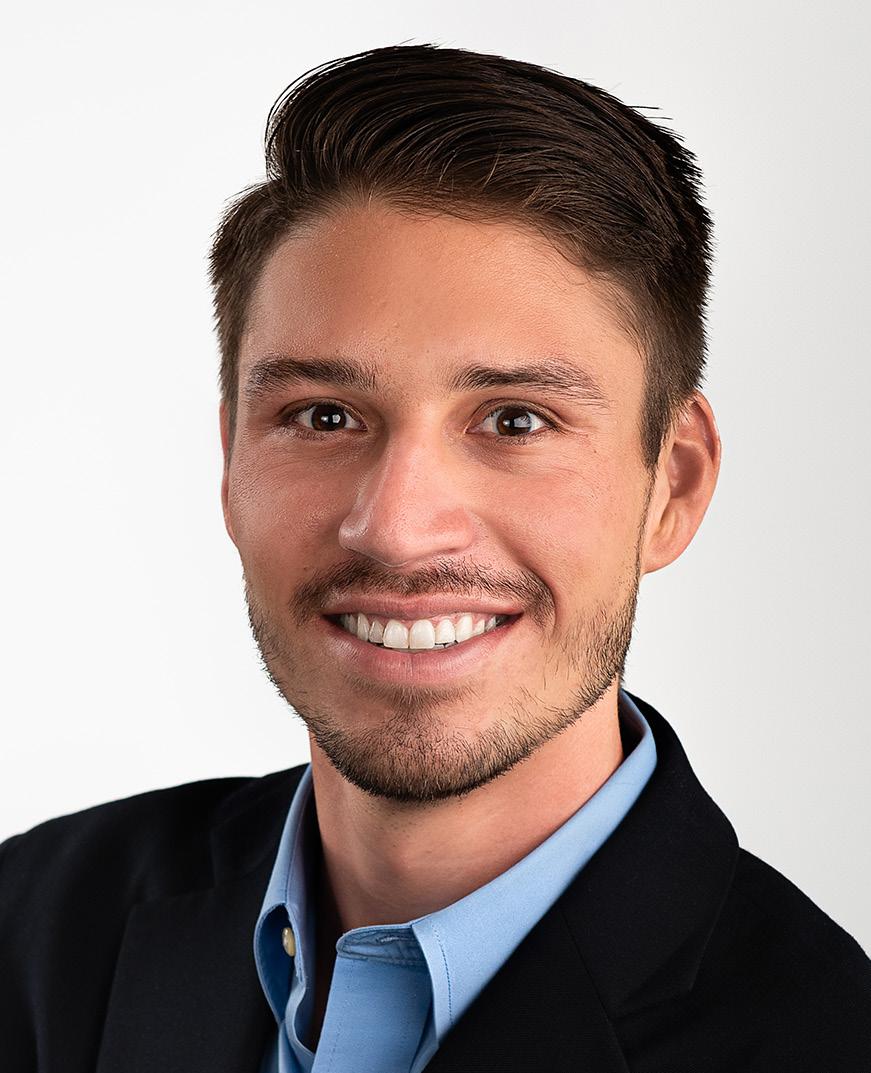
Max Shaw is the senior vice president of sales at Infinity Worlds, a division of the Barcode Group. Shaw worked to pay for college while he was a student at the University of Arkansas, graduating in 2006 with a bachelor’s in supply chain management and a minor in real estate financing. After graduating, Shaw worked for J.B. Hunt as a logistics engineer and senior implementation manager before becoming a sales analyst for Rich Products in 2013. This move allowed him to get his foot in the door of the supplier community. He became a national account manager for Pinnacle Foods before making Infinity Worlds his home in 2018. In this position, he has grown the business by 84 percent and managed $500 million in revenue. Shaw helps his community as well, serving as a board member for Micah’s House and as a volunteer with the American Diabetes Association.

Owner
Fat Bottomed Girl’s Cupcake ShoppeNot many people can say that they have taken the dive into entrepreneurship, but at age 22, Mackenzie Simon did. Her already robust portfolio is quite impressive. Since she graduated high school just four years ago, Simon has worked tirelessly to build her brands — Fat Bottomed Girl’s Cupcake Shoppe in Hot Springs and Fayetteville, and Mackenzie’s Extraordinary Gift Shoppe and Pour Some Sugar On Me Sweet Shoppe (both in Hot Springs). Simon had been a barista at Fat Bottomed Girl’s Cupcake Shoppe in the historic district of Hot Springs since her parents first opened it in 2011. She took over the family business in 2015 after graduating from high school. Simon believes being authentic is the most powerful characteristic that you can have. “A resilient, outrageously authentic woman is unstoppable,” she said.

Principal,
Moses
Tucker PartnersGreyson Skokos serves as a principal and vice president of brokerage at Moses Tucker Partners, a full-service commercial, residential and development firm, offering a full spectrum of real estate services for clients throughout Arkansas and surrounding states. After receiving his BBA in finance from University of Arkansas Walton Business College in 2015, Skokos began working for Moses Tucker Partners in the accounting and property management division. Quickly moving up the firm’s ladder, Skokos has played an instrumental part in the continued growth and diversification of the company’s book of business. In his work, he has represented real estate developers, Fortune 500 retailers, lenders, borrowers and other clients on complex commercial transactions. Skokos attributes his success to world-class leadership mentoring and a loyal team of hardworking contemporaries and says the firm’s rich history and impact on communities across Arkansas are what set it apart.
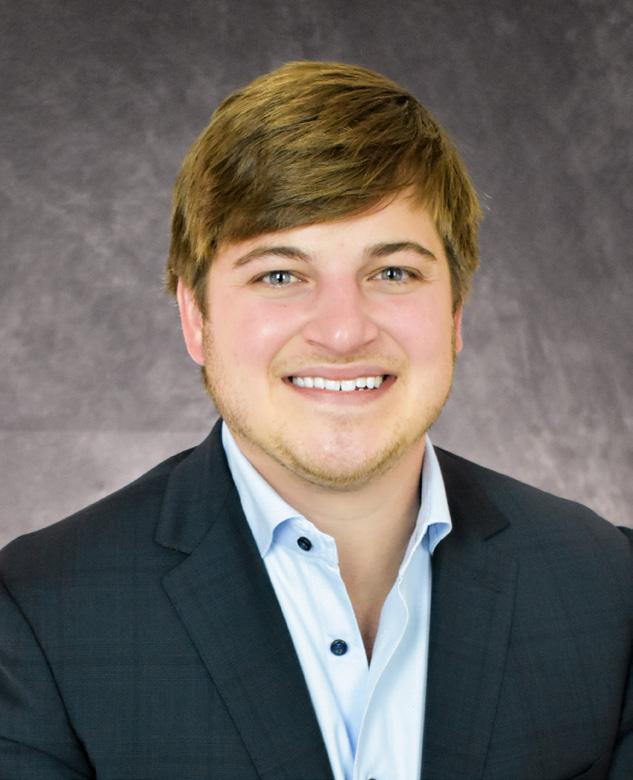
Jacksonville Parks and Recreation
Anative of Viola, Megan Tharp graduated from Arkansas Tech University in 2018 with her Bachelor of Science in Hospitality Administration and an emphasis in tourism and event management. Immediately after graduation, she accepted a position as the special event coordinator for Jacksonville Parks and Recreation. In 2019, she received the award on behalf of the department for Festival of the Year through the Arkansas Recreation and Parks Association.
After stepping away from her position during the pandemic, Tharp returned and accepted the new title of event and marketing manager. Within her current career, she oversees the Events & Marketing Department, where she helps to facilitate 18 annual events for the community and runs point on print marketing for the organization.
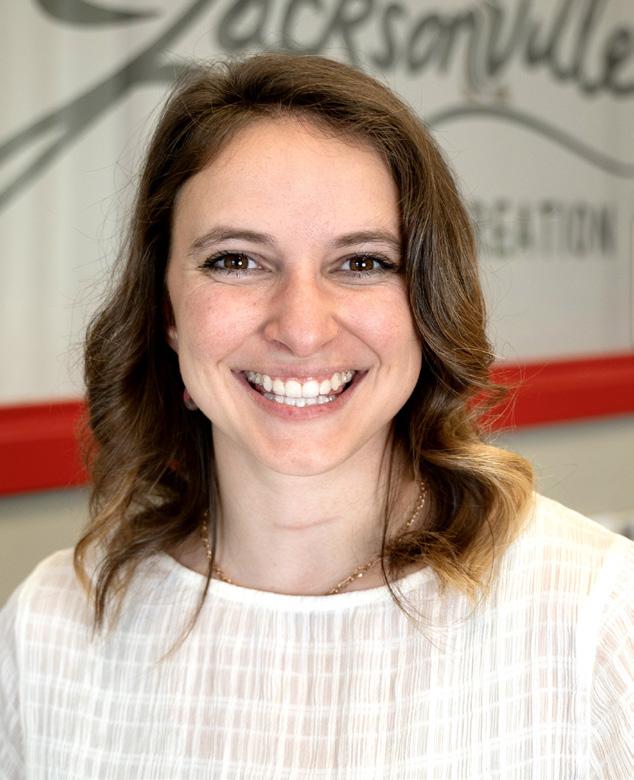
































Kendall Thornton serves as the chief marketing officer for Museum of Discovery, where she handles media relations and oversees promotional and creative initiatives for the 96-year-old science center. After receiving her degree in journalism with an emphasis in public relations and a minor in political science from Arkansas State University, Thornton began her career in nonprofit communications and later governmental public affairs. She describes the role she’s had for 10 years at the museum as her “dream job” due to never-ending unique experiences, such as coordinating appearances from Kevin Dulaney, the “science guy” from “The Tonight Show,” while he was a museum educator or promoting the Shock the Rock event that brought the world’s largest Tesla coil to Little Rock.
Senior Associate AttorneyAfter graduating at the top of her class from the William H. Bowen School of Law in 2019, Jalen Toms joined the Law Offices of Katherine Blackmon. With her trademark tenacity and strong work ethic, Toms worked her way up to become the Senior Associate Attorney at the family law firm. Prior to attending law school, Toms earned her Bachelor of Arts in Sociology from Louisiana State University. Her original goal was to be a veterinarian, thereby following in the footsteps of her father. After working as a veterinary technician for several years during her undergraduate career, it became clear to Toms that she has too soft of a heart to make the undeniably hard decisions that come with being a veterinarian.
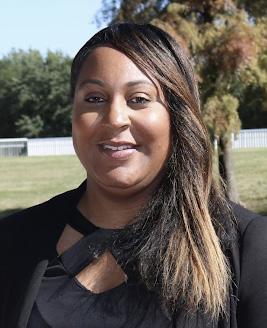
Toms’ decision to practice family law reflects the soft spot she has for those most in need of guidance and support. She believes her clients are often going through what could be considered the most emotionally fraught situations they have ever been in. Toms’ devotion to her clients is obvious not only in her willingness to listen and “handhold,” but in her energetic and zealous representation in the courtroom.
Since practicing at the Law Offices of Katherine Blackmon, the firm has been voted Best Law Firm in the state of Arkansas in 2021, 2022, and 2023 in AY Magazine. Toms continues her passion and love for animals by spending time with her three rescue dogs and three rescue cats and fostering animals whenever possible.
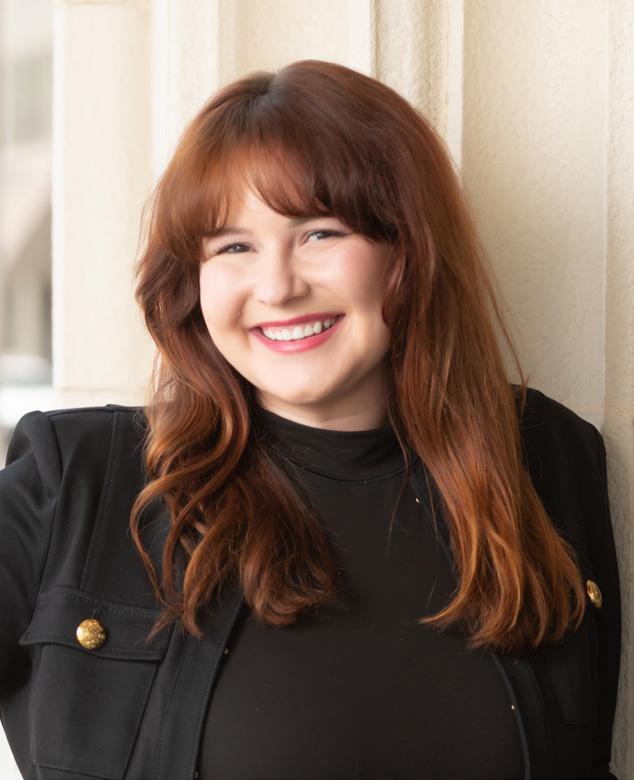
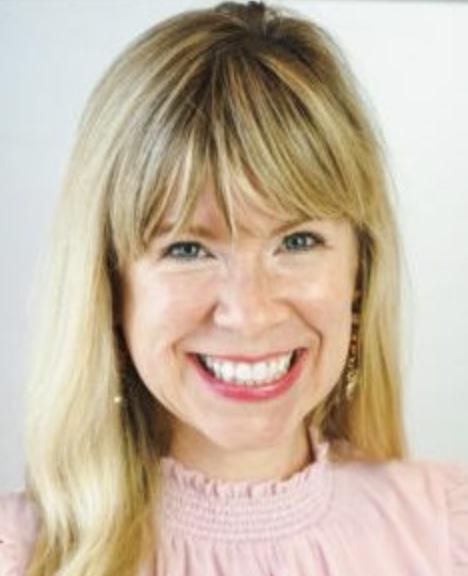 Soroya
Soroya
Soroya Tucker is an entrepreneur and the visionary behind the success of the valet trash industry. With a passion for excellence and a deep understanding of the multi-family landscape, Tucker recognized the need for a more convenient and efficient waste disposal solution. With a clear vision in mind, she founded VLS Waste Solutions, combining her entrepreneurial spirit with her strong environmental values. Under her leadership, VLS Waste Solutions has thrived, forging strong partnerships with property owners, management companies and homeowner associations. Her unwavering commitment to providing tailored solutions has earned Tucker the trust and respect of her clients and the admiration of her industry peers. She is a recipient of the Arkansas Apartment Association Supplier of the Year award in 2020, and she served as chair of the supplier’s committee and as a member of the Arkansas Apartment Association Board in 2021. She’s also participated in the 2021 Spark! class through The Venture Center in Little Rock and has been selected for the first cohort of the Minority Business Empowerment Fund initiative running from 2022 to 2023.

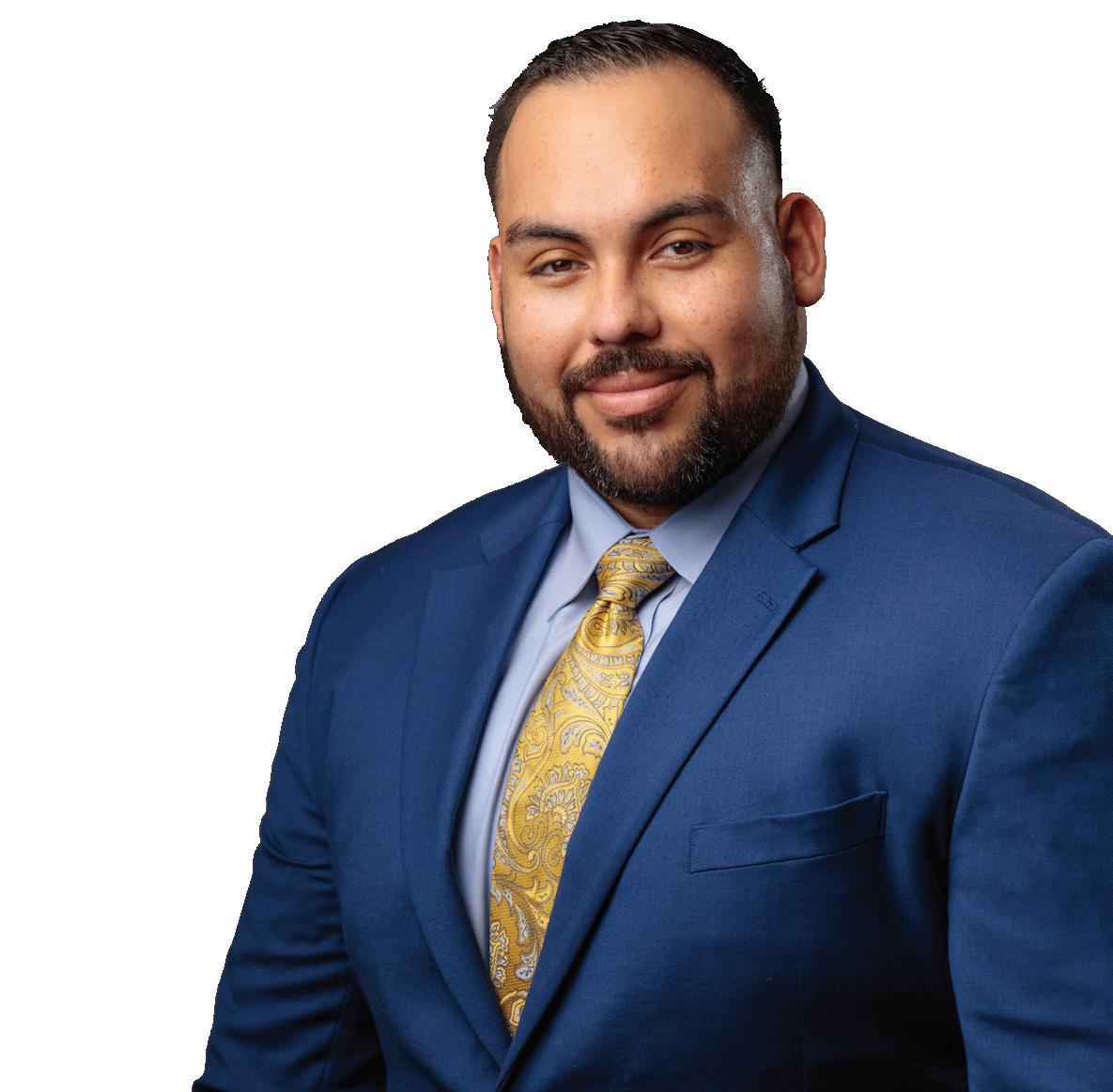



Tiffany Tucker is a native of Bryant and graduated from Ouachita Baptist University magna cum laude in 2009 with a bachelor’s degree in political science and mass communications. She obtained her juris doctorate from the UALR William H. Bowen School of Law. Tucker is an attorney at Farrar & Williams PLLC in Hot Springs, where has practiced primarily in the areas of trusts, estate planning, probate and elder law for the past decade.
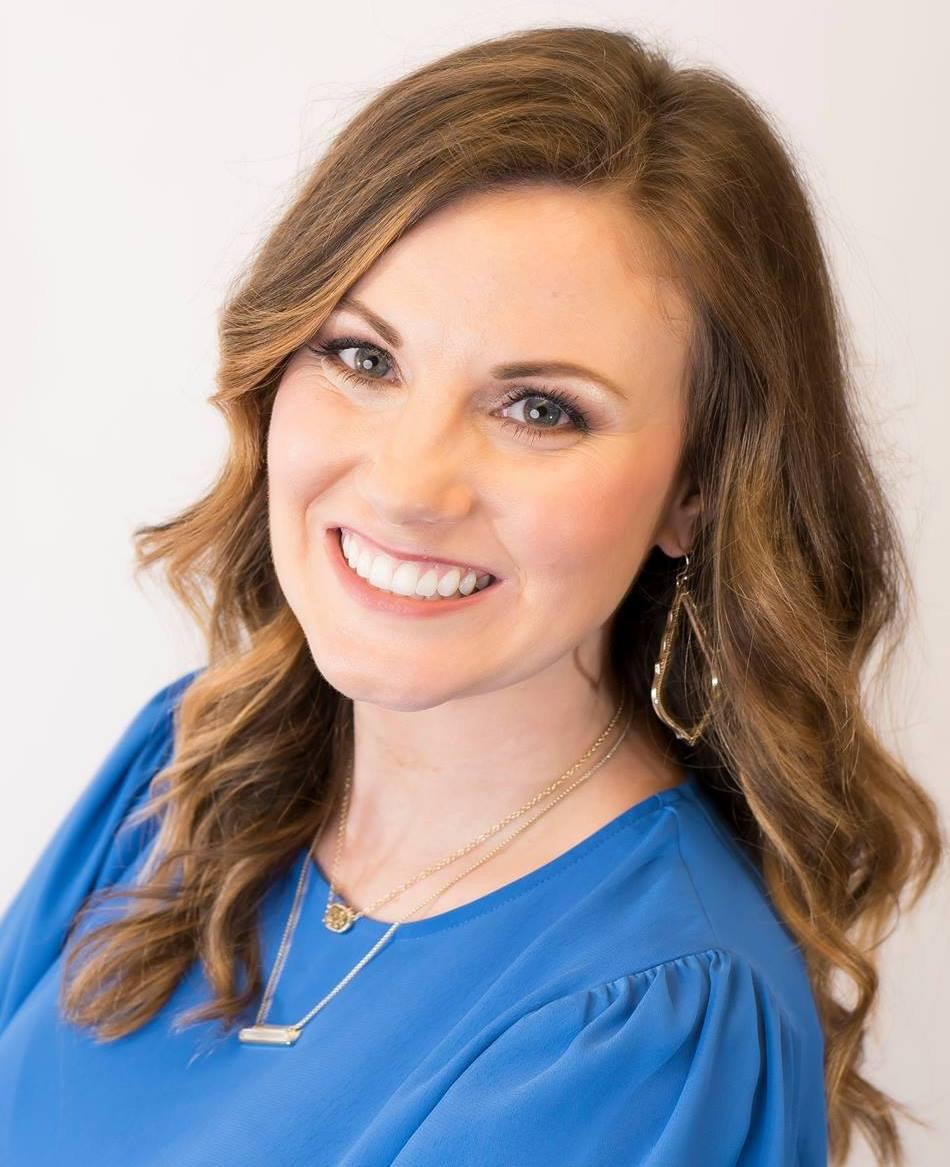
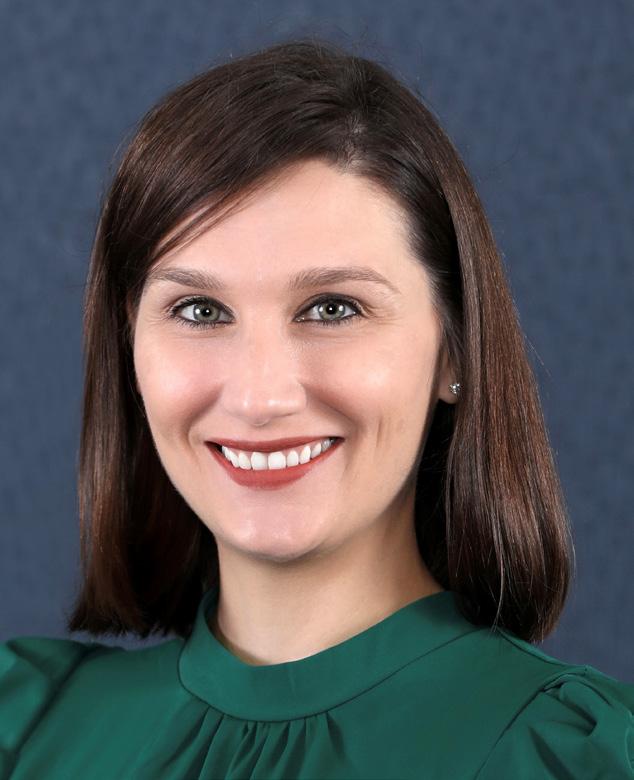
In 2021, Arkansas Money & Politics named Tucker one of its Legal Elites. She is the immediate past president of the Hot Springs National Park Rotary Club. She currently serves on the board of trustees of the Oaklawn Foundation, Hot Springs Fifty for the Future, the Greater Hot Springs Chamber of Commerce and its Executive Committee. Tucker was named as the 2016 Rising Star by the Greater Hot Springs Chamber of Commerce and served as the chairperson for the Mid-America Science Museum board of trustees in 2019.
Magen Tune has served in many different roles in her 14 years with Bank of America and currently serves as senior vice president and local market executive for Arkansas. In this role, she is responsible for business integration, strategic planning, coordination and leading the bank’s local philanthropic contributions, managing events and sponsorships and facilitating relationships with the community and opinion leaders.
Tune is an active member of the Arkansas Leadership Team, Bank of America Women’s Leadership Council and the local Power of 10 Women’s chapter. She is serving her fifth year as a board member, first year as the secretary for the Junior Achievement of Arkansas board and first year on the Our House board. She is a Bank of America Better Money Habits champion, meaning she teaches free financial education courses to Arkansans with community partners.
Trevor Villines, who serves as the communications director for Saline County Government, is responsible for educating the public about the county’s programs and events. These programs and events include details on elections, passports, tax payments, property assessments, public gatherings and road closures. Villines, a native of Saline County, graduated from Benton High School in 2015. He then enrolled at the University of Arkansas Sam Walton College of Business, where he received his degree in 2019. Villines has always been passionate about helping the local community in Saline County. While a student in the Benton School District, Villines had the opportunity to begin serving his community through roles such as president of the Benton Mayor’s Youth Advisory Council, director of Saline County MYAC’s BikeA-Thon and president of the Benton Superintendent’s Student Ambassador Group. Villines considers it an honor to continue serving his community through his role with Saline County Government.








Kownerof Indigo Counseling in North Little Rock. She is a Licensed Clinical Social Worker, Registered Play Therapist and is currently working towards being fully certified in Eye Movement Desensitization Therapy (EMDR) and clinical hypnosis. Walker has been providing services for over 10 years and provided more than 15,000 hours in the therapy room helping others cope with various issues.
In addition to Indigo Counseling, she is the founder and CEO of Grow and Guide Kids.

Grow and Guide Kids is a business she started in 2019 to help give parents, teachers, child-care workers, etc. simple techniques to utilize when working with children. She also uses this business to travel and train various groups of people around the United States. She is passionate about providing quality training to foster and adoptive parents as well as school districts. Walker also is the author of three social and emotional children’s books (“Alice and the Anger Sandwich,” “David and the Dandelion Thoughts,” and “Cora and the Coping Skill Umbrella”) and one mental health workbook for children to teach them about the brain (“WIRED: A Kid’s Guide to Understanding How the Brain is Wired for Safety, Satisfaction, and Success”). She plans to continue to write more books and create more curriculum surrounding mental health.
Founder and CEO

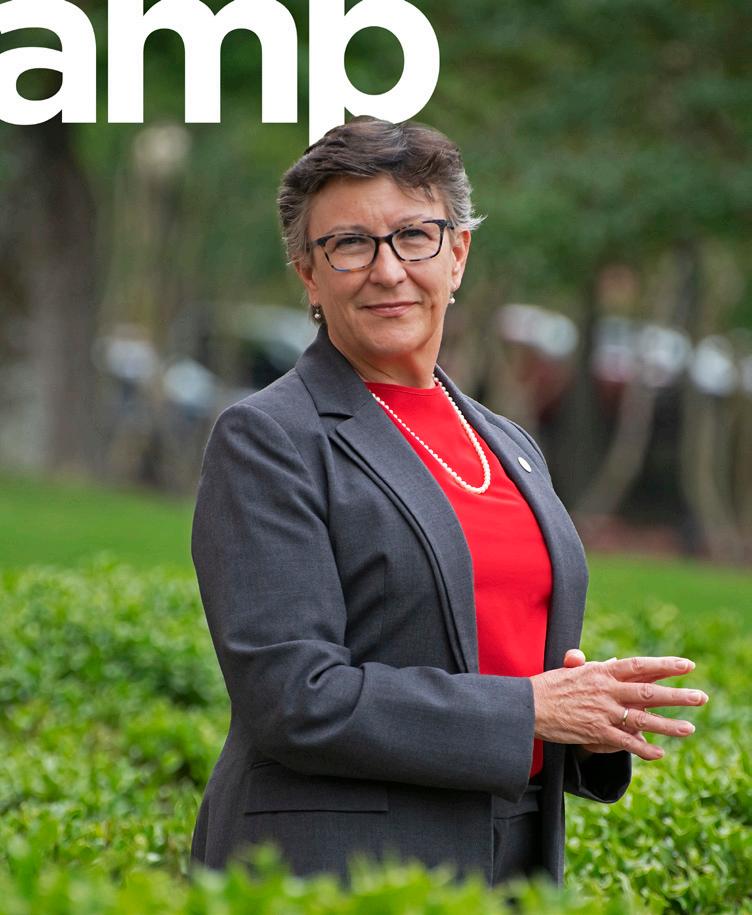
The W Agency

Corrie
Wilson is the founder and CEO of The W Agency Branding, Marketing and Media Limited Co. The company’s client base includes law firms, real estate brokerages, clothing brands, food companies and more. The company offers a wide range of services, including digital marketing, print marketing, business strategy, graphic design, photography and cinematography. The majority of the work is done by Wilson in house.
Wilson was born and raised in Helena before relocating to Central Arkansas in 2005. He spent years in sales, including B2B and real estate. He’s taken Harvard courses in entrepreneurship, economics and contract law. Wilson’s goal for The W Agency is to re-energize businesses that have hit a glass ceiling and introduce the next set of brands that will be household names.
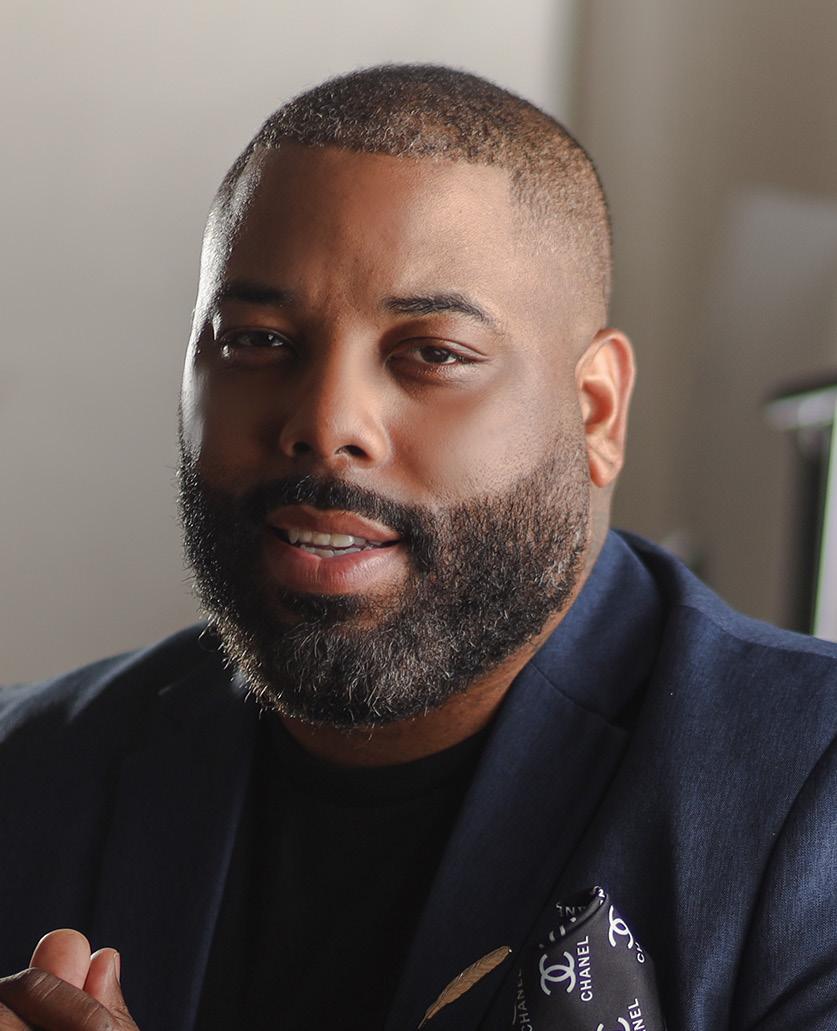
50 50 FUTURE FUTURE
After meeting in 2016, Cliff & Susan have toured internationally in over 7 countries, performed over 200 shows per year, and co-founded Big Red Dog Productions and the Entertainers Academy which helps independent artists have profitable music careers and stay current in today’s ever-changing music industry.



We met on stage in 2016, immediately formed our duo, then eloped in Vegas in 2017. We love doing what we love with the person we love. As entrepreneurs, we have co-founded Big Red Dog Productions, a music production and artist development company based in Little Rock, Arkansas. We co-founded an award-winning festival, Yadaloo Music & Arts Festival, and we tour the world performing over 200 shows a year together armed with a piano, fiddle, and guitar. ....and now we bring to you the Entertainers Academy!


cliffandsusan.live cliffandsusan cliffandsusan


More than 4,000 attendees converged on Northwest Arkansas for the annual Poultry Festival, held June 9 and 10 in Rogers. This year marked the 63rd festival, hosted by The Poultry Federation, and drew members and friends of the industry from across the country.
Based in Little Rock, The Poultry Federation is a trade association representing the poultry and egg industry in Arkansas, Missouri and Oklahoma. In The Natural State, the sector represents a major component of the overall agricultural industry, ranking second nationally in turkey production (26 million birds, representing 556 million pounds); third in broilers produced (1.1 billion birds, representing 7.4 billion pounds); and seventh in egg production value (4.2 billion eggs with a production value of $912 million.)
Last year, these three product segments supported about 158,000 jobs in Arkansas and combined for total economic activity of about $39 billion. In all, more than 6,500 farms in The Natural State raise some kind of poultry, led by top-producing counties Benton, Washington, Madison, Carroll and Yell, respectively. The Poultry Festival itself is an economic event, generating $3 million for the local Rogers economy, making it a coveted event on the yearly calendar.
“Destination Rogers and the Rogers Lowell Chamber were so thankful to have the 63rd annual Poultry Festival hosted in our community,” said Luke Wiggins, director of sales for Destination Rogers. “Every year, the hard-working professionals of the poultry and egg industry come together to celebrate their craft, and to be the city where that gathering occurs means a great deal to us. Plus, the event is a good time, and we like having a good time here.”
The two-day celebration, thrown this year on a Las Vegas theme, “The Chicken Strip,” featured awards, music, food and sporting events. The competitions included a golf tournament hosting 98 teams in Bella Vista, a trap shoot tournament of 125 individuals at Outlaw

Ridge, a bass tournament on Beaver Lake with 132 fishermen and the annual Women in Poultry event, which hosted close to 200 women.
At Friday evening’s awards presentation ceremonies, held at the Rogers Convention Center, individuals were recognized for leadership that has advanced the cause of the organization and its members. Kendra Waldbusser, global head of food safety and quality assurance at Pilgrim’s, received the 2023 Industry Leader of the Year honors while Greg Rucker, outside sales for Conveyor Technology, was named Allied Industry Leader of the Year for Processing. The 2023 Allied Industry Leader of the Year for Production was presented posthumously to Chip Blocker.
The event also brought out cooking
The team from Pilgrim’s won first place in the booth competition at the 2023 Poultry Festival.
(Photos provided)
talent through various competitions. The All Member Cooking Competition attracted 35 corporate participants, a record. Teams were awarded for their booth décor, which this year included slot machines, Elvis impersonators and an actual Vegas-style wedding. Winning the booth compe-
tition was Pilgrim’s, followed by Wayne-Sanderson Farms and Tyson Berry Street.
Participating companies also vied for top food honors in the cookoff. In the Chicken (Boneless) category, Wayne-Sanderson Farms took top honors followed by Tyson Chick N’ Quick in the Poultry Division. Allied Division winners were Elanco in first place, followed by 3D Corporation. Chicken (Bone-In) was won by Tyson Dardanelle in the Poultry Division. NWA Live Tyson was second and Pilgrim’s was third. Ambrose Packaging topped the Allied Division, followed by ARMI and UofA Posc, respectively. The Turkey (Boneless) category was won by Cargill Springdale, with Butterball in second and Cargill California in third.
Grand Champion honors went to Pilgrim’s in the Poultry Division and ARMI in the Allied Division. Ambrose Packaging was recognized with the Outstanding Sportsmanship award.
In addition, The Poultry Festival hosted the Arkansas 4-H State Barbecue Cook-Off, contested by 16 youth participants, each of whom had qualified at the county level. Awards were given to first, second and third place participants which included winners Jeremiah Moix of Saline County and Blakeley Thompson of Clark County in chicken and turkey, respectively. Jackson Russell of Izard County and Jake Castleberry of Bradley County were second and third in chicken, respectively, while runnerup Elizabeth Velasco of Monroe County and third place Gavin Hogue of Johnson County rounded out placements in turkey.
Federation allied member Vander Graaf provided lodging, grills, aprons and awards for participants of the 2023 state champion cooking competition.
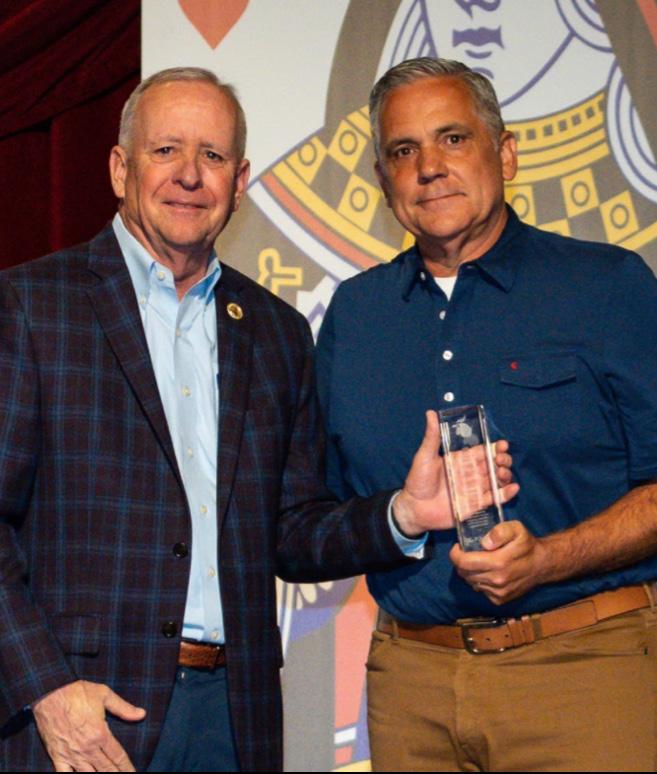
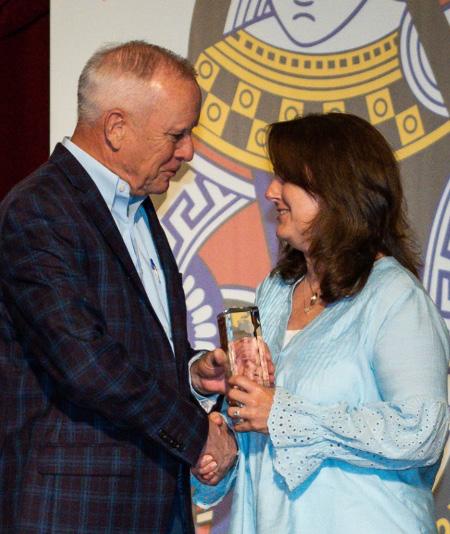
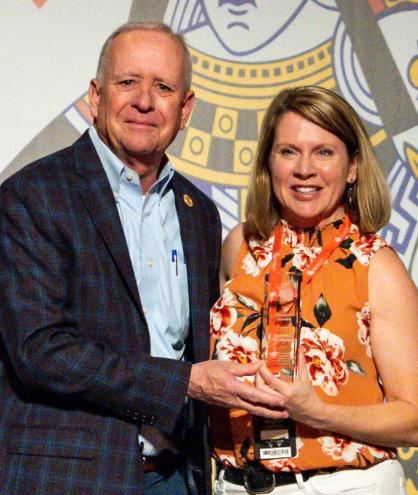
More than 6,500 farms in The Natural State raise some kind of poultry, led by top-producing counties Benton, Washington, Madison, Carroll and Yell.
“Our experience with The Poultry Federation and 4-H BBQ contest sponsorship was nothing short of spectacular,” said Rick Zander of Vander Graaf. “It was heartwarming knowing that some of the young participants had never traveled nor stayed in a hotel, and this was their first opportunity to experience a poultry-industry related event.”
Federation members also leaned into youth through the 27th Annual Allied Industries Scholarship Auction, raising a record $135,000. Funds raised help The Poultry Foundation provide scholarships to deserving young people across its three-state


Wayne Sanderson Farms took home second place in the booth competition (top), and ARMI (bottom) won second place in the Allied division of the Chicken (Bonein) competition.
The festival wrapped up with a live show from Chris Janson with opening acts Ray Fulcher and Southerland.
service area who are interested in pursuing a career in the poultry and egg industry.
“Our members believe in the power of investing in the future leaders of the industry,” said Holly Duval, The Poultry Federation’s director of marketing and business development. “We are thankful for the tremendous support that we have received from our members. They are the reason we can continue to provide scholarships to students across the tri-state region.”
The weekend concluded with a festival concert at the Walmart Amp. This year’s entertainment included headliner Chris Janson with opening acts Ray Fulcher and Southerland.



Arkansas Money & Politics understands and appreciates the value of having women in positions of power. Our December issue will feature profiles on the Arkansas Power Women who are leading and making significant contributions in their careers, community and society. Nominate a woman in Arkansas who deserves to be recognized for her time, efforts and character.



 By John Callahan
By John Callahan
ooking for a job has a lot in common with looking for love — in all the worst ways. Say you’ve just gotten out of a years-long relationship/ career, and now you’re looking to move on. It would be great to skip ahead to the first date/interview, but first you’ve got to get noticed. Unless you have a friend who knows someone, these days there’s a good chance you turn to the internet. You find something that seems promising, try to highlight all your best qualities, and carefully craft your opening
line/cover letter to be just right. Yet after all of that, you’re almost lucky if anyone bothers sending you a rejection instead of just ghosting you.
Sometimes, what you need is for someone else to serve as a matchmaker, which is exactly what the Little Rock Regional Chamber of Commerce is doing with its recent “Love, Little Rock” talent attraction campaign. You’re out of luck if looking for romance, but out-of-state job hunters have the chance to make a life-long connection with a Central Arkansas business.
Through targeted advertising, the campaign reaches out to professionals around the country with a connection to The Natural State, such as previous residents or who have relatives from the state, and connects them with a list of partnered companies that currently numbers 47 and is growing. Moreover, any job offer they get through the campaign comes with a $10,000 signing bonus, followed by another $5,000 at the end of their first year in Arkansas.
The new campaign is the successor to another campaign of the same name in 2017. When Amazon announced its “HQ2” project and cities around the country jockeyed to be Amazon’s new home, the Little Rock Regional Chamber recognized that the city simply did not meet the requirements put forth by Amazon, such as a metropolitan area with a population of more than 1 million people and access to an international airport. Yet the chamber didn’t let the window of opportunity pass by.

“We used the HQ2 project as a way to tell the world that, ‘Hey, we might not fit for that, but we fit for all of these other things,’” said Jay Chesshir, president and CEO of the Little Rock Regional Chamber.
The original “Love, Little Rock” campaign featured a full-page ad in The Washington Post and an aerial banner over the Amazon HQ in Seattle announcing a “breakup” between Little Rock and Amazon with the phrase “It’s not you, it’s us,” while also showcasing what Little Rock had to offer. Amidst a flurry of larger cities attempting to promote themselves, the campaign attracted national attention and likely contributed to Amazon’s later decision to expand in Little Rock, building more than 5 million square feet of space and hiring thousands of workers.
“I’m amazed at how many times I’m in meetings with my counterparts from across the country,” Chesshir said, “or just having a conversation with somebody and they go, ‘Weren’t you the guys that did the ‘Love, Little Rock’ campaign?’”
The new campaign launched on May 1, or “501 Day,” meant to celebrate Little Rock and the rest of the 501 area code. Yet the concept began more than a year ago, when
an anonymous community benefactor approached the Chamber about the possibility of a talent attraction campaign similar to those that had been done in Northwest Arkansas, Tulsa and Richmond.
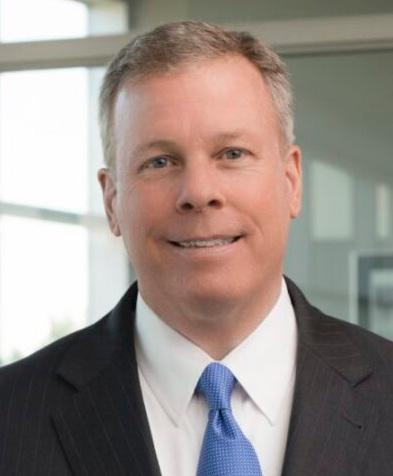
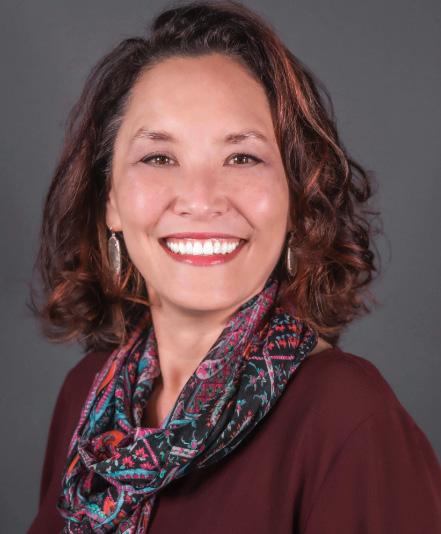
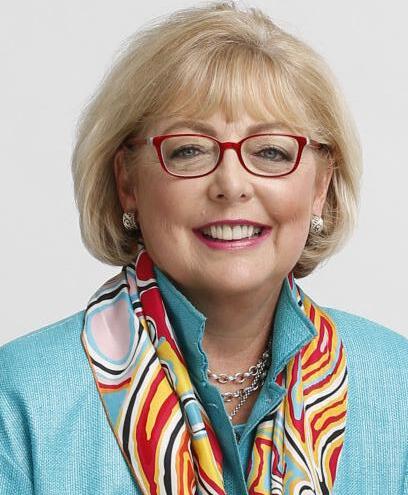
Not one to jump the gun, the team at the Chamber started doing the necessary homework. Chesshir contacted a national association of CEOs to help research what other talent attraction campaigns had been successful doing and why. Meanwhile, Kristi Barr, director of HR & Talent Initiatives at the Chamber, led a survey of large businesses in Central Arkansas, regardless of industry, to identify where they were struggling in talent acquisition.
With findings in hand, they set out to develop a campaign that would secure funding from the community benefactor and address the needs of local industries. To make the campaign a reality, the Chamber turned to Stone Ward, the advertising agency responsible for the original “Love, Little Rock.”
“In an ad agency, we have a couple of [tasks], and one of them is to frame out the client’s objective in the form of a great idea, and then figure out how to best express that idea across as many channels as possible,” Stone Ward Co-Founder and President Millie Ward said. “One thing I’ve always loved about Jay Chesshir and the Little Rock Chamber is that, when he gives you a challenge, it’s usually a large challenge that has within it a lot of imagination already applied.”
The original “Love, Little Rock” campaign is one such example; though Stone Ward helped create the campaign, it was a board member of the Little Rock Chamber that had the idea to tell Amazon ‘no.’ Likewise, the Chamber came to Stone Ward with the goal of a successful talent attraction campaign that stood out from the competition while building on the Little Rock brand.
“We got our team together numerous times and had a number of brainstorm sessions,” Ward said. “One of the things that kept rising to the top was this idea of a love connection, because what we’re trying to do is be a matchmaker, much like they do on a dating site. And it really fit nicely with ‘Love, Little Rock,’ because we do want it to be a love connection.”
Another product of the brainstorming session was the campaign’s referral aspect, which makes it unique among talent attraction campaigns: The first 50 people to refer a friend who is successfully hired through the campaign will be awarded $501 for their efforts.
“Let’s pay our own people, who are our best ambassadors, to be our real ambassadors, our referrers in this campaign,” Ward said. “We’ve had over 200 people that referred friends or family or what-
ever their connection was. That’s a way for our message to spread exponentially beyond what the media can pay for.”
The next step would be to reach the target audience for the campaign, those skilled professionals in the right industries with enough of a connection to Arkansas to draw them in.
“Our thought was, as beautiful as Arkansas is, it’s probably going to be hard to
“My husband and I had a list of things that were important to us, and when we started looking at Little Rock and Central Arkansas, we were checking off all the boxes and had no idea that it was available.Jay Chesshir Millie Ward Crystal Kohanke
convince someone from Chicago who has never been to Arkansas to move here,” said Brett Parker, director of Media and Digital Services at Stone Ward. “But if we found that right engineer or right whoever [that] is from Arkansas but now lives in Dallas, our chance of success was going to go through the roof.

“So, we had to focus on reaching the right people at the right time, but it’s also the right location. We could find someone who’s in Portland, but even with ties to Arkansas, it’s going to be really hard to move them back compared to someone from Dallas.”
To target the right people at the right time and place, Stone Ward worked to create an “ideal persona” of the perfect candidate, using 70 data sources to build a pool of potential candidates. Many digital
targeting efforts make use of cookies that track website usage, but this is something of a shotgun approach. Stone Ward needed more precise, one-to-one targeting, so it turned to sources like Dun & Bradstreet, a business analytics firm, as well as platforms like LinkedIn and Foursquare, to pinpoint, for example, an accountant working in St. Louis who graduated from the University of Arkansas.
Once ideal candidates are identified, they find a “Love, Little Rock” ad appearing in their social media feed. Clicking on the ad leads them to the campaign’s landing page at MovetoLR.com, where they can submit a resume. The webpage also functions as a sort of dating profile for Little Rock itself, espousing the city’s most attractive qualities, such as cost of living, commute times, outdoor and cultural activities and, of course, food. The page notes “potential matches” from the Chamber’s partners, including the University of Arkansas for Medical Sciences, Dassault Falcon Jet, Apptegy, Remington, Simmons Bank and the city of Little Rock itself.
Also included are video testimonials from prominent Little Rock citizens, such as Victoria Ramirez, executive director at the Arkansas Museum of Fine Arts; Christopher Harvey, senior advisor to the mayor of Little Rock; and D.J. Williams, news anchor at KARK, all explaining how they fell for the city and what they love most about it.
Crystal Kohanke, SVP and chief people officer at Arkansas Children’s, explained what the campaign looks like from the business partner end.
“We say, ‘Here’s our profile, here’s the kind of positions that we’re looking for.’ [The Chamber] makes it really easy for us to get the CVs, the resumes and screen through them,” Kohanke said. “The unexpected plus is that we’ve been getting candidates for positions that we didn’t even really think about at the time, so it’s actually broader than what we initially envisioned. It really helps us to have partnerships like this, because they’re helping us sell Arkansas.”
Kohanke herself could be the poster child of the referral system; she had never been to Arkansas before her current job and had never even considered looking for employment here until someone she respected suggested looking at a position at Children’s.
“My husband and I had a list of things that were important to us, and when we started looking at Little Rock and Central Arkansas, we were checking off all the boxes and had no idea that it was available. We came from a really large city, and the community [in Little Rock] is lovely, all the things that were important to us are here. It’s been a really fun transition, but I would
never have given Arkansas a second thought if someone hadn’t said, ‘You really need to check this out.’”
Every business taking part in the campaign is required to offer a minimum sign-on bonus of $10,000 to any candidate who is hired through the campaign. As some of these positions already come with a sign-on bonus, that number may end up being even higher. The bonus is paid for by the company. After the new hire lives in Little Rock or another city in Central Arkansas for one year, the Little Rock Regional Chamber will then pay the $5,000 retention bonus from a pot of $1 million dollars in funding that it received from the community benefactor.
That cuts out to some 200 bonuses beyond the initial $10,000. And if 200 skilled workers across a variety of industries don’t sound good enough on its own, no doubt many will bring partners and families along with them as well. With the sheer variety of companies and industries taking part in the campaign, there’s also a decent chance that a married couple could both find jobs through “Love, Little Rock” and both receive that $10,000 bonus. And if they bring children with them, the impact starts to reach far beyond the company
where they are hired.
“Think about what that means to public schools,” Chesshir said. “We’re seeding more growth into communities and the region and schools. Now, all of a sudden, that multiplier effect from an economic perspective begins to go up significantly. And so, it’s not just about the person and the job, it becomes more than that. It becomes helping the world understand why this is a great place to live.”
The “Love, Little Rock” campaign has so far exceeded expectations. Within the first week, the Chamber received more than 150 resumes. In the months since, hundreds of Arkansans have referred others to the campaign.
Ever wanted to help the Central Arkansas community grow? It’s never been easier – just try your hand at matchmaking.

 By Becky Gillette
Legacy Wine and Spirits, Little Rock (Photo by Jamison Mosley)
By Becky Gillette
Legacy Wine and Spirits, Little Rock (Photo by Jamison Mosley)
Ever gone on a vacation in Arkansas only to find that the county you are visiting is dry? It might be quite a drive back to a liquor store on the county line of the nearest wet county. Or what about buying a six pack of beer or a bottle of wine on a Sunday? It can be hit or miss even in the same county over whether alcohol sales are allowed on Sundays.
The crazy hodgepodge of liquor laws in Arkansas dates to an earlier, more conservative age when a lot of people opposed liquor sales in their county. Arkansas has 46 wet counties and 29 dry counties. The two counties that most recently voted to go wet in the 2022 election were Hot Spring and Polk. Other counties that voted to go wet over the past few years include Sevier, Van Buren, Sharp and Randolph.

“The two big issues we hear about from consumers are dry counties and Sunday sales,” said Bill Paschall, a consultant with United Beverage Retailers of Arkansas. “UBRA’s position on each of those is that the local communities should make determinations as to whether an area is wet or dry, and local communities should decide whether they want Sunday sales. Recent history shows a number of counties have chosen to go wet, and many towns and cities have opted to allow Sunday sales when the decision is placed in voters’ hands.”
But it can be a steep road getting voter approval for alcohol sales in a county. In order to place a wet/dry vote on the ballot, 38 percent of registered voters in that county must sign a petition. Only then do voters get to choose whether the county goes wet, said Scott Hardin, spokesperson for the Arkansas Alcohol and Beverage Commission (ABC).
Some people have found a way to get “wet” in dry countries. For example, Faulkner and Craighead counties are dry but have a large number of private clubs that serve alcohol.
“You can’t purchase a six pack at a convenience store, but there are a large number of locations where you can have a drink,” Hardin said. “These are the wettest dry counties.”
There are 21 cities that have approved Sunday sales. With the exception of one community (Arkansas City in Desha County), they are concentrated in northwest and north central Arkansas.
“We do wonder why other communities across Arkansas are not pursuing this, especially from a tourism perspective,” Hardin said. “Larger communities like Bentonville and Rogers have proven it is possible.”
Cities with Sunday sales include Briarcliff, Mountain Home, Norfolk, and Salesville in Baxter County; Bentonville, Rogers, Gentry, Garfield, Pea Ridge and Avoca in Benton County; Diamond City and Lead Hill in Boone County; Eureka Springs in Carroll County; Arkansas City in Desha County; Altus, Ozark and Wiederkehr Village in Franklin County; Pyatt and Summit in Marion County; and Springdale and Tontitown in Washington County.
Legal retail alcohol sales are part of contemporary economic development environment, said Mervin Jebaraj, director for the Center for Business and Economic Research at the University of Arkansas.
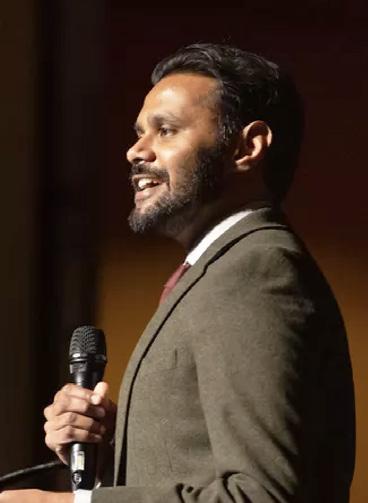
“I think in general, when you think of the kind of economic development that is popular today, it has a lot to do with building places where people want to live,” Jebaraj said. “You need the amenities people are looking for, including social places like restaurants and bars. Those are harder to operate in dry counties than wet counties. I think in people’s minds, the legal framework around dry counties is a bit archaic in 2023. Liquor is still being consumed. You just aren’t getting the economic benefit of it because the sales and sale taxes are being transferred to neighboring counties where their cities, counties and schools benefit.”
Stan Hastings, CEO of Moon Distributors in Little Rock, doesn’t have any issues with Arkansas liquor laws. He said if you look at how restrictive state laws are across the country, Arkansas sits right in the middle.
“I don’t think the laws are convoluted at all,” Hastings said. “We have very good laws for consumers, wholesalers and retailers. There are more than 25,000 alcohol items available in Arkansas to a consumer. That is a great selection. As for dry counties, that is an individual decision for people in that county. I don’t ever get involved with those. It has been proven repeatedly that the bar is not set too high. Counties go wet in almost every election cycle, so it is obviously not that big a deal.”
Hastings feels the same about Sunday sales; if local residents want it, they can approve it with a vote. Arkansas is ranked 48th in the country in consumption of alcohol, but he thinks that has to do with it being a conservative state — not the liquor laws.
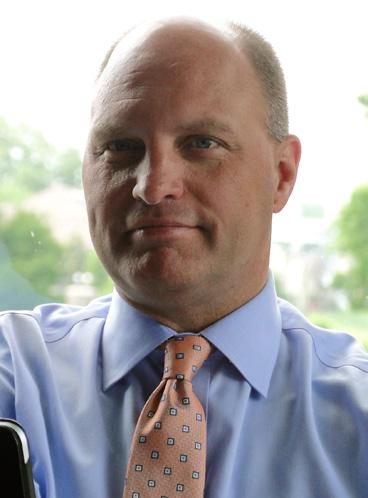
“Arkansas is not the only state with dry counties, and less than half of the U.S. states have Sunday sales,” Hastings said.
He does have an issue with online liquor sales, because online retailers don’t have to follow the same regulations as in-state retailers. Online retailers don’t have to be permitted by the state and don’t pay taxes, for the most part.
“I don’t think online retailers should be held to a lesser standard than a retailer who operates by the laws in the state, pays taxes and has very specific penalties for breaking the law,” Hastings said.
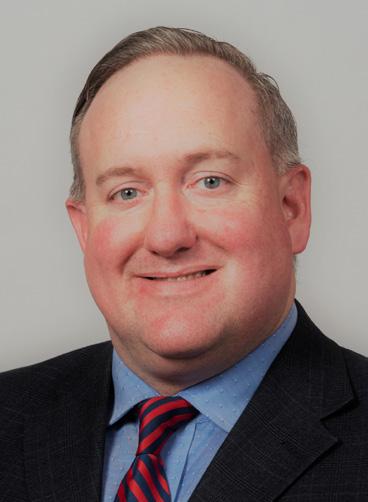
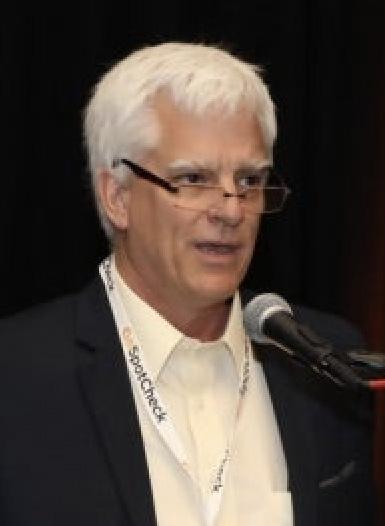
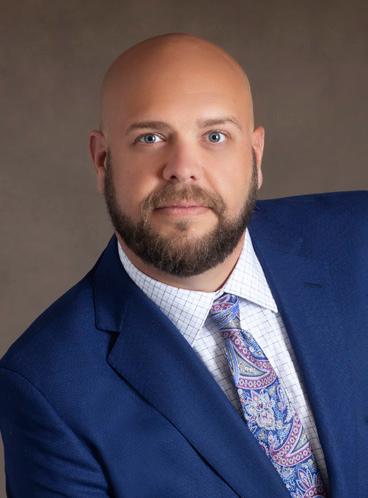
John Akins, owner of Legacy Wine and Spirits in Little Rock and president of UBRA, also has a problem with online sales.
“Shipping alcohol in and out of Arkansas is illegal, but a lot of people order products online and have it delivered,” Akins said. “Big outlets like Wine.com ship into Arkansas knowing it is illegal. Yet, retailers are held to the law and can’t ship alcohol out. If at John Akins
some point it becomes legal to ship into Arkansas, retailers want to make sure they can ship out to make that fair.”
Another major concern for retailers is competition from big-box retailers. Walmart sells beer and wine, and Costco in Little Rock and Sam’s Club in Bentonville have licenses to sell liquor. Akins said this creates a disadvantage for the retail liquor stores.
“They can sell alcohol and not have to worry about margins because they make their money off merchandise items that liquor stores can’t sell,” Akins said. “It is a very uneven playing field. What should be done? It is a hard question. I don’t think box stores should be able to sell liquor. Right now, the big-box stores are supposed to meet requirements that they have a separate store with a separate entrance and staff, but we think they will come to the legislature next year to get it approved to sell spirits in their stores.
“There would be no way for small liquor store owners to recover from that. The big-box stores make money off tires, milk, toilet paper and many other items. Our business is not set up for that. Legally, the only thing we can sell is beer, wine and spirits.”
Arkansas also doesn’t allow liquor stores chains. One person can hold only one license.
Akins said retail liquor stores like Legacy and many others are community-oriented, including being generous with donations to charities.
“The more money we lose to the big-box stores, the less we are able to do that,” Akins said. “If those same charities go to big-box stores, they probably won’t get a donation of wine and spirits.”
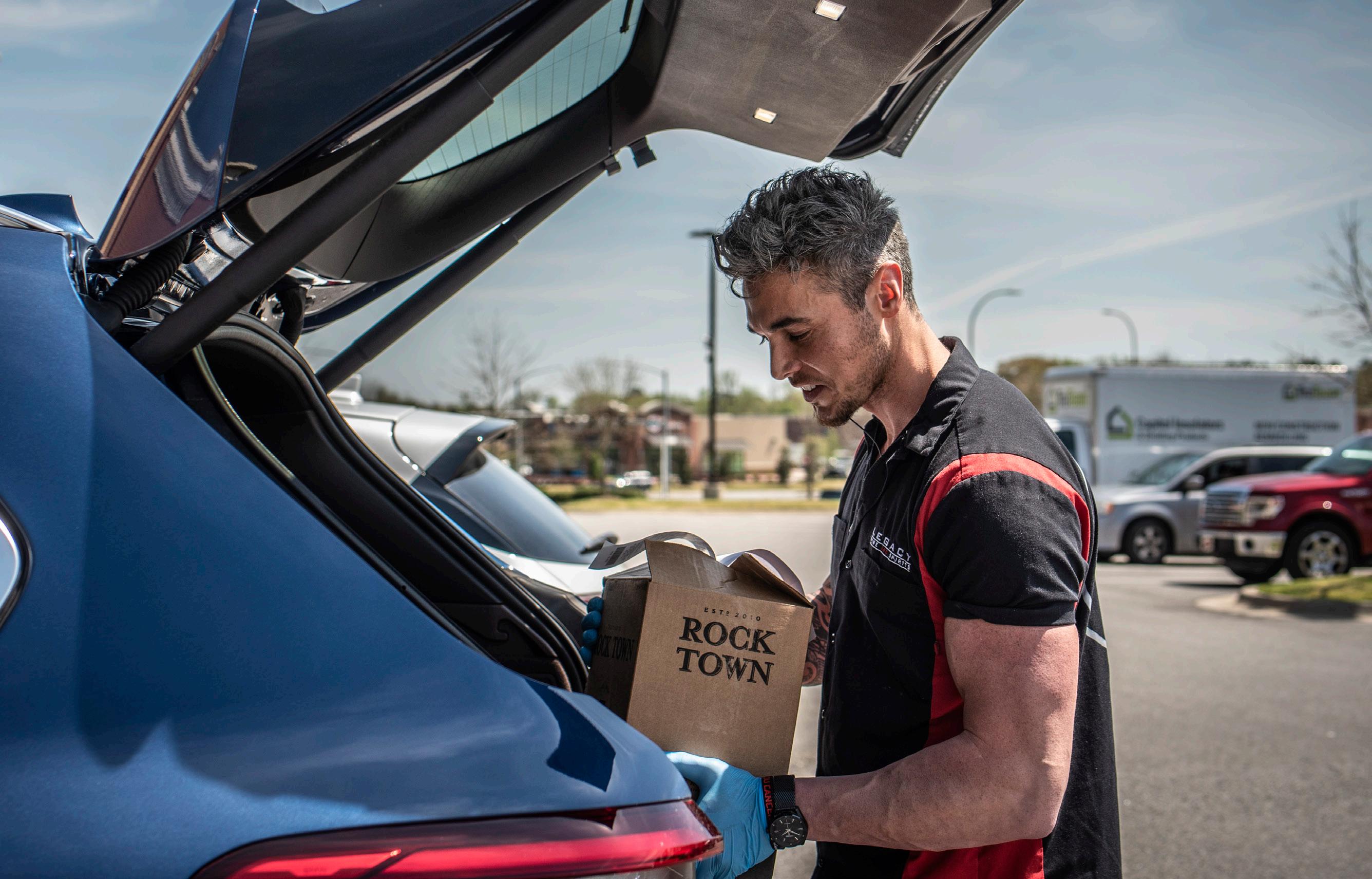
When laws were changed in 2016 to allow wine sales in big box stores, it immediately took 20 percent off retail wine sales from liquor stores. Akins said if liquor is allowed to be sold in grocery stores — which is a likely possibility — it is going to hurt the retail liquor stores even more.
Alcohol sales create a lot of tax revenues, but the exact amount is not known because permit holders are not required to report sales to ABC. As a result, ABC doesn’t have any statistics on total sales. However, permit holders that produce alcohol (wineries, breweries, distilleries) are required to report annual production totals.
In 2022, the DFA’s Revenue Division reported the following in tax revenue: beer excise tax, $5.1 million; 3 percent liquor excise tax, $16.2 million; 4 percent additional mixed drink tax, $6.9 million; state mixed drink tax collection, $19.4 million. There are also wholesale taxes on beer, wine and liquor.
Three months into a corporate job was all it took for Kyle Tabor, founder and CEO of Blue Sail Coffee, to realize his industry was not in sync with his aspirations or passions. The Vilonia native and University of Central Arkansas graduate yearned for a trade that reinforced the significance of community and encouraged perspective growth — something Kyle had experienced in Italy a decade ago.
In 2013, at 20 years old, Tabor set out on a month-long, solo backpacking trip to Italy, which he originally centered around cycling, a growing interest of his. The plan was altered as he immersed himself into the culture and developed a strong connection with Italian coffee shops and their community atmosphere.
This riveting affair sparked a “Conway needs this” foresight, and the work to transform a dream into reality began. Tabor spent the next year developing a business plan to bring his coffee shop to life and introduce his hometown to the experience Italy unexpectedly gifted him.
Fast forward through UCA graduation and three months at Hewlett Packard, Tabor, now unemployed and 21 years old with just a month’s rent in his pocket, secured a property lease in
downtown Conway, and Blue Sail Coffee was no longer a conceptual idea. Opening a coffee shop was no easy task, though, as he quickly learned while experiencing the hardships of being a new and young business owner. For its first few months open, Tabor slept on a cot in the back of the coffee shop while solely running the front himself.
“I was so broke whenever I opened the coffee shop,” he said. “I opened without any furniture or décor, and I built the bar out of free pallet wood I found behind the dumpster.”
Blue Sail was more than just coffee or a cafe where locals could stop in for an espresso and bagel on their way to work, though. For Tabor, the significance was much deeper than the milk-frothed design on his hot caramel lattes. Italy revealed the power that was in community
It took a backpacking trip to Italy for Vilonia native Kyle Tabor to dream up Blue

and coffee, but it was his adventurous spirit that led him overseas.
“Traveling is almost always the best way to gain a new perspective on the world. I believe you can learn a lot about yourself and the world around you while traveling,” Tabor said. “You almost always come back from adventuring a better person.”
It was this perspective growth that Tabor wanted to introduce to Central Arkansas. He wanted to do so by inspiring people to adventure more. Blue Sail was the perfect vessel to connect community and adventure through coffee, and he knew the best way for people to buy into his mission was to show them.
Known as The Coffee Explorer, Tabor started a YouTube channel to capture the raw moments of his travels as he sourced coffee from around the world. This unique pathway to connect with his audience provides full supply-chain transparency on the details of Blue Sail’s relationship with its coffee farmers. The majority of the coffee Blue Sail sources is from Brazil but also includes a selection from countries including Honduras, Colombia, Costa Rica, Ethiopia and Indonesia. As The Coffee Explorer, Tabor has traveled to each of the countries he sources from except for his African supply — a destination he’s already lined up
as “next on the list.”
By 2016, Tabor was far from the new business owner sleeping on a cot in the back of his cafe as he expanded wider into Central Arkansas with the opening of an additional cafe location in the Little Rock Technology Park. Three years later, Kyle started a new venture — coffee roasting.
Located in North Little Rock, the roasting facility today is operated by six employees and is lined with a plentiful selection of white, 20,000 pound bags of raw coffee along the full length of the wall waiting be roasted, grinded, bagged and sealed before shipping off to wholesale vendors including mom-andpop grocery stores, other local cafes, Whole Foods, select Target locations and now in more than 500 Walmarts across eight states. Even so, the hardship Tabor experienced in the beginning and his successful growth could not have prepared him for the unprecedented threat that came as a detrimental force — COVID-19.
Three words you’ll hear Kyle repeatedly say when talking about Blue Sail Coffee. His mission to inspire people to travel more by connecting community and adventure together through coffee was severely hindered by the pandemic that stopped the world in 2020. His cafes grew silent as the seats stayed empty, the coffee sat unbrewed and the doors remained closed while the pandemic ran rampant with no end in sight. Tabor’s business model was no longer viable.
Traveling and adventure became nonexistent as communities sheltered under lockdowns and restrictions. As his sales continued to plummet, Tabor faced the grim reality that resulted in the closure of the Tech Park cafe in 2021.
In order to survive this unparalleled event as a small business owner, he adapted by transitioning toward the e-commerce
“Traveling is almost always the best way to gain a new perspective on the world. I believe you can learn a lot about yourself and the world around you while traveling. You almost always come back from adventuring a better person.”

market through an online, monthly subscription model. Staying true to Blue Sail’s original mission, the e-commerce model was intertwined with a virtual travel experience for customers that was comprised of a monthly coffee adventure. Each bag featured a scannable QR Code designed to deliver one of Tabor’s travel videos straight to the customer’s phone, introducing them to the coffee farmers of that particular bag of coffee. Every bag of
coffee sold through this subscription model was roasted and sealed at the roasting facility in North Little Rock.

This model illustrated a creative way to continue inspiring people to adventure more by bringing the adventures to the customers, but Tabor took this concept a step further to integrate the community portion of Blue Sail’s mission. Every purchase through this model donated 2 percent of the order to conservation efforts that benefited Arkansas rivers through organizations such as the Buffalo River Foundation.
“We [Blue Sail] came out the other side [of the pandemic] a better company because we have a better idea of who we are and what we want to do now,” Tabor said.
While he acknowledges the trials and obstacles of e-commerce after trying to make the concept work for the last two years, it did bring forth a new perspective that Blue Sail is going all in on moving forward — environmental conservation.
“[Italy] inspired the ideas to start this company, and it’s the spirit of adventure that lives on and fuels everything we do from the way we look to our environmental conservation pieces to where we are trying to go,” Tabor said.
Blue Sail’s latest environment conservation outreach is the biggest initiative yet, on the heels of Tabor announcing a partnership with the Ocean Blue Project, an Oregon environmental nonprofit founded in May. The Ocean Blue Project was started by a father-and-son duo in 2012 and has become one of the biggest names in ocean conservation with partnerships from major companies like Patagonia, Google, Wells Fargo and Boxed Water. The Ocean Blue Project coordinates more than 200 beach cleanups annually while working with more than 6,000 volun-
teers to remove plastic waste items from the ocean, which are collected for upcycling and repurposed into new items, such as shampoo bottles, or sent to special landfills for recycling. The nonprofit reports that 55 percent of America’s waterways are in poor condition, and more than 8 million tons of plastic flow into our oceans every year.
Through the partnership, each bag of Blue Sail’s “The Backpacker and Honduran Hills” coffee selections will remove one pound of ocean plastic with the Ocean Blue Project. While the goal of this partnership is to increase Blue Sail’s contribution to ocean conservation, Tabor also wants to educate Arkansans on how they can help remove ocean plastic despite feeling disconnected from the ocean.
“One thing people don’t realize is 90 percent of ocean plastic comes from landlocked cities,” Tabor said. “Plastic on the side of the streets in Conway flows into the [storm] drainage system, which gets into the Arkansas River and then into the Mississippi before reaching the Gulf and into the ocean.”
While only two Blue Sail Coffee selections garner the Ocean Blue Project tag, Tabor’s goal is to have each of his coffee selections incorporated into the partnership with the ultimate goal
of removing 1 million pounds of plastic by 2026 from coffee sales alone.
The partnership with the Ocean Blue Project isn’t Blue Sail’s first conservation initiative. In addition to the donations from the online orders with the subscription model, Tabor hosts annual river cleanups with the most recent cleanup of the Buffalo River in April removing 2,200 pounds of trash with the help of 50 volunteers and contributions from five organizations, including Patagonia.
Over the last nine years, Tabor has immersed himself into community, experienced the world through adventure and developed a practice to connect the two through coffee. These avenues transformed Blue Sail Coffee into an adventure brand that prioritizes environmental conservation as much as its quality of coffee.

“[Italy] inspired the ideas to start this company, and it’s the spirit of adventure that lives on and fuels everything we do from the way we look to our environmental conservation pieces to where we are trying to go.”For Tabor, Blue Sail’s original brick-and-mortar may sit in downtown Conway, but its spirit travels the world.
Just before the first series of the infamous 2010 matchup between No. 1 Alabama and No. 10 Arkansas, conversation on the CBS broadcast centered on Ryan Mallett.

“Envious” was the word color analyst Gary Danielson, a former quarterback himself, used when legendary announcer Verne Lundquist asked him for an adjective to describe his feelings about the Arkansas football star.
Moments later, Mallett completed a 31-yard pass to Jarius Wright, then hit Ronnie Wingo on a wheel route for a 44-yard touchdown that still has to be the loudest moment in Reynolds Razorback Stadium history.
Longtime Arkansas media member Mike Irwin concurred recently on his Twitter account.
So many memories of Ryan Mallett, but the one that sticks in my mind is the TD pass to Ronnie Wingo against Alabama on a wheel route. The roar of the crowd was ear-splitting. The loudest ever at a Razorback game. Equal to anything I’ve experienced at Tenn, Bama,
Ga. or LSU.
Mallett tragically drowned June 27 in the Gulf of Mexico near Destin, Fla., in Okaloosa County, sending shockwaves through Razorback Nation and across the country – from NFL hall of famers to national media members who covered Mallett from his high school days all the way through his professional saga to the present.
At his most basic, Ryan Mallett was a country boy. He was born in Batesville, but grew up in Lincoln, a small town 20 miles west of Fayetteville on Highway 62, while his dad was coaching for the Wolves. His mom taught elementary school.
He loved fishing and playing sports and attending his dad’s practices. There is a legendary story of Mallett in fifth grade being at practice and launching footballs at varsity players’ heads at Lincoln. A few of them got so mad that they actually tied Mallett to the goal post, and his dad had to untie him at the end of practice.
After Lincoln, Mallett’s father got a job coaching football in Hooks, Texas. If you don’t know Hooks, it’s west of Texarkana on Interstate 30, and its most famous alum is Billy Sims — the Heisman Trophy winning running back of Oklahoma and Detroit Lions fame.
Soon thereafter, his parents bought a house on the Arkansas side of Texarkana but his dad was coaching and teaching at Texas High. That’s where Mallett would go on to star for the Tigers.
As a freshman, Mallett was forced into duty in a playoff game at Texas Stadium against Highland Park, whose quarterback happened to be Matthew Stafford. THS lost the game, but Mallett performed well and earned the job for the next three seasons.
Most Razorback fans know the rest of the story.
Growing up in Northwest Arkansas, I happened to play both basketball and baseball against Mallett in competitive leagues with the AAU Arkansas Hawks and in USSSA baseball tournaments.
On the court, Mallett was bigger than most inside, but he could handle the ball well for a post, and in baseball, he was intimidating as a pitcher because of his 6-7 size. He probably could’ve been a college pitcher, but he got injured throwing in a Dixie League game, and his dad shut it down. From then on, it was strictly football.
Once he transferred to Arkansas in 2008 after leaving Michigan, I got to know him a little bit playing pickup basketball games in the HPER. If you knew Ryan, you knew that he had what I think of as a “hillbilly hood” accent.
I think some people took this the wrong way, and that’s how the infamous “Who got a scantron for Ryan Mallett?” meme took off on social media. Anyone who’s anyone swears that they were in that class in the old Science & Engineering Auditorium when he allegedly said it.
We’ll never know now, but I do have a light-hearted Mallett story that is 100 percent true from my own personal experience.
In the fall of 2009, I took an intro to criminology class because I had always been interested in it from afar and needed the elective credit. This class was in Old Main, but I can’t remember if it was Monday-Wednesday-Friday or Tuesday-Thursday.
Ryan liked to come to class either right on time and would be late on occasion. He also liked to cut up in this class, and he had teammates – Jake Bequette and Joe Adams – in it with him. The class also featured Delvon Johnson of the basketball team.
One day midway through the semester, Mallett was being excessively rambunctious. A girl who sat to my right (I never knew her name) turned to me and a classmate, Andre Sias, who was ex-military. She was like, “What is that guy’s deal?”
Andre and I looked at each other in disbelief. Andre asked her if she knew who he was and she said, “No, just a classmate of ours, I guess?” He audibly laughed and proceeded to shout at Mallett like he’s in a barracks with him, “Hey Mallett! This chick over here doesn’t know who you are, bro!”
Mallett clearly heard Andre but elected to ignore him. Andre was undeterred. “Yo, Mallett. This chick legit doesn’t know you, dude!”
Finally, Mallett looked our way and Andre said, “Tell her who you are man.” Mallett looks at her, looks at Andre, then points at Joe Adams and says, “That’s Ryan Mallett, our school’s quarterback.” To which Adams replied, “Come on man, quit playing like that.”
The whole class erupted in laughter. She was probably the only one out of 35 people in that class who had no idea who he was.
Mallett liked to play other jokes in that class. He would hide people’s backpacks or make noises when someone sat down who was late or normally didn’t attend class.
He was a kid at heart. He always wanted to be the life of the party. I also remember playing him online in NCAA Football. He had a Facebook account and he shared his gamertag with me so we could play each other on PS3. I would play as Oklahoma and he would play as Arkansas, and he usually beat me. The closest I ever got to him that I recall was something like 20-17.
When I got my sports writing job in Texarkana out of college, I ended up learning a ton of secondhand stories about him, and I would share the ones I had from my background with him as a child and then in college.

Even though he had many public issues that were humiliating — the arrests, the messy divorce, missing flights for football games, etc. — at the end of the day, these are things that people deal with on a daily basis.
Ryan Mallett had high expectations foisted upon him from Day 1. With his size and arm talent, he was an NFL scout’s dream. It’s unfortunate that we never really got to see what he could’ve been capable of in the right system/playbook with the right personnel.
I’m glad that before his death, all reports I heard were that things were going well with him both personally and professionally, and that he enjoyed being head coach of the White Hall Bulldogs.
Based on the outpouring of love and support shown on social media in the aftermath of his death, I go back to what Gary Danielson said about him on CBS that September day in 2010, when he made it clear to Lundquist that Mallett was worthy of all the hype and then some.
May we all have people be envious of us when we pass.

It took longer than anyone expected, but Nick Smith Jr. finally heard his name called near the end of the first round of the 2023 NBA Draft in late June.
The Charlotte Hornets used the 27th overall pick to select the Arkansas basketball star, whose lone season with the Razorbacks was marred by injuries and inconsistent play.
Even with his draft stock falling from where it was when he was considered a potential top-3 pick and the No. 1 recruit in the 2022 class, Smith was still projected to go in the middle of the first round — in the late-teens or early-20s.
“I’m coming in with a big chip, for sure,” Smith said after his selection. “I also understand this game is a business, and Charlotte was willing to take a chance on me. My trust is in Charlotte right now.”
Smith was one of three Razorbacks drafted Thursday night in Brooklyn, with Anthony Black going to the Orlando Magic with pick No. 6 and Jordan Walsh coming off the board in the second round, as the Boston Celtics took him 38th overall.
Those three players highlighted Arkansas’ heralded 2022 signing class, which ranked second nationally. All three were five-star prospects and McDonald’s All-Americans.
What separated Smith, aside from his lofty recruiting rankings, was the fact that he was a homegrown talent. He is from Jacksonville and played his high school ball first at Sylvan Hills and then North Little Rock.

The selection of Smith in the 2023 NBA Draft continued what has become a growing trend of Arkansas natives making an impact at basketball’s highest level.
It’s the fifth straight year — and seventh time in nine years — that a player born in The Natural State has been drafted. The current streak consists entirely of Razorbacks:
• 2019: Daniel Gafford (El Dorado)
• 2020: Isaiah Joe (Fort Smith)
• 2021: Moses Moody (Little Rock)
• 2022: Jaylin Williams (Fort Smith)
• 2023: Nick Smith Jr. (Jacksonville)
Only California, Texas and Georgia have a longer such streak, but those are top 10 states as far as population goes.
Gafford, Joe and Williams sticking in the NBA, despite being second-round picks, has helped Arkansas become one of the biggest producers of players in the league — per capita — in the country.
In fact, based on research by Best of Arkansas Sports’ Jace Dunegan — who used populations from the 2020 census and birthplaces listed on Basketball-Reference — The Natural State ranks second among the 50 states.
On their own, its nine players including Smith would be nowhere near the top of the list. When factoring in its population
of just over 3 million, though, Arkansas has 2.99 players in the NBA per million people* in the state — trailing only Delaware’s 3.03 and just ahead of Maryland (2.75) and South Carolina (2.54).
Conley is excluded from The Natural State’s list.
Of course, that’d also require an extensive look at the other states around Arkansas in the list above. For example, North Carolina would lose Zion Williamson (born in North Carolina, but raised in South Carolina), but gain Stephen Curry (born in Ohio, raised in North Carolina).
Whether a “true list” has Arkansas at No. 1 or No. 5 doesn’t change the fact that the state is in the midst of a golden era of hoops — and not just because of Eric Musselman’s success in March with the Razorbacks.
There’s a very good chance that The Natural State’s streak continues in 2024. In fact, there are multiple Arkansas natives who could potentially hear their name called next summer.
The Razorbacks have two such hopefuls in Davonte Davis and Layden Blocker.
Of course, the data presented above should be taken with a grain of salt. Most notably, it’s based entirely on where players were born, which doesn’t always paint the best picture of where players are from.
For example, eight of the aforementioned Arkansans — the first five listed above, plus Bobby Portis (Little Rock), Austin Reaves (Newark) and Malik Monk (Jonesboro) — are unquestionably from the state. The ninth, though, is Mike Conley Jr.
The son of former Arkansas track star and Olympic gold medalist Mike Conley Sr., he spent most of his childhood in Fayetteville, but moved to Indianapolis and played his high school ball in the Hoosier State.
It’s probably not too much of a stretch to still consider Conley an Arkansan in this exercise, but there are numerous other instances that could potentially skew the numbers above.
One of Delaware’s three players is Jalen Duren, who was born there, but grew up in Pennsylvania. Take him out and Arkansas shoots up to the No. 1 spot — even if
Davis, a native of Jacksonville, is a senior who tested the NBA Draft waters before opting to return to school. Had he remained in the draft, he almost certainly wouldn’t have been selected.

He might still not get picked next year, but another season under Eric Musselman could possibly get him into the second-round conversation — especially if he can stay efficient from beyond the arc and continue to tighten up his assist-toturnover ratio.
While he finished his high school career at Sunrise Christian Academy in Wichita, Kan., Blocker is from Little Rock. Ranked as high as No. 24 overall by Rivals, he could poten-
“I’m coming in with a big chip, for sure. I also understand this game is a business, and Charlotte was willing to take a chance on me. My trust is in Charlotte right now.”
Asa first-round selection, Nick Smith got to share the stage with NBA Commissioner Adam Silver.
tially be another one-and-done player for the Razorbacks — although their depth in the backcourt may make it more difficult to stand out than it was for Moses Moody, who was similarly ranked coming out of high school three years earlier.
The most likely draftee from Arkansas is big man Kel’el Ware from North Little Rock. Widely considered a one-and-done prospect, he had a disappointing freshman year at Oregon and has since transferred to Indiana. Perhaps the change in scenery helps Ware tap into his full potential and become the first-round pick many expected him to be.
Another possibility is Bryson Warren, the Little Rock native who left high school early to play with Overtime Elite, a professional league based in Atlanta. He becomes draft eligible in 2024.

Beyond next year, it gets even trickier projecting when players might get drafted because it’s impossible to know when they’ll officially declare for the NBA Draft.

However, there’s plenty of talent coming through the pipeline.
* These numbers include 2023 NBA draftees but don’t include undrafted free agents like Ricky Council IV who will play in the NBA summer league. Council, as a Durham, NC native, would increase slightly increase North Carolina’s per capita output if he was included.
** Trace Jackson-Davis is technically a native Californian since he was born in Long Beach but probably should be considered an Indianian given how long he’s lived there. If he was included as an Indianian, and not a Californian, he would bump this number up a bit.
Little Rock Central’s Annor Boateng and Little Rock Parkview’s Dallas Thomas each are four-star recruits in the 2024 class, with Boateng checking in at No. 9 overall and earning five-star status from On3.
In the 2025 class, Terrion Burgess (Benton), Isaiah Sealy (Springdale) and Jai’Chaunn Hayes (White Hall) have separated themselves as the top prospects in Arkansas.
It’s still really early in the process, but Little Rock Christian’s JJ Andrews — the son of Arkansas football legend Shawn Andrews — is already ranked eighth nationally in the 2026 class by ESPN.
Depending on how those players develop, The Natural State could become the unquestioned leader in producing NBA players, per capita, within the next decade. At this point, it looks like it will overtake Delaware in the coming years, since the First State doesn’t have the same level of recruits and current collegians in the pipeline that Arkansas does.
Whether Arkansas can stave off more traditionally renowned hoop hotbeds like North Carolina and Maryland for No. 1 remains to be seen, but the current crop of talent gives it more than a fighting chance.
*** Washington DC, if it was considered a state, would be No. 1 on the list. Heading into the 2023 NBA Draft, the birthplace of the likes of Kevin Durant and Makhi Mitchell was producing 4.35 NBA players per million.
[Editor’s note: This column first appeared on BestofArkansasSports.com]
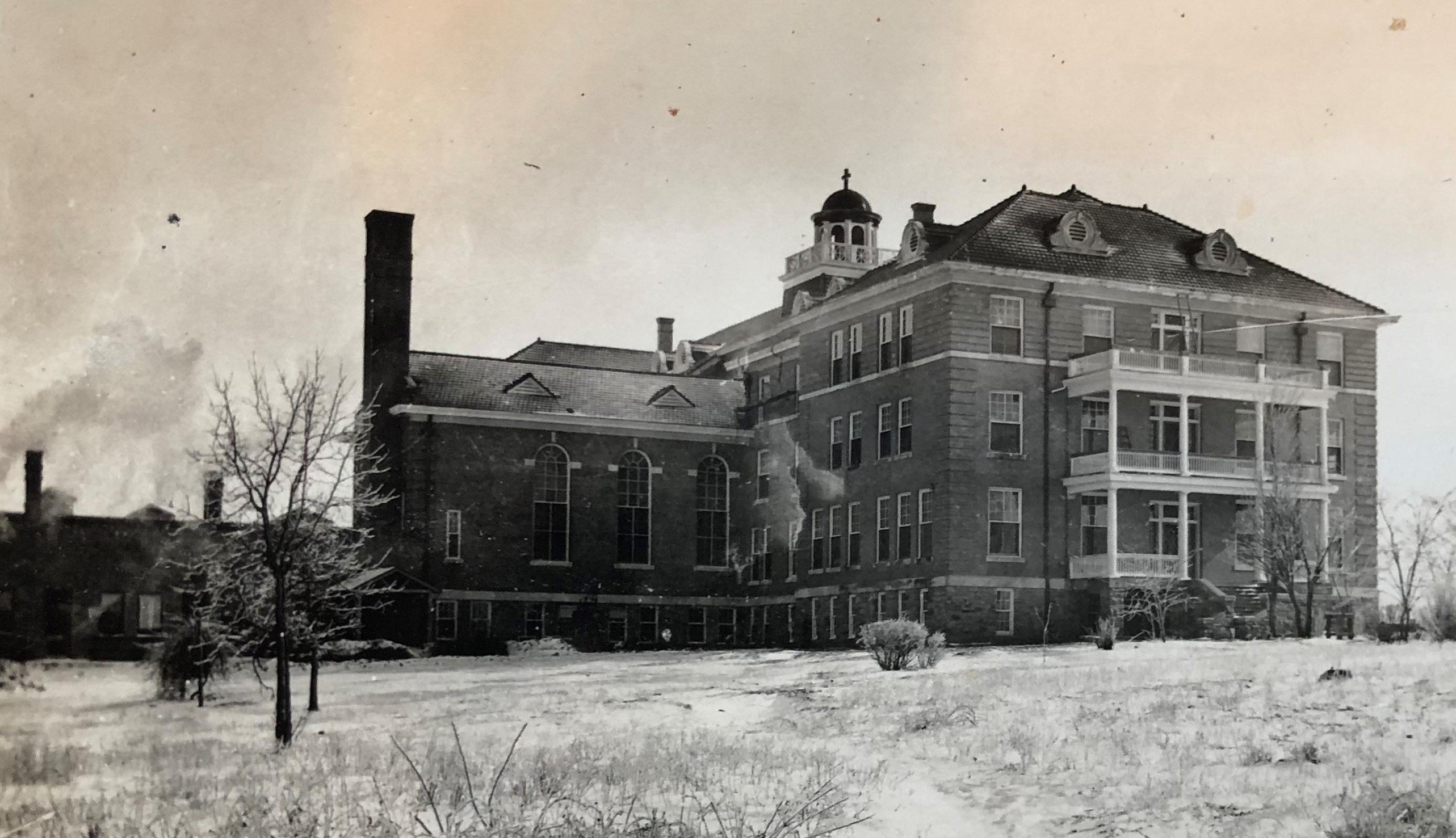 By Katie Zakrzewski
By Katie Zakrzewski
Throughout the years, the origins surrounding a certain old building overlooking the Little Rock metro have largely faded into the halls of history. But for many, St. Joseph’s Orphanage marked a change in social norms and American culture throughout the 20th and 21st centuries.
On July 1, 1907, Bishop John Baptist Morris of the Catholic Diocese of Little Rock purchased a 720-acre farm 4 miles to the north of what is now known as North Little Rock. He then contracted prominent Arkansas architect Charles L. Thompson to prepare the blueprints for an orphanage.


Morris approved the usage of $80,000 in diocesean funds to build the orphanage after receiving the blueprints from Thompson. The final product was a 56,000-square-foot brick-and-stone building with 80 rooms, an attic and a basement. The building also housed a chapel, classrooms, dining rooms, a bakery, a laundry area and a kitchen. Atop the roof of the Italian-style villa was a dome adorned with a white cross. The building’s construction was completed in April 1910.
Orphanages were first established in the United States in the early 1700s to care for children orphaned as a result of armed conflicts and disease as New World settlers embraced their Manifest Destiny. The popularity of orphanages grew in the early 1800s with the influx of immigrants to the United States, growing urbanization, wars, health epidemic and poor economic conditions.
Orphanages were largely viewed as improvements from their colonial ancestors; during colonial settlement, children were often housed with adult criminals and deviants, rendering them even more vulnerable than before. Further, orphanages were largely viewed as an anchor of stability in times of economic and social upheaval, ensuring that even the most vulnerable and unfortunate in society were provided with food, shelter and an education.
Morris put the Order of Benedictine Sisters of St. Scholastica Monastery in Fort Smith in charge of overseeing St. Joseph’s Orphanage. Morris offered the Sisters free room and board before paying them $30 a month to care for the orphanage, an amount
The Order of Benedictine Sisters of St. Scholastica Monastery in Fort Smith was placed in charge of overseeing St. Joseph’s.
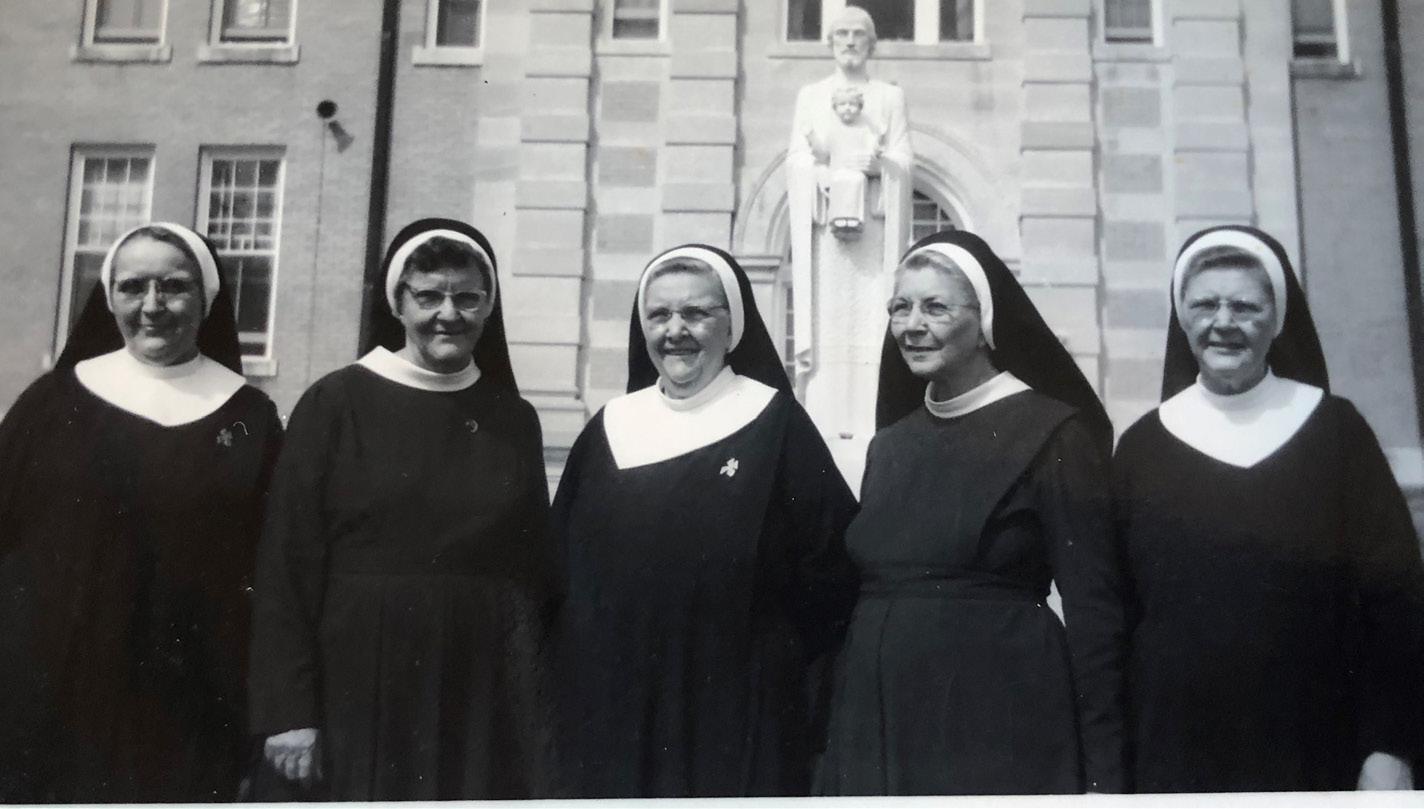
that increased annually. When the doors first opened in 1910, 66 children moved in to occupy the three stories of St. Joseph’s. This number grew to 300 in 1914.
During World War 1, St. Joseph’s neighbor, Camp Pike (now known as Camp Joseph T. Robinson), was expanding facilities to house soldiers by the tens of thousands,
leasing the orphanage building and surrounding acres for three years as living quarters for soldiers and their families. For that three-year period, St. Joseph’s orphanage and school were relocated to Little Rock.
After the war, St. Joseph’s was returned to the Catholic Diocese of Little Rock and continued operations. Sisters and volunteers spent years tending to an expansive farm, rose garden, fruit orchard, cow pastures and hog pens.

Arkansas author John W. Findley recalled memories of growing up at St. Joseph’s Orphanage in his memoir, Bitter Weeds, Peanut Butter & Jelly Sandwiches, shortly before his death in 2007. Findley explained that in 1927 when he was a year old, his mother passed away. His father, a business owner unable to care for Findley and his three siblings, brought the children to the orphanage, where they lived in gender-segregated wings. Findley remained at the orphanage until he was 15, when he left and joined the Army. Findley returned to the orphanage after the war, describing the return in his memoir.
“Upon my discharge, I went back to St. Joseph’s to visit Sister Michael, where she told me there was no market for machine gunners. So, I took advantage of the G.I. Bill of Rights and went to school for industrial electricians,” Findley wrote.
After graduating and starting his own family, Findley returned to the orphanage decades later to begin writing his memoir. Sister Vivian Luyet, one of the last sisters to live at the orphanage, gave Arkansas Catholic a glimpse into life at the orphanage and Findley’s youth in a 2010 interview.
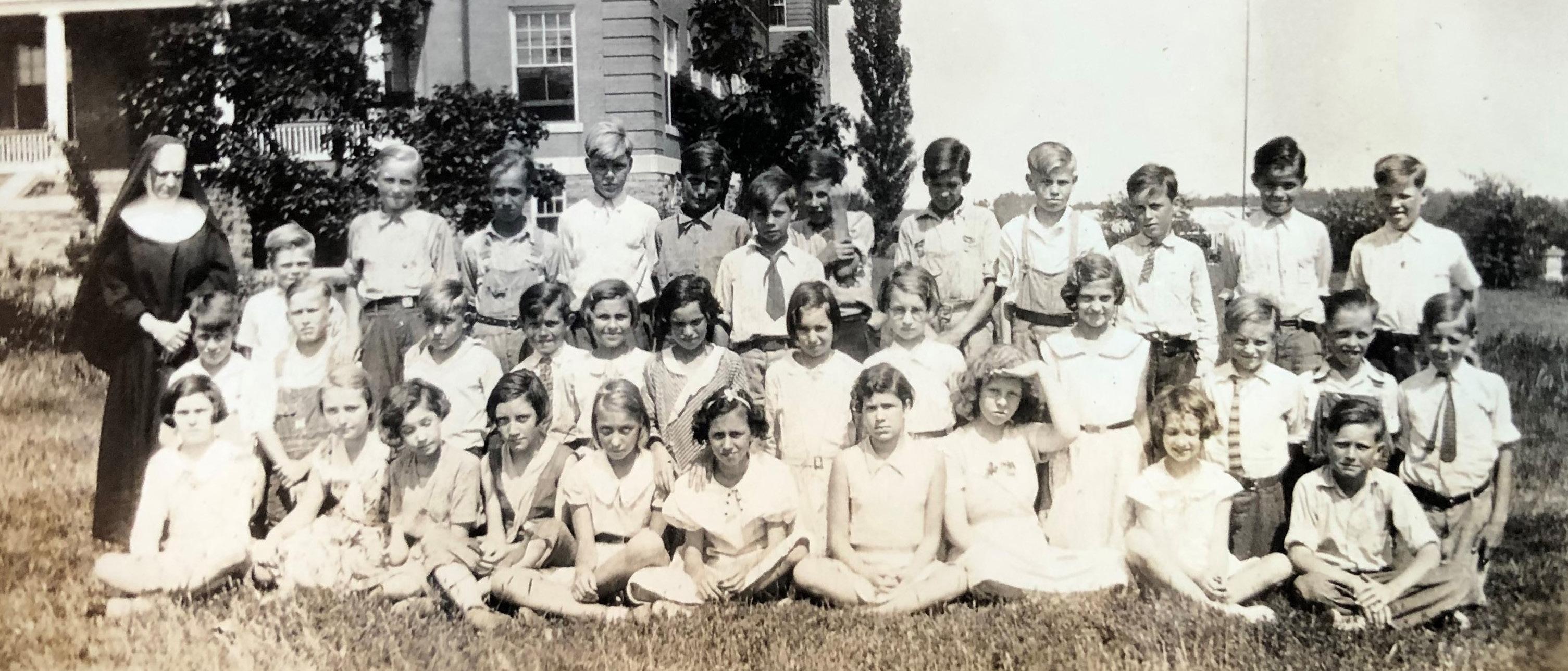
“Findley and his wife, Ruth, came to St. Joseph’s almost every year to take pictures. He was always disappointed when things had changed. He dearly loved the nuns, and the nuns dearly loved him. We became good friends. He died in 2007, but Ruthie still writes me, Sister Rosalie and Sister Anne Michele all the time.”
With the number of orphanages, foster homes and transient children swelling in the mid-20th century, the United States Congress began to pass laws aimed at providing a safety net for the poor and vulnerable, for the sake of their children. Many eco-
nomic incentives and systems of federal support were put in place to help low-income families make ends meet instead of giving their children away.
As the need for orphanages dwindled, in 1978 St. Joseph’s moved away from operating as one. Instead, St. Joseph’s operated as a daycare and kindergarten for local children until 1997, when many of the Benedictine Sisters began to return home to Fort Smith to serve a growing population there. Two Sisters remained at St. Joseph’s until late 2007.
The Catholic Diocese of Little Rock continued to use the building as a retreat center for religious events before signing a 50-year lease with the nonprofit St. Joseph Center of Arkansas in 2010, with the latter in charge of preserving the structure and studying possible uses for it.
The Historic Preservation Alliance of Arkansas listed the property as an endangered historic structure in 2013. Later that year, St. Joseph Center of Arkansas announced plans to use the building and surrounding acres for agricultural, arts and education programs.

Today, Arkansans can find all sorts of educational and community-building events at St. Joseph’s, including farmers’ markets
and farm stands, classes on canning and preserving, naturalist camps, animal programs, gardening events, fruit and vegetable harvesting, tours of the property and even yoga alongside goats.
Once created as a home for vulnerable children, St. Joseph’s Center of Arkansas continues to provide a community for Arkansans hoping to learn from the world around them and live off the land. While the social landscape and culture surrounding the building’s origins have changed, one thing has not: many folks can still call St. Joseph’s home.
Orphanages were first established in the United States in the early 1700s to care for children orphaned as a result of armed conflicts and disease.The old orphanage is finding new life as a community gathering place.
Some three years out, it’s safe now to reference Wuhan as ground zero for the COVID-19 outbreak … right? Even those among us who still mask up to drive, and they’re out there, must acknowledge the Chinese role. Not that of the Chinese people, of course. They’re victims, and not just of being on the frontline of the early outbreak. But of the Communist Chinese government, that whimsical boys’ club that’s redefining “Red Scare.”
Why am I writing about COVID and Wuhan? Turns out, a prominent Chinese scientist who began work on a vaccine and worked at Wuhan died in May 2020 after “falling” to his death from the roof of the Wuhan Institute of Virology, the UK’s Daily Mail uncovered and reported in June.
The story wasn’t a hit with most American media outlets, but it did give National Review’s Jim Geraghty an opportunity to write this contender for Paragraph of the Year:
“Oh, I’m sure he was just checking out the view and leaned over too far. I would say that this Russian habit of important people falling out of windows must be contagious, but as we know, the Chinese government is habitually reluctant to label anything as contagious.”
It wasn’t that long ago when the mere mention of Wuhan or China in relation to the pandemic’s outbreak would’ve been received as racist and elicited awkward look-aways if not sneers. America’s pop-culture aristocracy remains loathe to criticize the oligarchic dictatorship that runs China, but baby steps and all.
Relations with Communist China are a delicate bal-
ancing act, of course, but shouldn’t both Americas — red/blue, coastal/flyover, Jersey Shore/Mayberry — be able to agree that the CCP is bad for one’s health? And credit where it’s due: President Biden recently referred to Xi Jinping as a dictator.
The U.S. Senate’s full report into the pandemic’s outbreak, released in April, acknowledged the involvement of the Wuhan scientist in question — People’s Liberation Army (PLA) Professor Zhou Yusen — and the mysterious circumstances regarding his death. A death never officially acknowledged by the CCP, by the way.

As Geraghty notes, “dead men tell no tales.” It seems probable that Professor Yusen knew some secrets about COVID and how it started, secrets the Red Chinese weren’t about to risk exposing.
But even if responsibility for the outbreak were to be pinned on the Chinese government, unequivocally and officially, why would Bejing fear any backlash? What’s a little cover-up compared to genocide, after all? For the CCP, there’s no moral high ground here to lose.
Besides, shoe sales show no signs of slowing down anytime soon.





The University of Arkansas at Pine Bluff (UAPB) continues to offer degree programs that catapult students forward! Earning your MBA can earn you a whole lot more! Grow your income potential by at least $27k a year with a degree in one of three specialty areas: Business Analytics, Hospitality Management, and Casino and Gaming Management. Flexible courses, affordable tuition, and you can earn your degree in as little as 18 months! Start your path to exciting and rewarding career opportunities today.
Scan to learn more!
A Growing Health System for a Growing Community







At Conway Regional, our team of talented orthopedic surgeons and specialists are dedicated to helping you regain mobility and recover from injury and disease. We are honored to have been voted "Best Sports Medicine Clinic” in the state by the readers of AY Magazine and “Most Admired Company” by readers of AMP for multiple years.



We’re not just growing we’re growing together.
